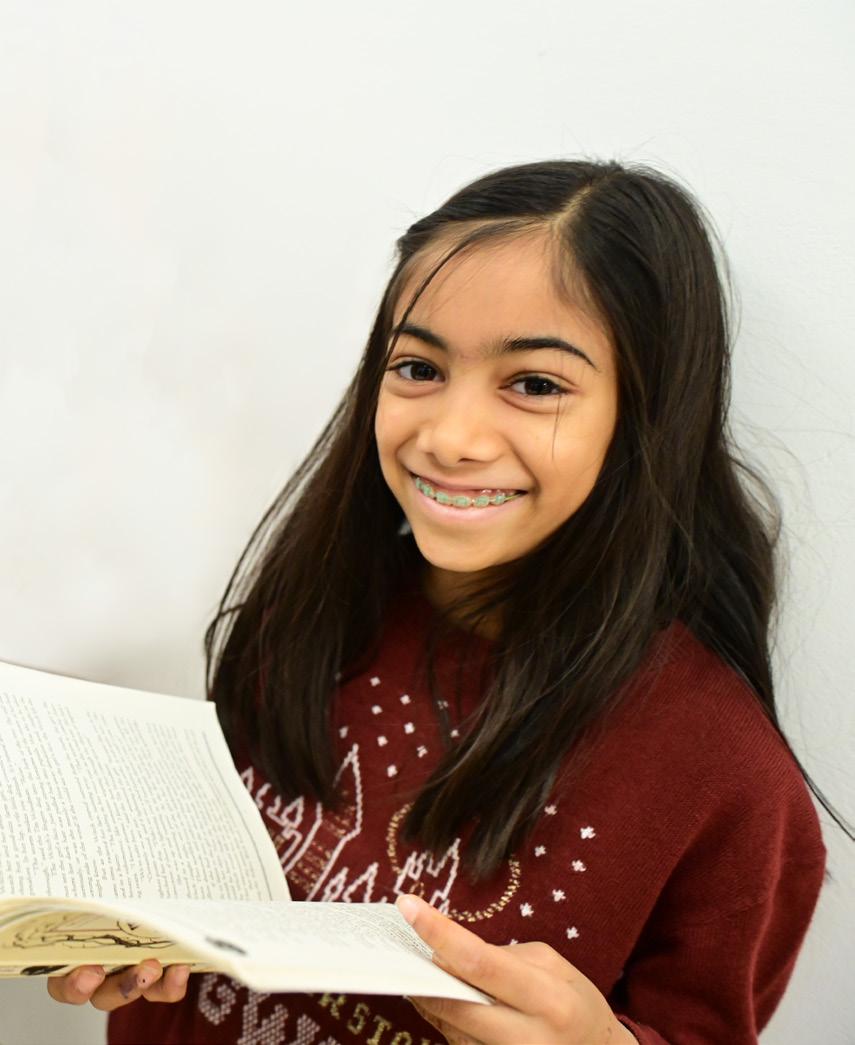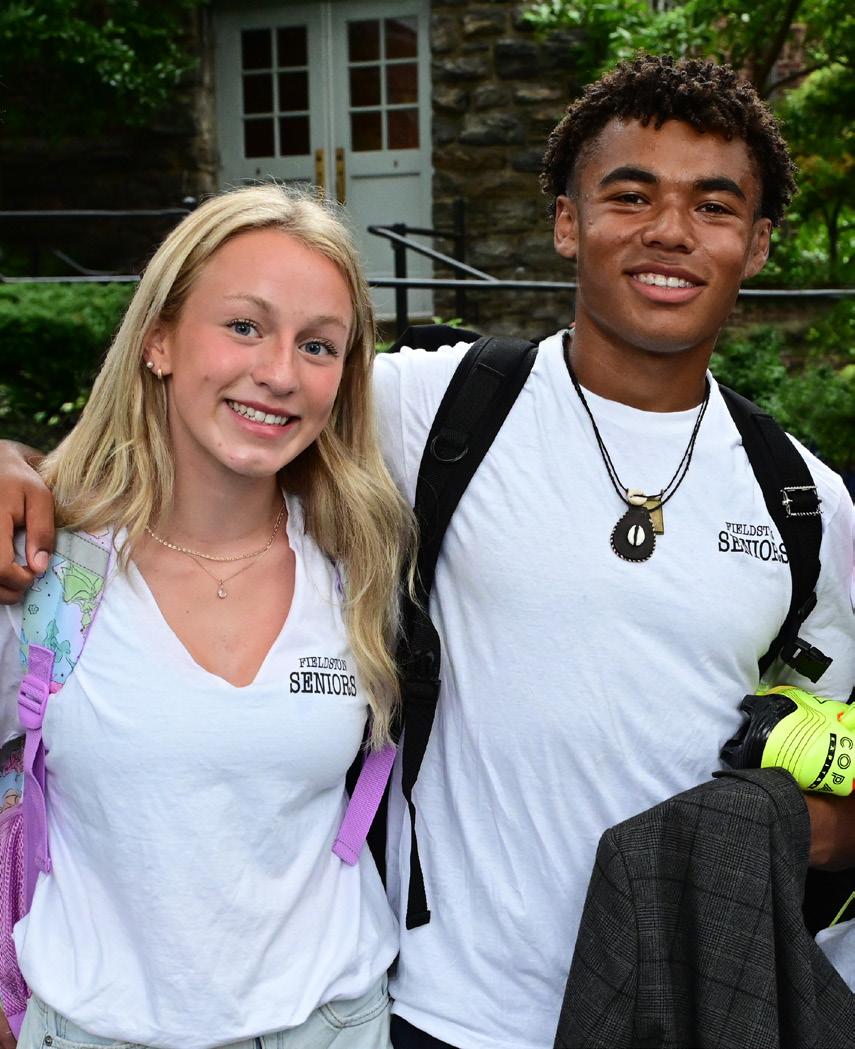ECFS Reporter
Ethical Culture Fieldston School Magazine
2023–2024 Academic Year

Cover Story

Ethical Culture Fieldston School Magazine
2023–2024 Academic Year

Cover Story
ECFS prepares our students to be serious lifelong learners Feature Community Building in the Classroom and Beyond Eagle Updates And more!

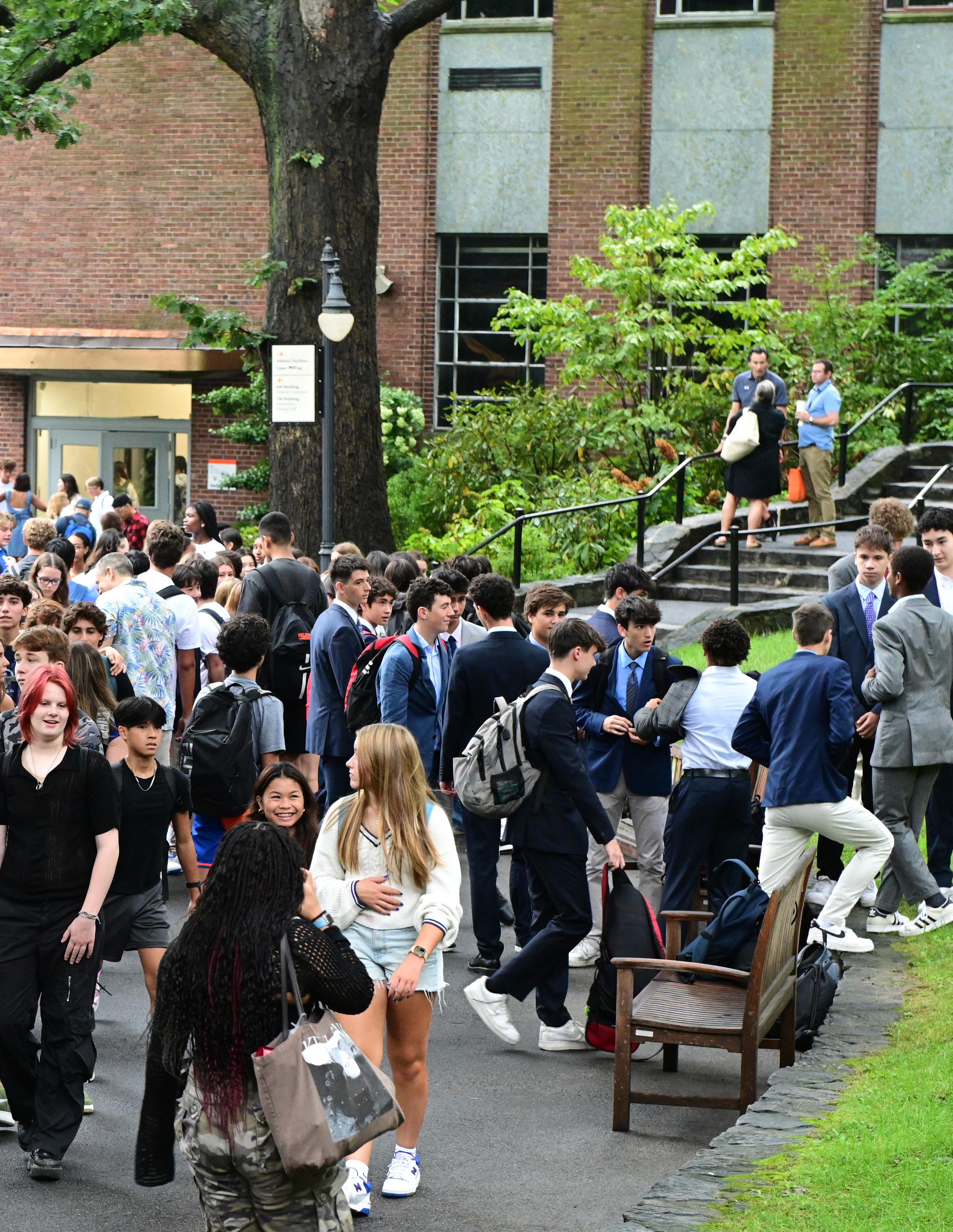
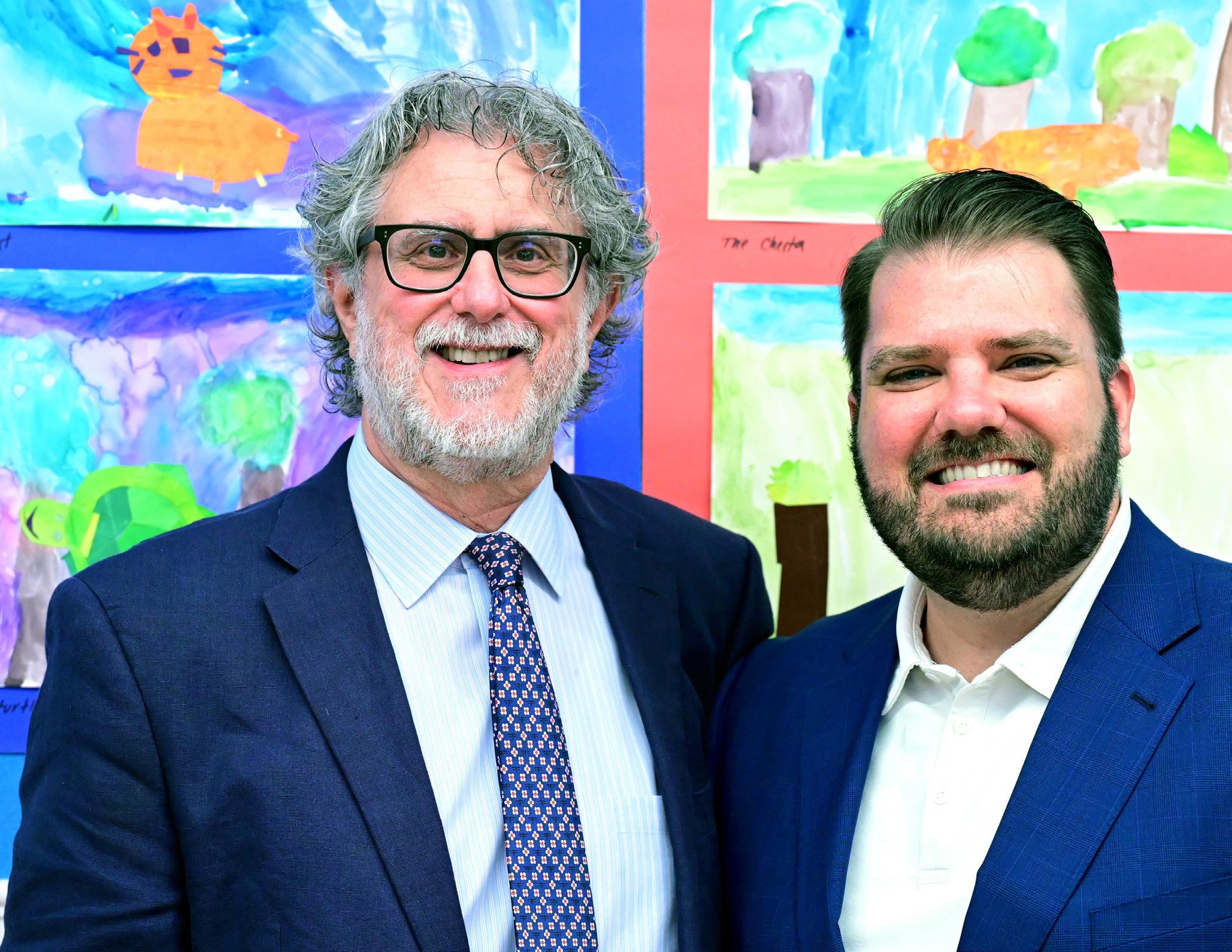
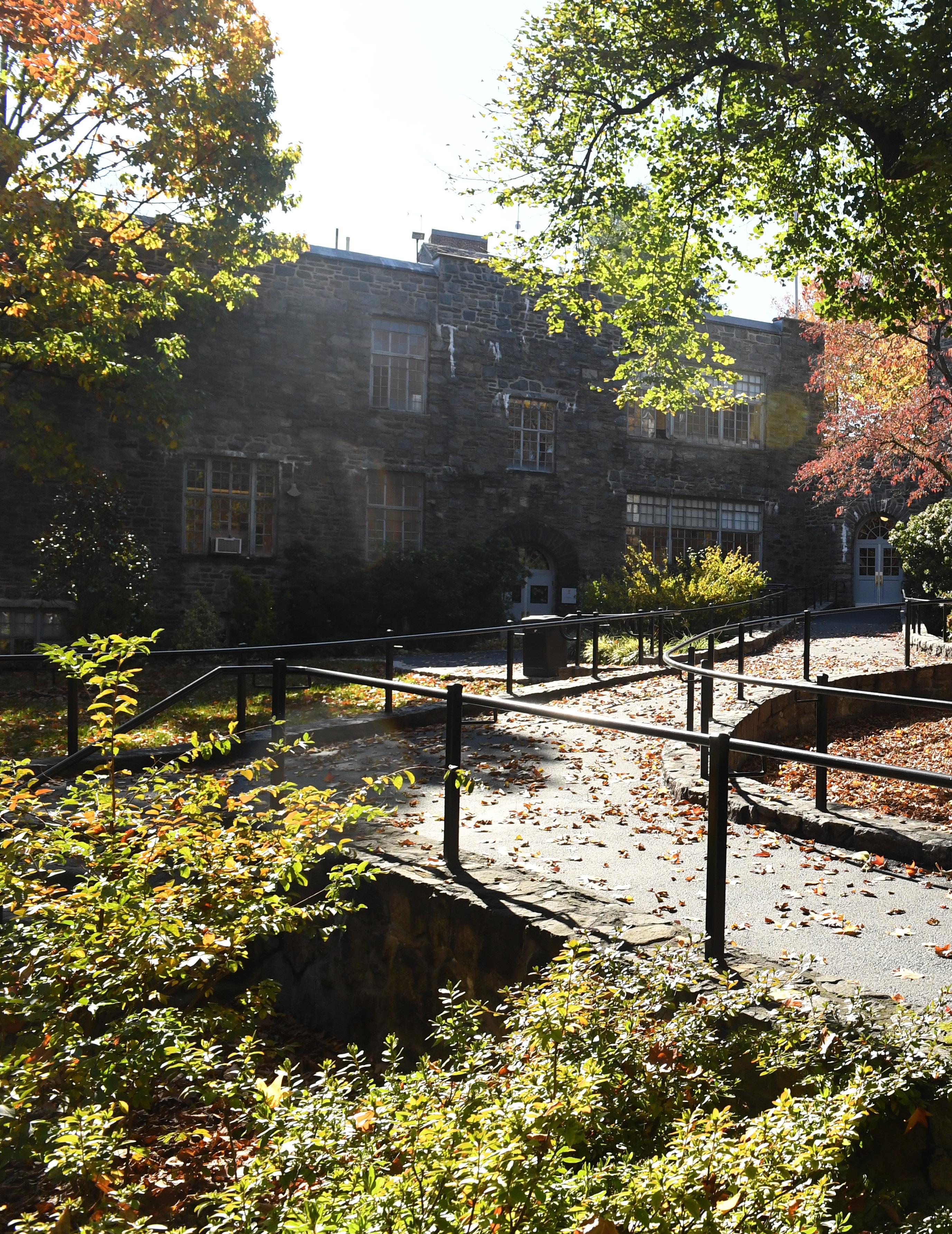

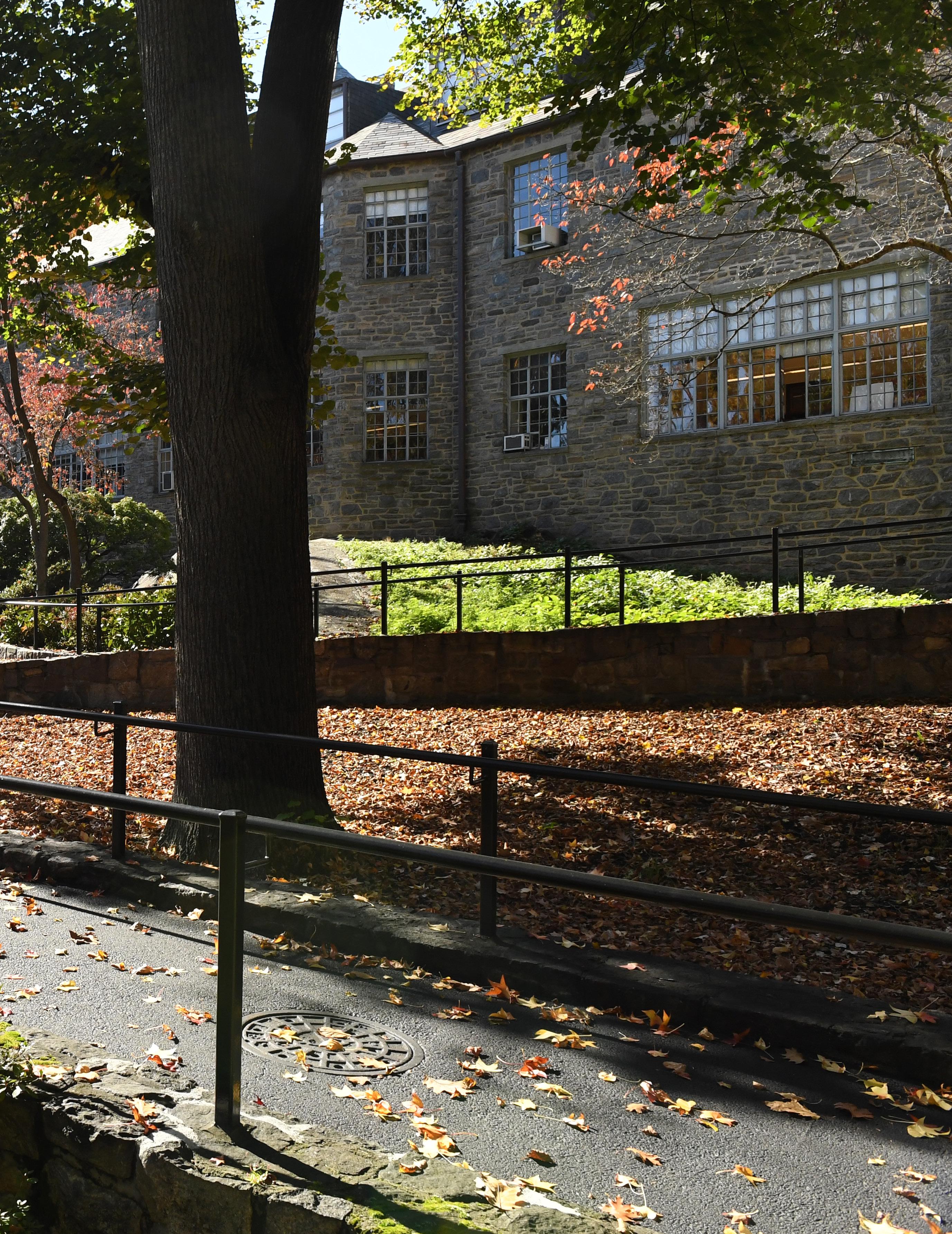
Dear ECFS community,
It is with great pleasure that we share with you this year’s edition of the ECFS Reporter magazine — filled with stories, reflections, and explorations of what it means to learn and grow at our remarkable School. We are constantly reminded of the extraordinary creativity and determination of our students. Time and time again, they have demonstrated that when faced with challenges, they will not only persevere but thrive. Their unflagging pursuit of academic and personal success spans all areas of learning and development, and it is strengthened by our inspiring faculty and staff who are committed to developing inquisitive, confident lifelong learners.
We strongly believe that what sets our students apart is their profound understanding of what it means to pursue and acquire knowledge. Reaching far beyond the accumulation of facts and figures, they possess a deep-rooted sagacity that will enable them to deftly navigate the complexities of the world as they go forth into careers and lifetimes of leadership and aim to make the world a better place. They are not just knowledgeable; they are adept at applying their knowledge in impactful ways, and their ability to advocate for themselves and others distinguishes them as leaders in their own right.
Our students and the faculty who work alongside them to encourage and promote these goals truly embody the ethos of our School. Within the pages of this magazine, you will see how our holistic approach to education delves deep into academic study without being limited by the walls of a classroom. We spoke to faculty and staff to learn more about how they approach teaching and what projects they use to build community, connected with students to hear firsthand what it means to learn at ECFS, and invited alumni to share how the School has shaped their lives and fueled their accomplishments. While it’s impossible to capture in one publication all the splendor of ECFS or the breadth of opportunities our students have to flourish, this collection of stories provides a dynamic view of what life at school looks like today.
We hope you will find this magazine uplifting and inspiring. Enjoy!
With warm regards,
Joe Algrant Head of School
Kyle Wilkie-Glass P’37 Chief Executive Officer
Our educational pedagogy emphasizes collaborative learning with the objective of helping students build empathy and the capacity to respect their surroundings and better understand the perspectives of others. We asked faculty from across all four divisions to share a bit about their favorite projects, units, and activities that foster community in their teaching spaces.
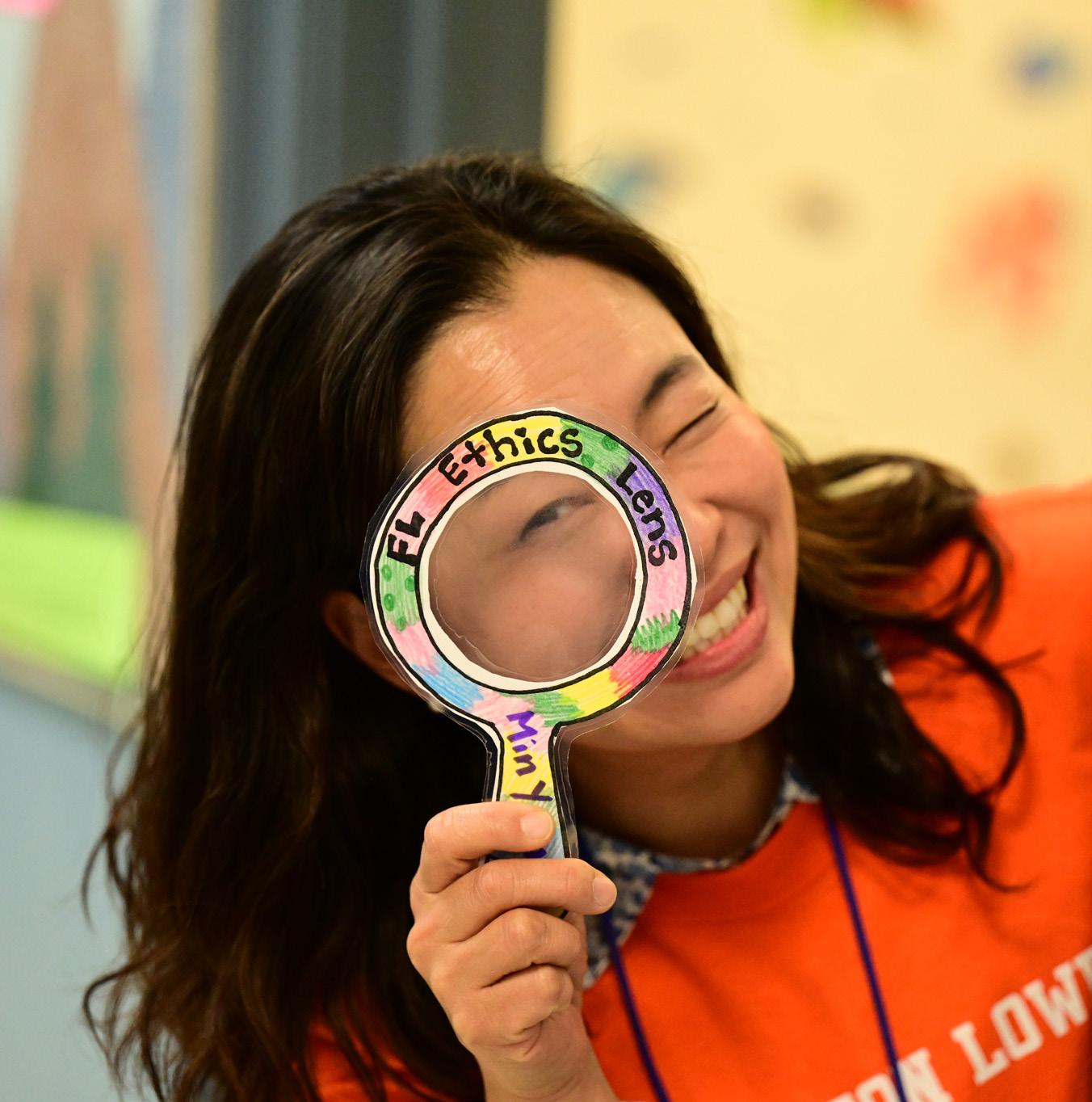
At the beginning of the year, we defined ethics and discussed how to explore the world through an “ethical lens.” This adventure intertwined with our collaboration with the 2nd Grade, where we explored the personal narratives behind each student’s name. Inspired by Juana Martinez-Neal’s “Alma and How She Got Her Name,” we created our own name stories, engaging parents/guardians to unravel the meanings woven into students’ names. Students joyously shared their name tales and transformed them into vibrant posters. In this journey of self-discovery and community building, students discovered that our names not only define us, but also connect us in profound ways and enrich our shared experience.
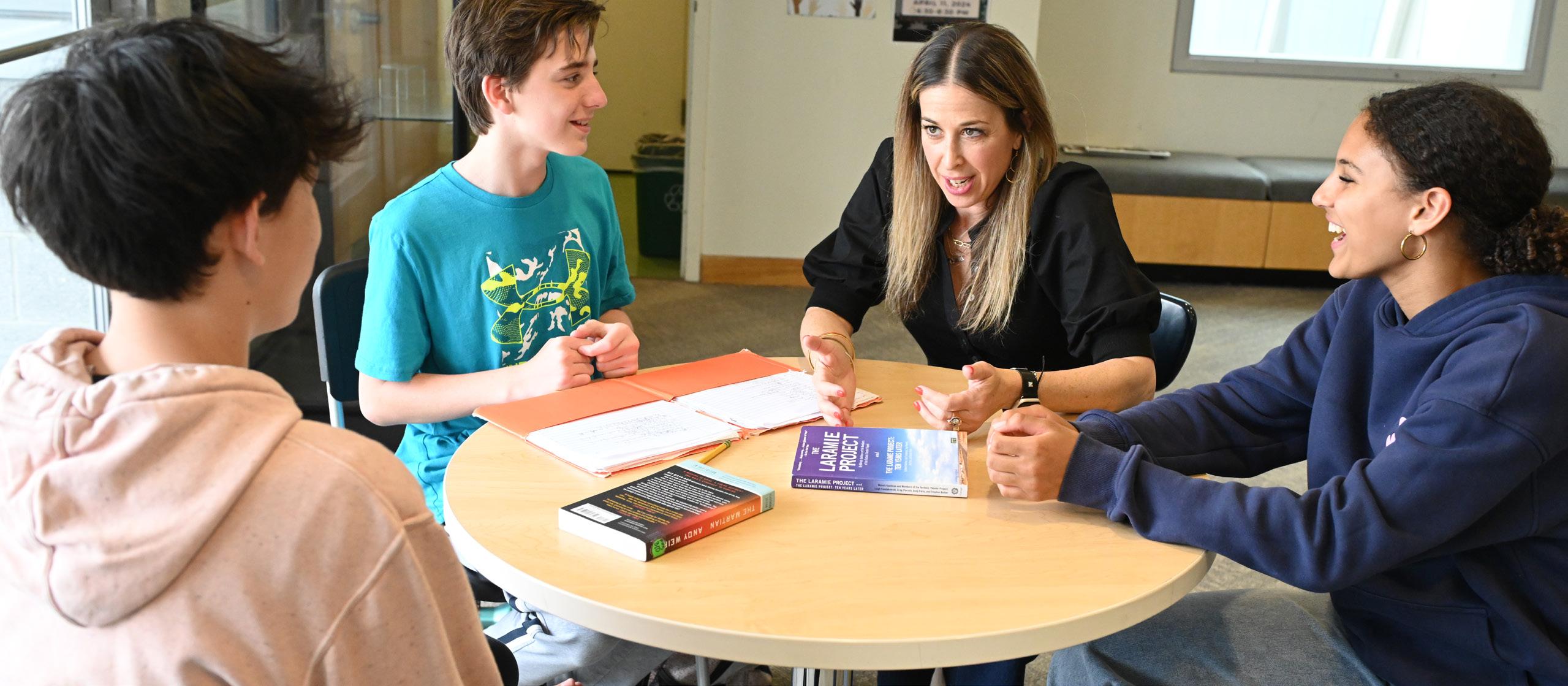
As students approach high school, they are challenged to look beyond their ECFS community and focus on how they can effect change on a wider scope. The 8th Grade Capstone Project asks each advisory to partner with organization members who are alumni and work with the organization to determine how the students can meaningfully contribute to their cause. This draws upon the many skills, capacities, and strategies that students have mastered in middle school.
After students collaborate to research their chosen organization, they create a short documentary film about what they’ve learned and how they will help. At the culmination of the project, alumni visit campus to learn more, and the students have a great time leading a campus tour! I love watching students get to know the alumni as they form relationships and make connections over shared experiences. The students’ excitement and enthusiasm as they engage with their organizations is amazing to see.
— Stephanie Behrens Grade Level Coordinator and Science Teacher, Fieldston Middle
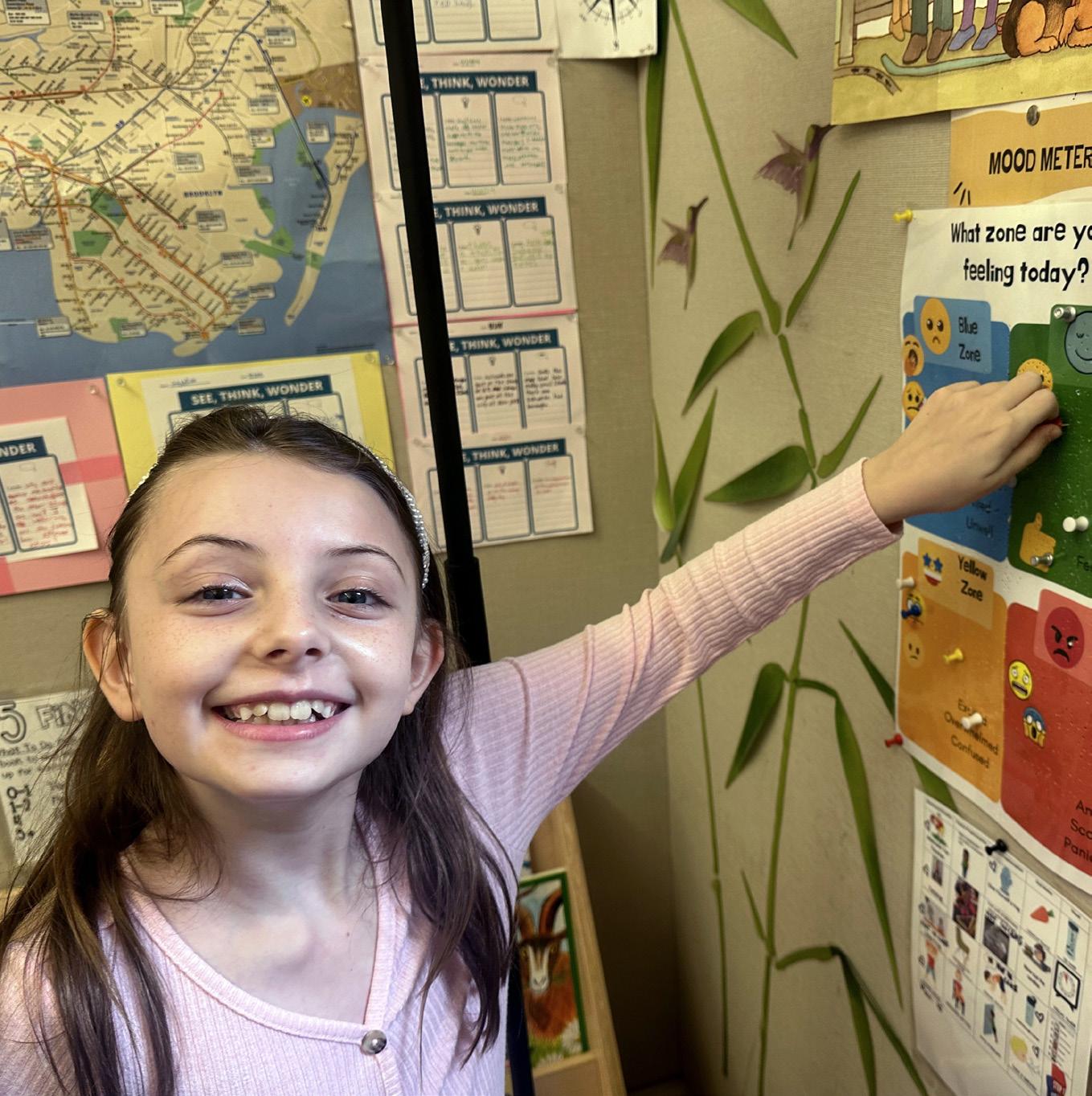
At the beginning of each year, my 2nd Grade class collaborates to define a set of classroom community norms, expectations, and routines. Each morning, we practice gratitude writing and place pushpins in one of the quadrants of our class mood meter. Then, in our morning meetings, students can share where they put their pins and why they put them there. Taking time every day to honor our community norms, be grateful, listen to each other, and share our joys and worries builds community in an authentic, deep, and natural way. Within weeks, the students are the stewards of this sacred morning time. They are brave, kind, and respectful as they bring their own unique experiences to our community, and the way they support their classmates and care for each other is magical.
Radhika Hira 2nd Grade Head Teacher, Ethical Culture
Playing music together is the embodiment of community-based learning. Students have to sync up perfectly with their peers, requiring a great deal of listening and nonverbal communication. At times, each member of the ensemble is playing a separate part, requiring careful listening to see how one person fits into the whole while simultaneously building independence and confidence. Sometimes a student leads by playing a melody that everyone knows. Other times a student is there for support and helps everyone stay grounded. These support roles can sometimes be easy parts technically, but they are important ones that the group needs to function, reminding us that community really is a living organism!
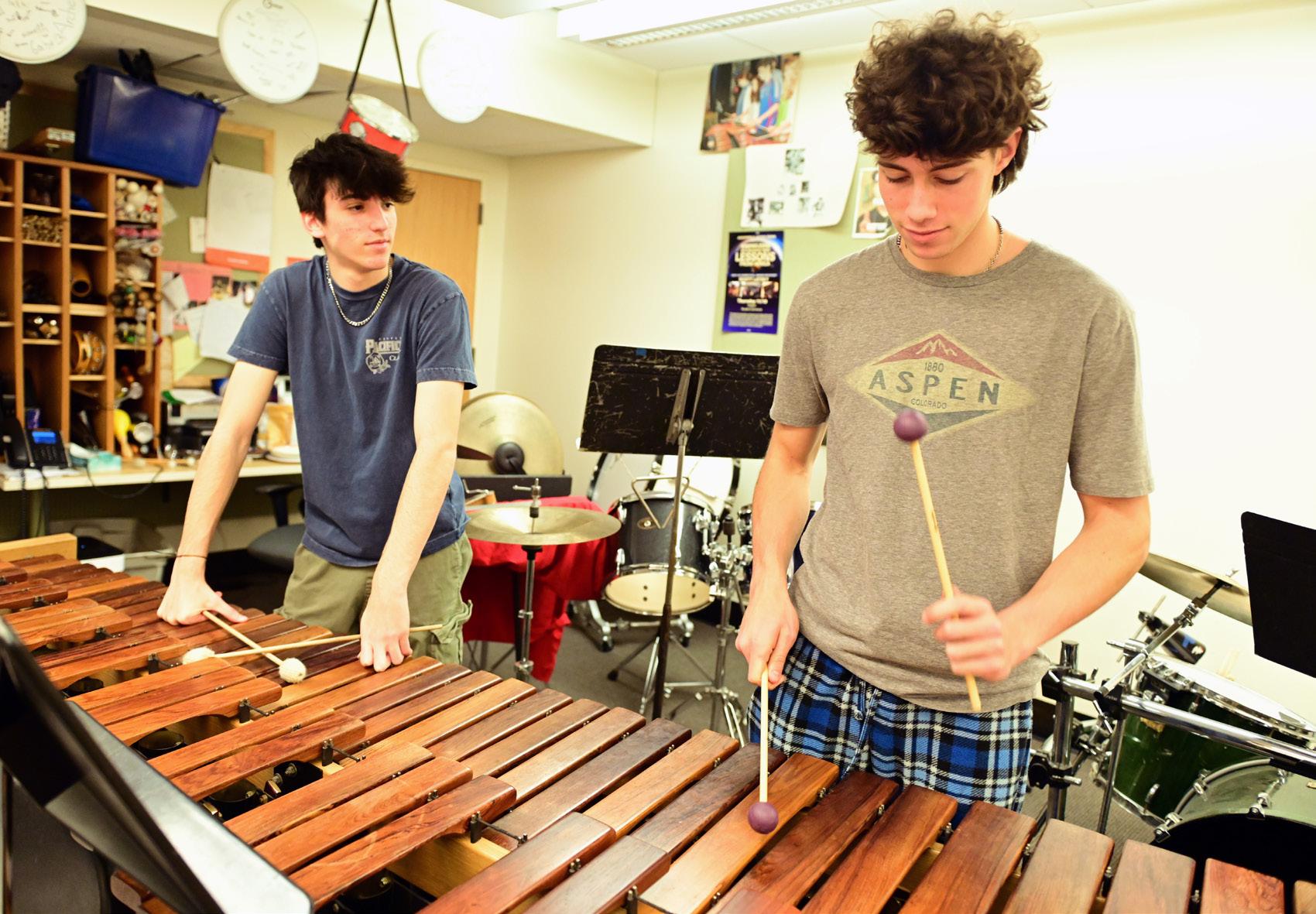
Creating music together takes these ideas to the next level. The current percussion classes are taking on a new challenge: composing a piece that they will then perform. Taking ownership of their work like this and having the agency to make important decisions about the outcome — there’s no better way to develop confidence in oneself and in the community.
— Scott Latzky Music Teacher, Fieldston Middle and Fieldston Upper
I firmly believe in the power of physical education when considering community building, and I strive to create an inclusive environment where every student feels they belong. The variety of games and activities at Field Day exemplifies our community spirit. In teams, students participate in various objective-based games with the assistance of the Ethical Culture faculty members who run each station. It is a joyous occasion that unites the entire community with laughter and fun.
Kelton Cumberbatch PE Teacher and Coordinator, Ethical Culture
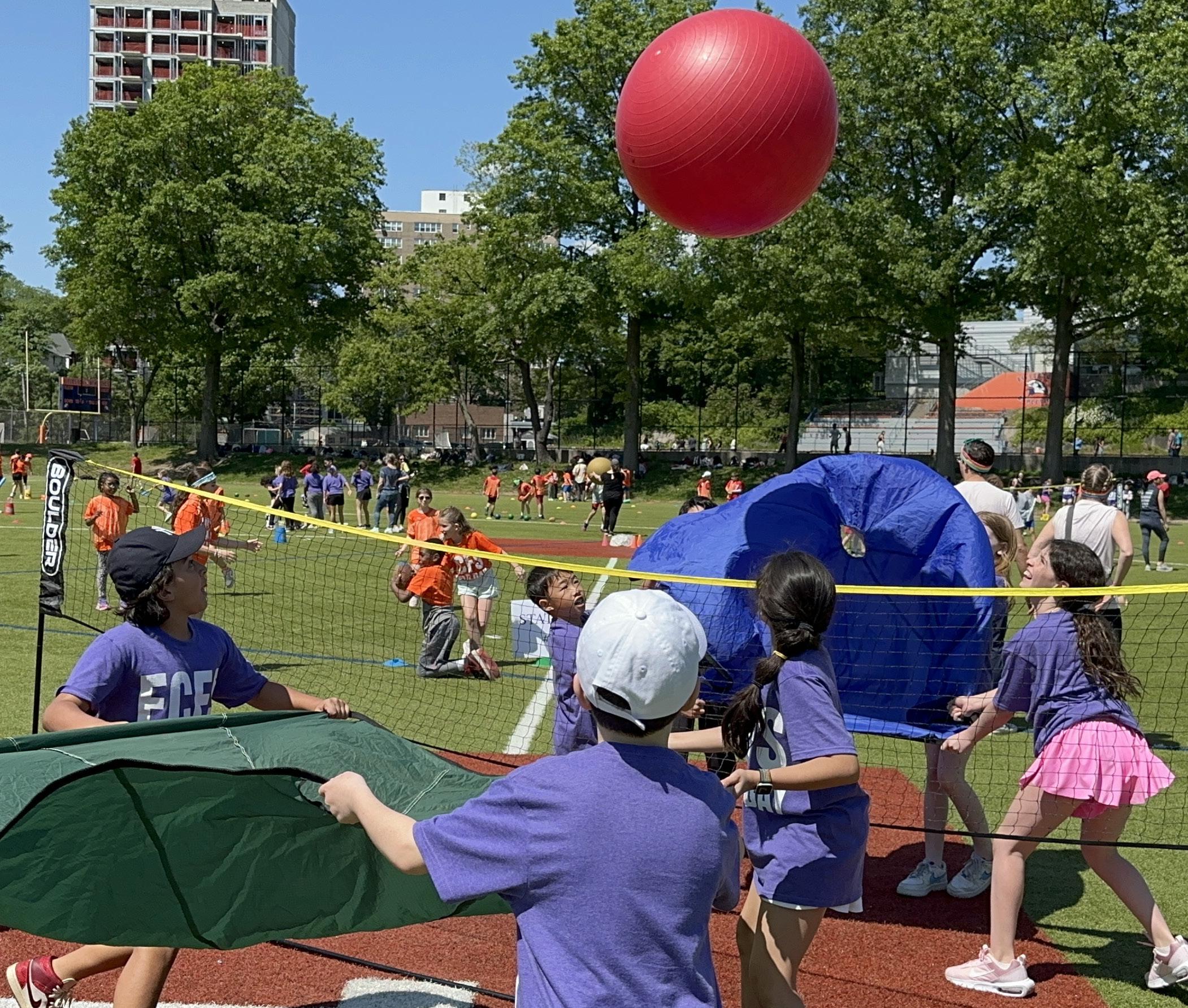
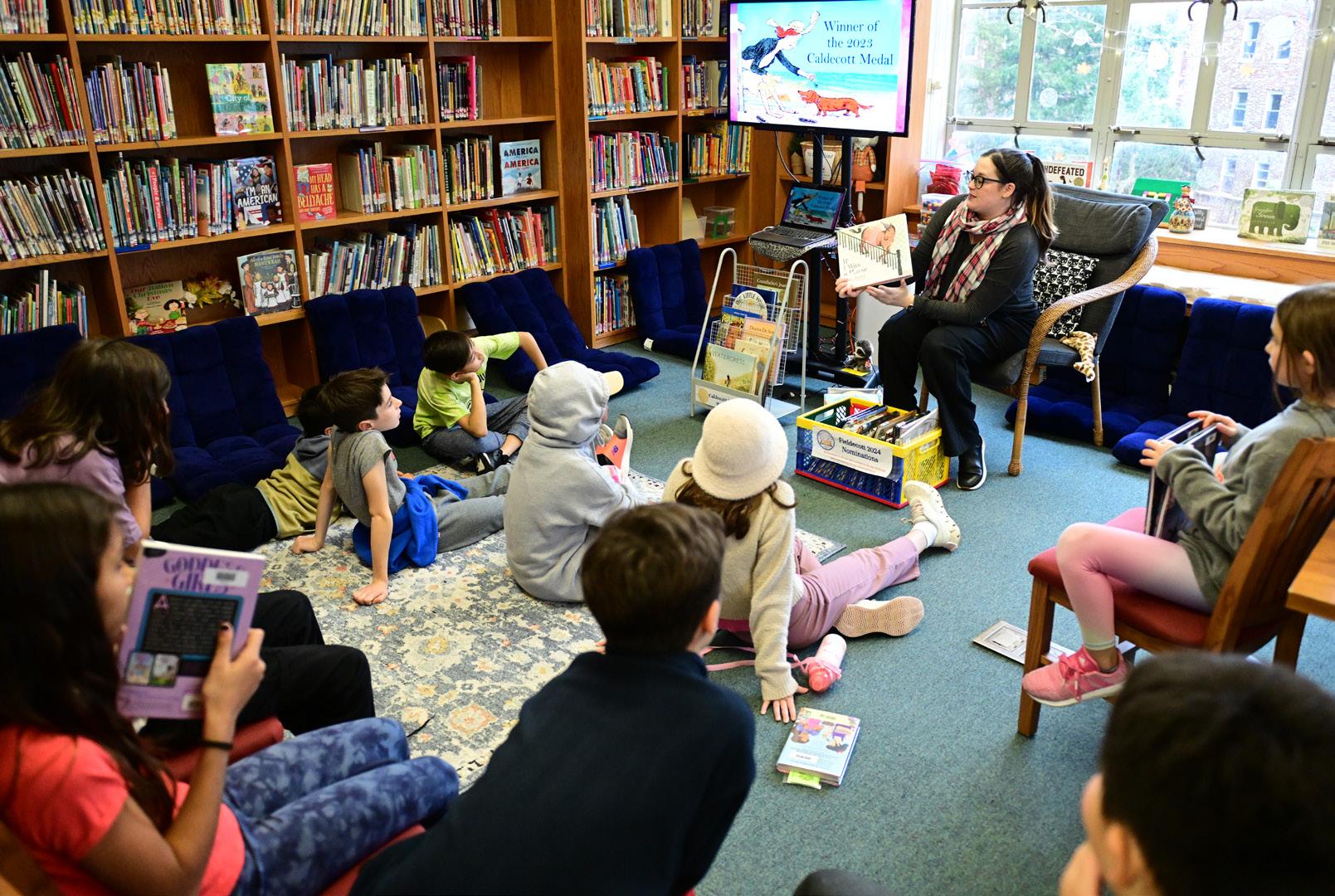
The Fieldecott is Fieldston Lower’s version of the prestigious Caldecott Award. Students in 3rd–5th Grade spend each January reading dozens of books; then they vote on their favorite book of the year. This year we started with a pool of 24 books, which got narrowed down every week until we had this year’s Fieldecott winner — “The Tree and River” by Aaron Becker, which beat Matthew Cordell’s “Evergreen” by only one vote! I have found students from different grades gathered around the Fieldecott hallway bulletin board, discussing and debating their favorites. I’ve even heard them chanting the titles of their favorite books during out time! Fieldston Lower is a truly extraordinary community, bound together by the love of a good story.
Group projects and labs that require students to work together over several days offer excellent opportunities to build community in Fieldston Middle’s science classrooms. This year, students conducted a long-term lab experiment in their 6th Grade Environmental Science class: growing basil plants and answering the question “What are the effects of an environmental issue on the growth of plants?” Teachers determined groups based on students’ interest in topics like the atmosphere’s influence on plants; then students designed the experiment together based on their exploration of the environmental issue.
This fosters community by giving students agency as they actively design experiments, assume responsibility for plant care and equipment usage, share the workload, and cultivate relationships with their group members that develop over time. Not to mention, they bond over the enjoyment of growing basil plants!
Ben Horner Science Department Chair, Fieldston Middle
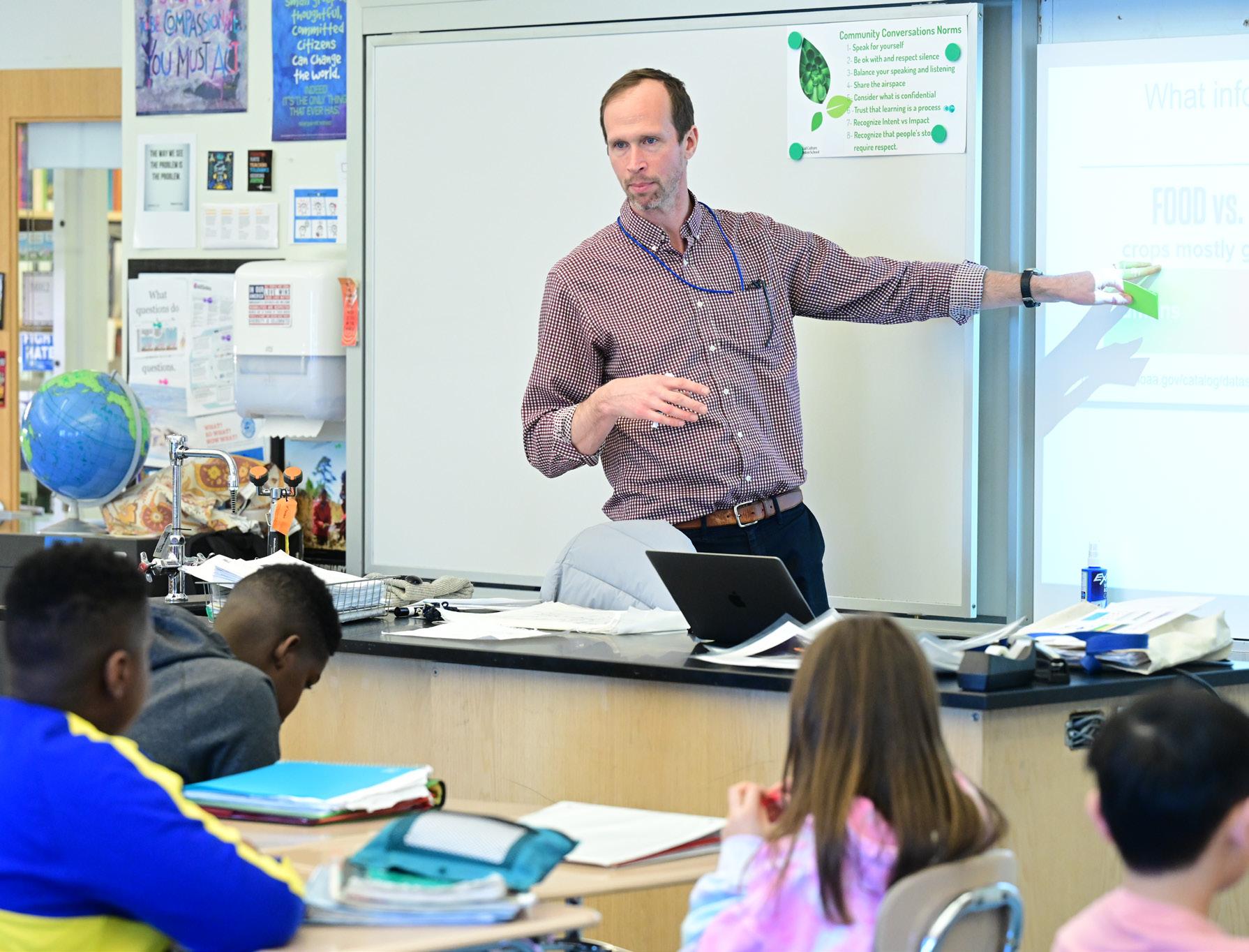
In 10th Grade Humanities, one of the projects requires students to present on a series of Supreme Court cases in which the court failed to uphold the rights of vulnerable populations and/or failed to uphold the individual rights of citizens guaranteed by the Constitution. We analyze Erwin Chemerinsky’s “The Case Against the Supreme Court,” which focuses on the Court’s challenges safeguarding minority rights in a democratic system where voting expresses majority rights. Students then work in groups to redesign the Supreme Court to avoid the flaws of the current judicial system, create a system that genuinely represents and is accountable to the people, and reflects the country’s evolving ethos. Students are encouraged to consider how SCOTUS decisions impact their generation. After each group presents their redesign as a constitutional amendment, the class holds a caucus to combine the best aspects of each proposal into a final proposition that all 28 students can agree on.
Students learn to think critically about the historical roots of our country’s issues, encouraging them to understand why things are the way they are and why it’s essential to work toward and fight for positive change. It helps them look at everything through an ethical lens, which is the driving force behind all our work as teachers at ECFS.

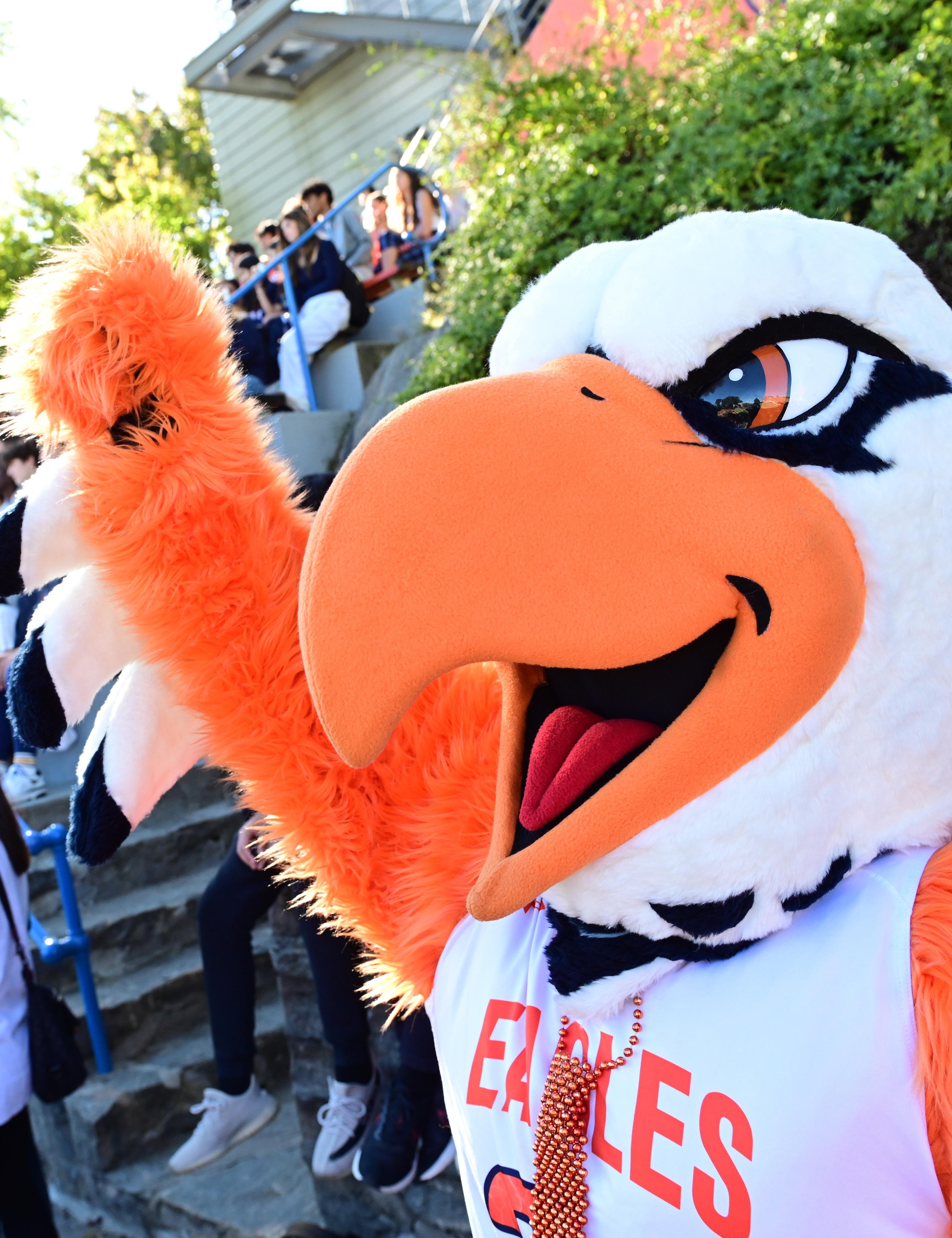
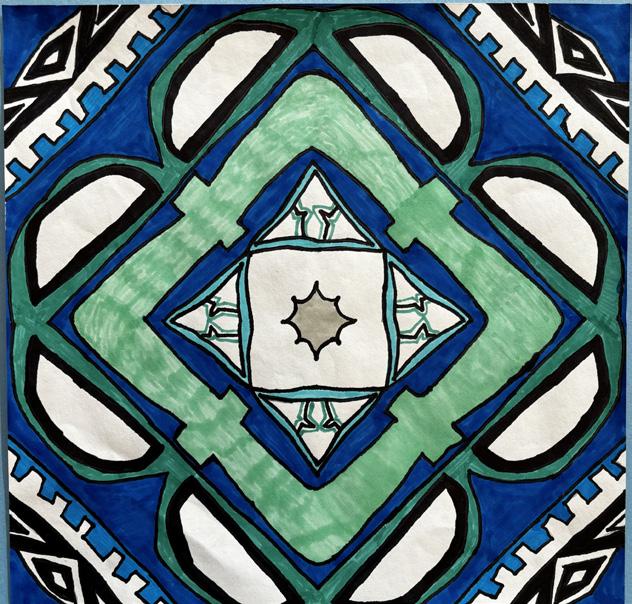

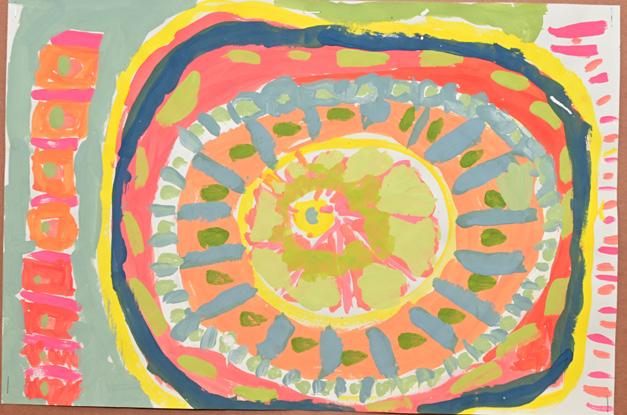
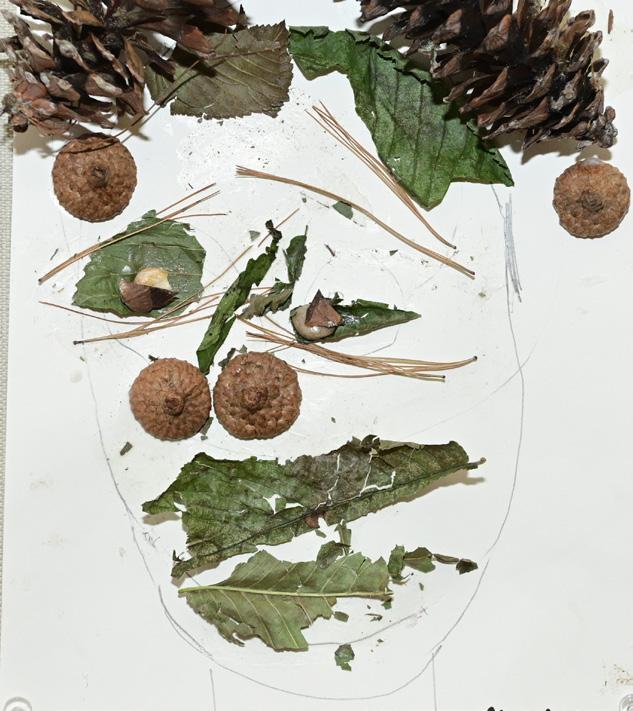

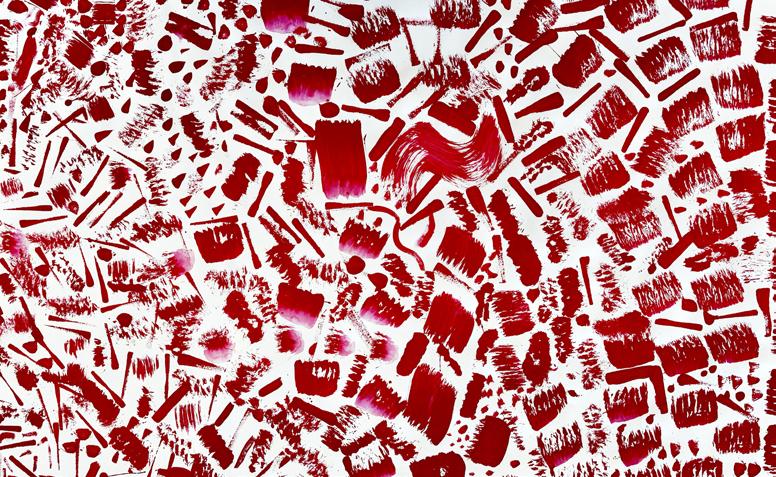
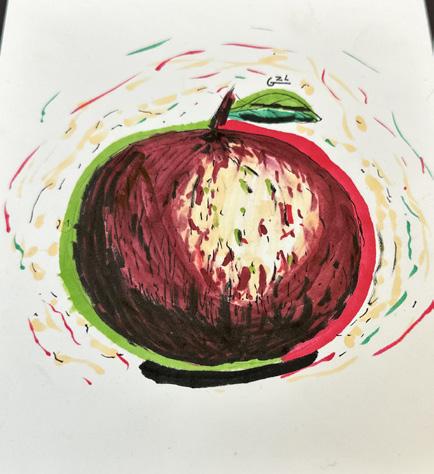
At ECFS, our robust arts education focuses on individual artistry, creativity, technical skill, and community building to give students the foundation for a sustainable, fulfilling artistic practice in their chosen art forms. From the earliest finger paintings in Pre-K to oil paintings and wire figures at Fieldston Upper, our students’ artistic practice is constantly evolving and the opportunities for creative expression are endless.

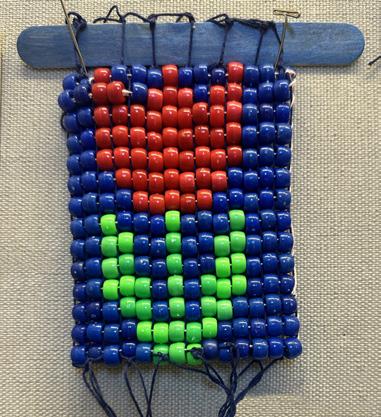
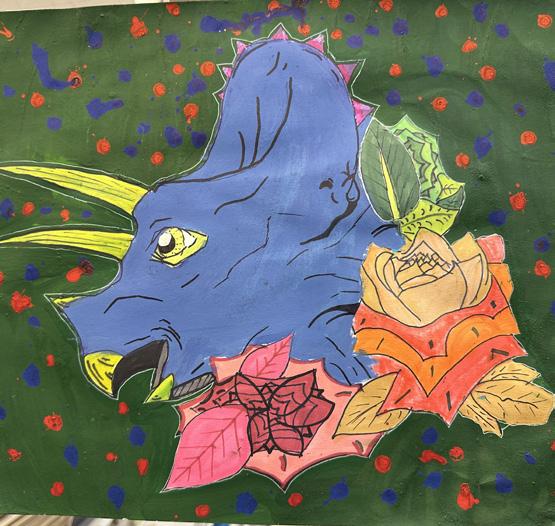
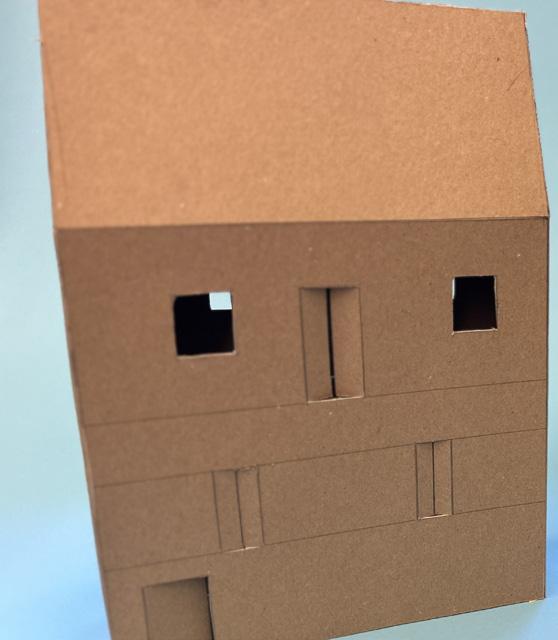

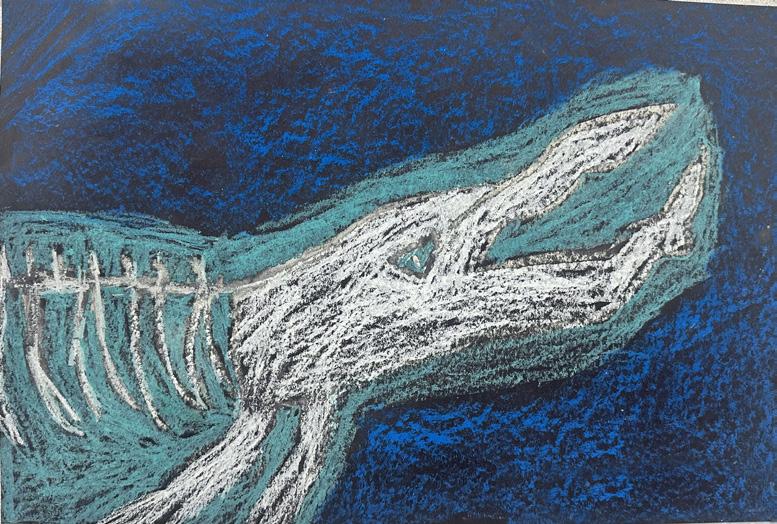
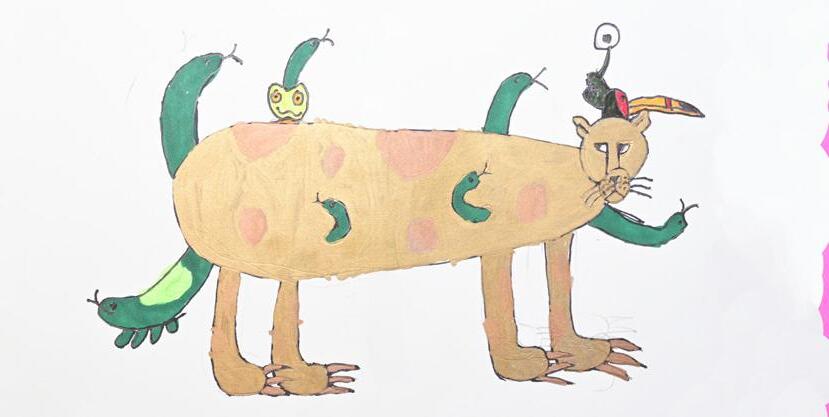

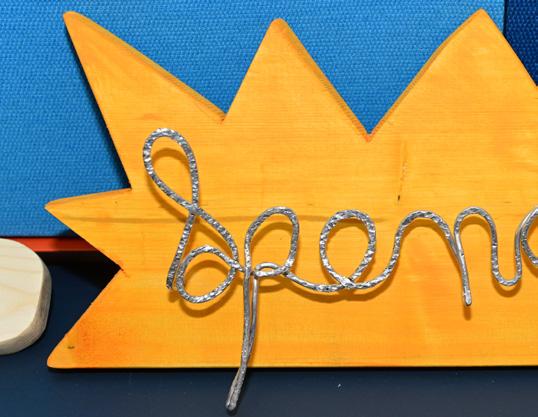
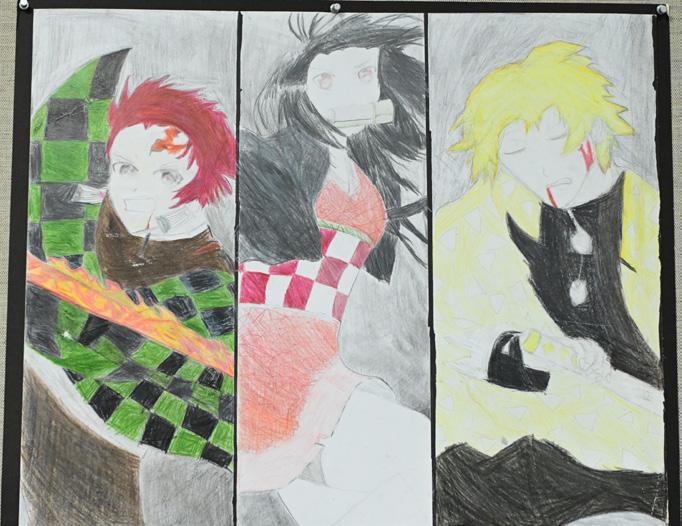
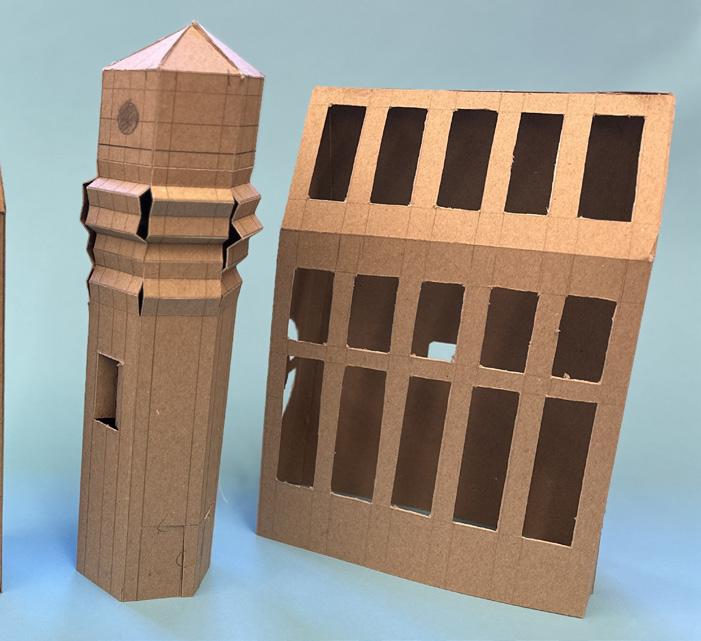
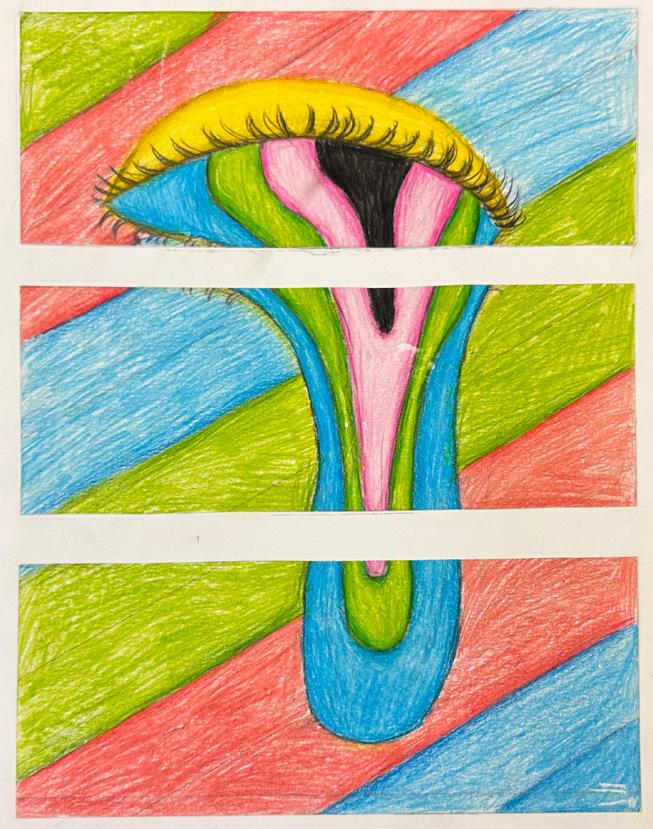
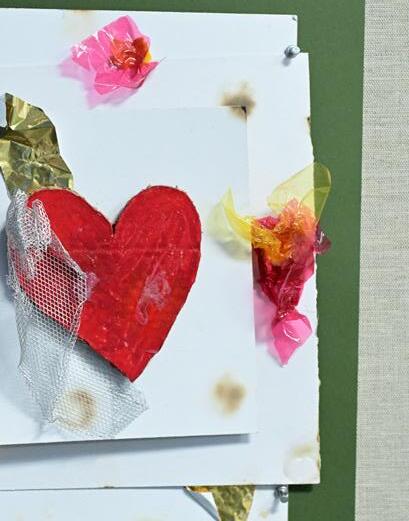
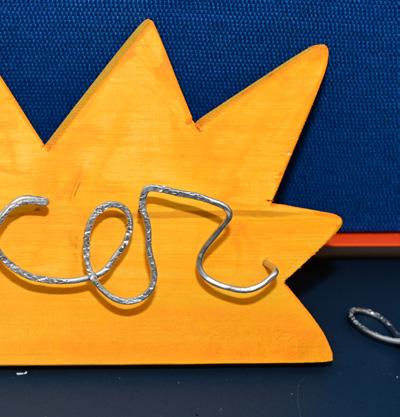

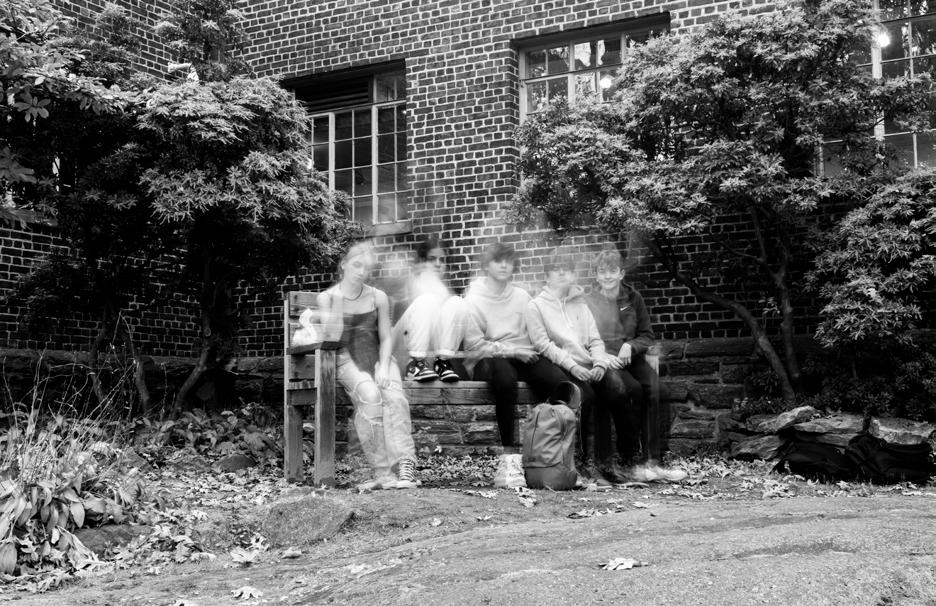

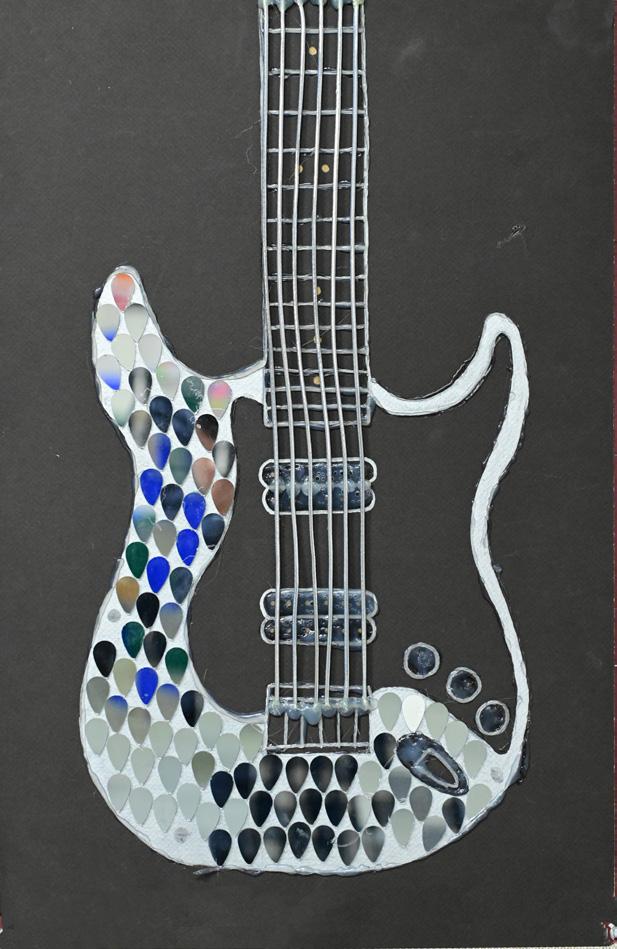
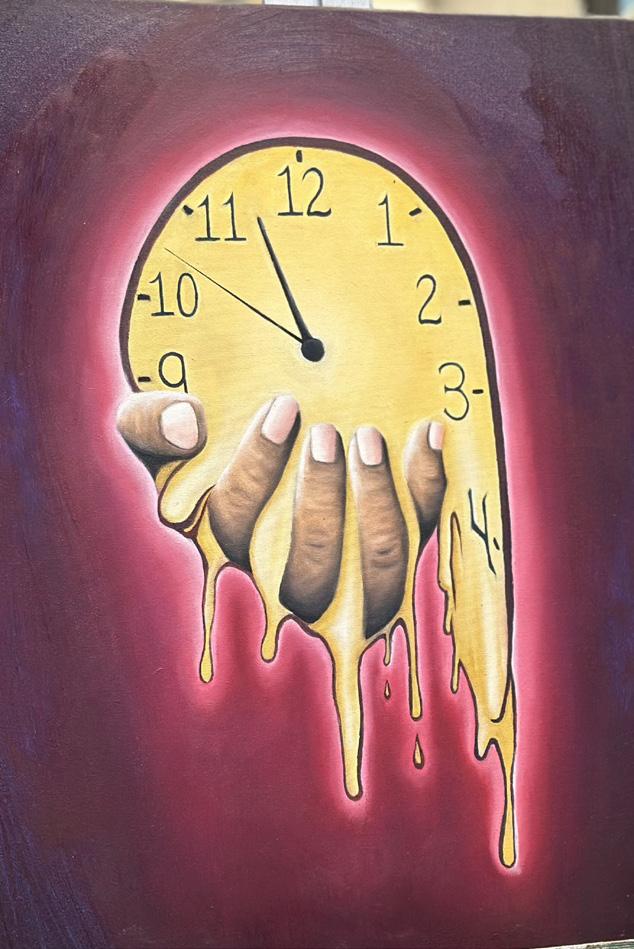
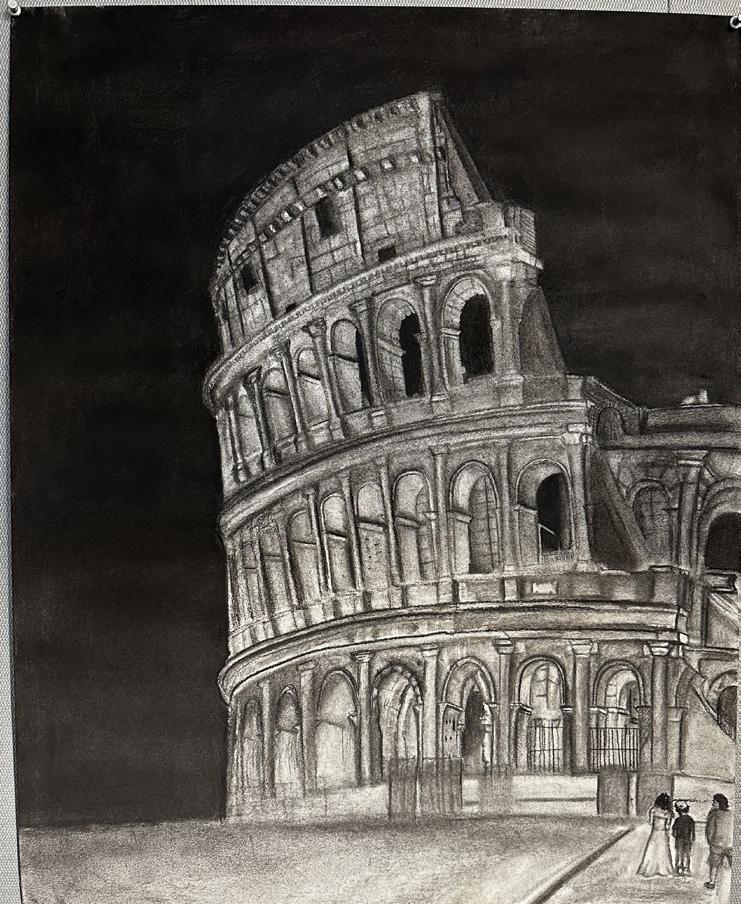
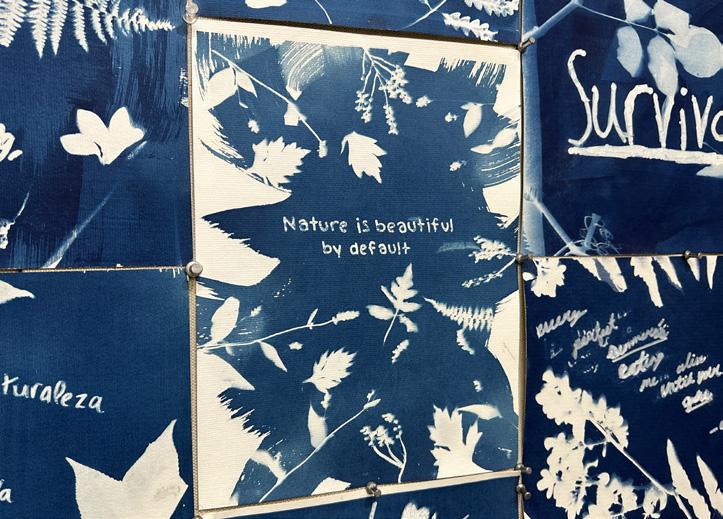
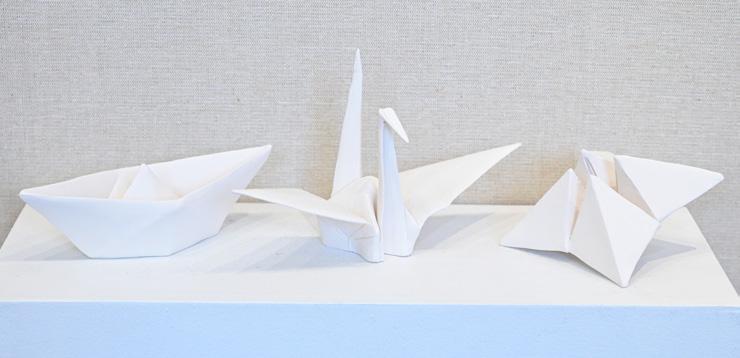
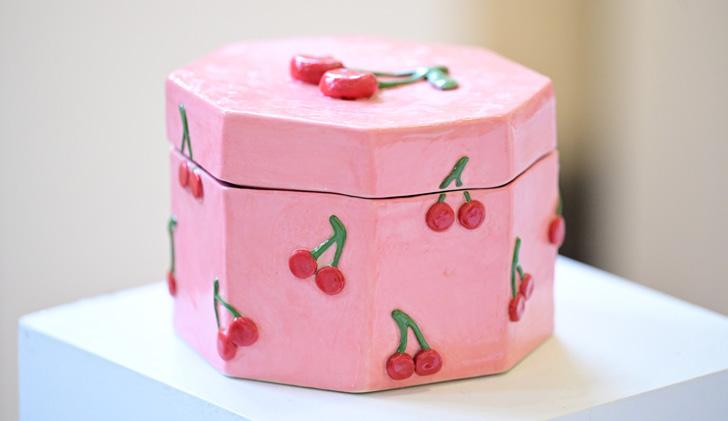

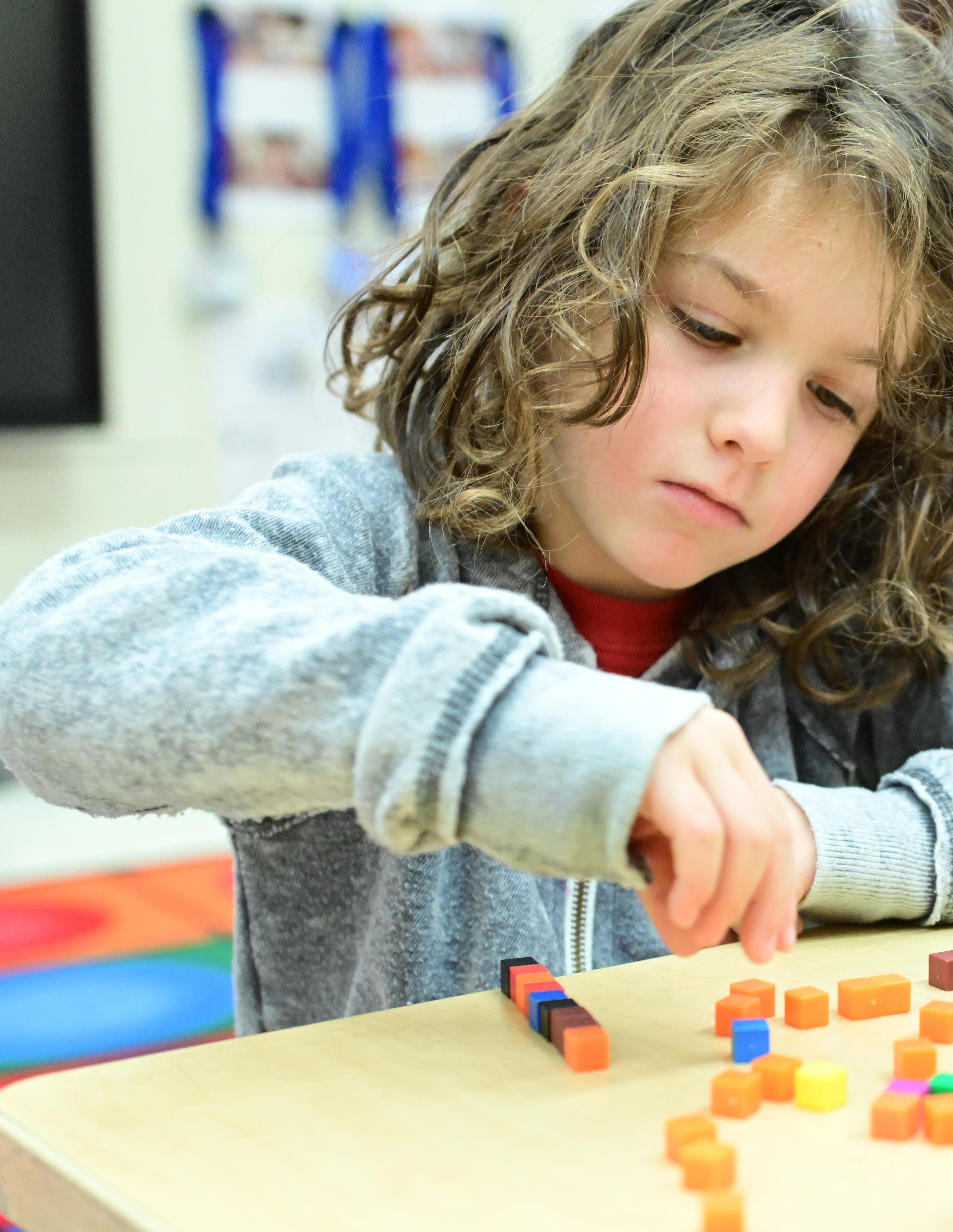
Cover Story
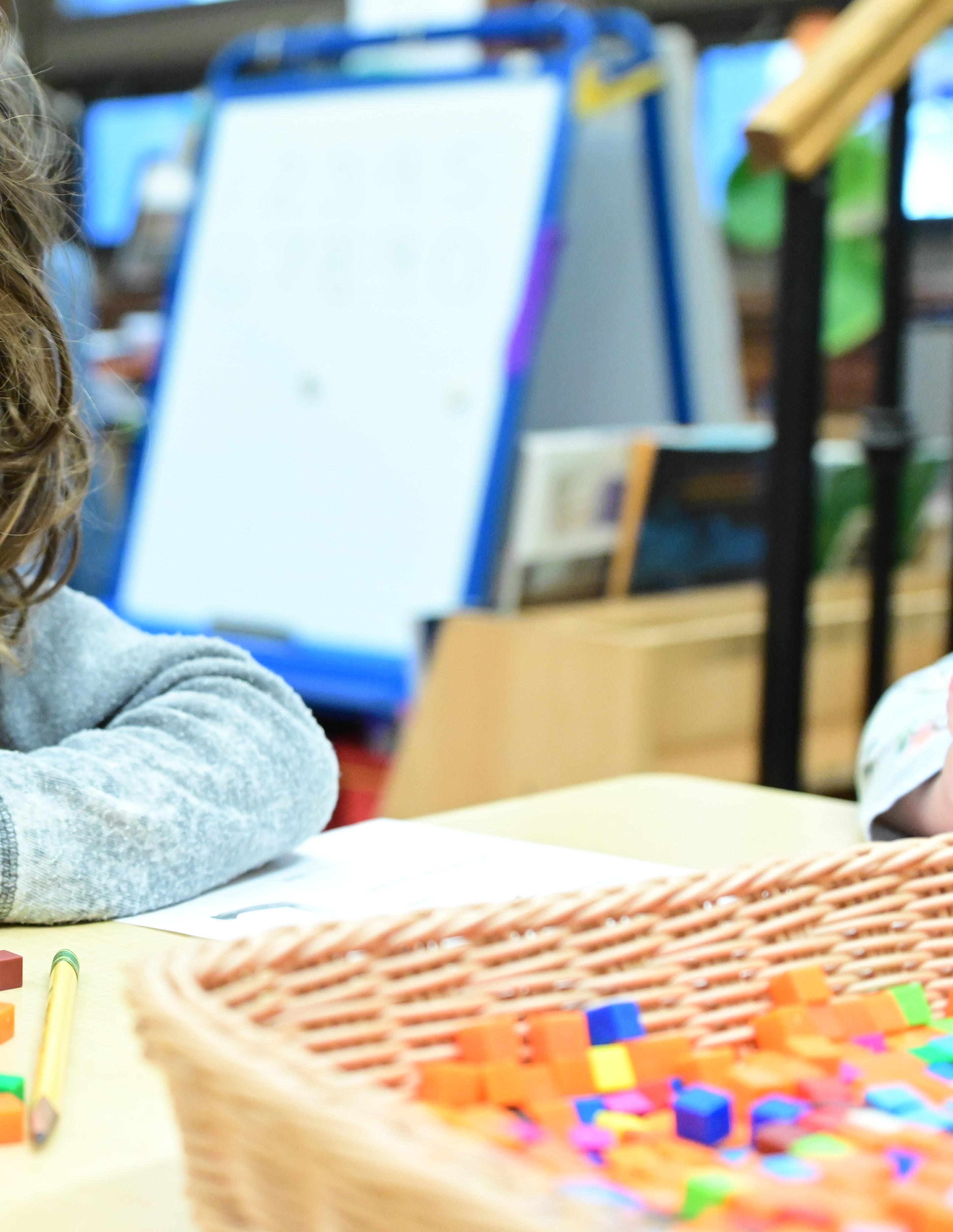
Progressive education at ECFS extends the definition of “learning” beyond traditional limits. Our teachers adopt a dynamic, creative, and student-centered approach, empowering students with the skills to excel academically and emerge as leaders.
Our comprehensive and interdisciplinary curriculum integrates the humanities, the sciences, the arts, and physical education to cultivate intellectual rigor, academic mastery, and innovative thinking. Our commitment to building skills and strengthening academic excellence defines ECFS’s progressive education and creates confident individuals who approach challenges with curiosity and resilience.
Authors
Emma Johnson, Communications Manager
Kristen Perrone, Communications Manager
Responsive teaching methods allow students to take ownership of their educational experiences.
At ECFS, teachers employ a responsive approach to education — curricula are never rigid templates but rather dynamic pathways that can flex to accommodate to each student’s needs and curiosity. Students are taught to investigate and inquire about the world by exploring and connecting global events, shared cultural experiences, or personal interests. This holistic approach is seamlessly integrated across all grade levels and subjects and nurtures a community of passionate lifelong learners and leaders.
In the vibrant landscape of education, focus has recently shifted to STEAM (science, technology, engineering, arts, and mathematics) programming. As interest grows among students, ECFS’s teachers are growing current STEAM initiatives and forging new pathways for exploration. Often, the programming at Ethical Culture and Fieldston Lower leverages the abundant outdoor spaces that students have access to: Central Park and the sprawling Fieldston campus.
Ethical Culture Science Teacher
Beverly Chang’s 1st Graders engage with a cherished tradition that unfolds like clockwork each fall: the beloved “Central Park Study,” a rich, interdisciplinary experience that engages all five senses. Guided by Chang, the young learners venture into the park and transform into budding biologists. With magnifying glasses in hand, the 1st Graders explore every inch of the ground as they meticulously inspect plant life, rocks, insects, mammals, and other critters that call Central Park home. This outdoor exploration allows students to cultivate the fundamental knowledge of how to learn and observe that will evolve into formal scientific thinking, methodologies, and habits.
Prioritizing responsive teaching encourages faculty members to design
lessons with autonomy and ambition in mind. This year, a group of Chang’s students was especially curious about the anatomy of worms and how to distinguish them from insects, so Chang tailored a lesson that engaged their inquisitive minds.
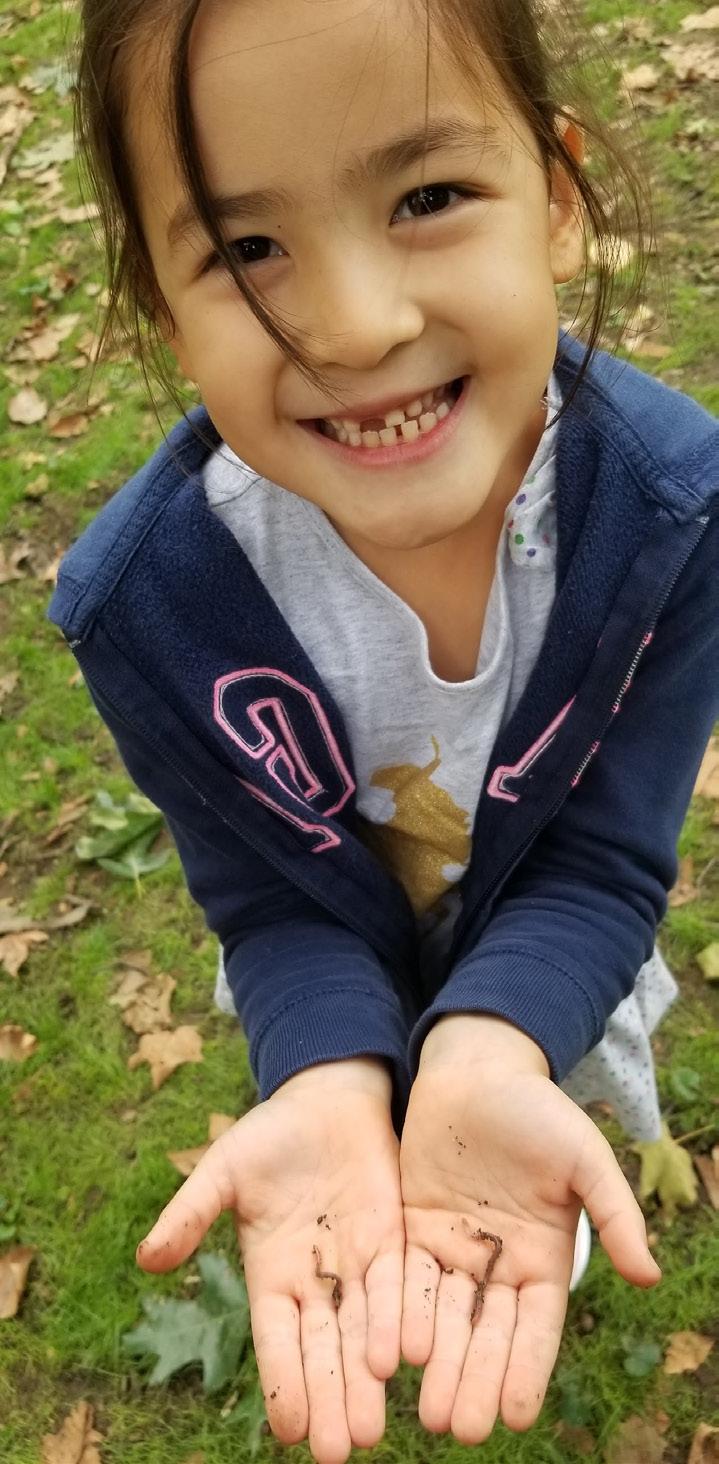
Inspired by their discoveries, the students learn to conduct fair tests to answer inquiries such as “Do worms prefer the rain or sun?” To investigate, they devised an experiment by dampening one side of a tray and placing it in the shade while keeping the other side dry. Then they observed the worm’s behavior and wrote down what they noticed before heading back to the classroom to pour their findings into a booklet that they could use to educate their peers and families.
“It’s not about the specific subject
matter itself, but the skills and processes they develop along the way,” Chang explains.
No matter what students latch onto, Chang can guide them to ask questions and think independently, enabling them to seek solutions creatively.
“I encourage all my students to pursue their interests, no matter what piques their curiosity. What matters most at this stage of academic skill development is learning the practice of scientific thinking and the scientific engineering process where they identify problems, brainstorm solutions, design, test, and redesign,” Chang says.

Responsive teaching ensures that our curriculum is academically relevant and stimulating. At the beginning of the academic year, Fieldston Lower Principal Joe McCauley initiated a student garden club in response to a letter from a group of 5th Graders advocating for increased meaningful garden time, and after a presentation by the 5th Grade Garden Club student leaders, 3rd Grade Teacher Chris Lally was inspired.
Lally began his career in the food industry and worked in restaurants worldwide for over 20 years. After culinary school and training in New York, he later joined the Rome Sustainable Food Project at the American Academy in Rome, where he gained insights into the connections between farmers, chefs, and communities. Once Lally discovered his passion for educating young people and joined Fieldston Lower, he created and piloted the garden curriculum with his students to share some of the ethical principles he’d learned about food sources.
Once the frost had melted, Lally and Head Teacher Gio Casiano regularly

brought their 3rd Grade students to the garden, where they added soil to pots; prepared seeds; and studied the areas in the garden with the most suitable temperature, access to water, and drainage for their seeds to grow. “Throughout the spring, students plant and tend the garden; forage and prepare tisanes; harvest and wash vegetables; write menus; and build, plate, and serve salads for themselves and their peers,” explains Lally. “Our students are getting their hands dirty with the work required to care for the land and life of the garden. It has been a fascinating and rewarding addition to our classroom.” This hands-on experience deepened their understanding of farming, food sources, and the scientific makeup of plants and also taught them to become respectful caregivers and stewards of a more sustainable community.
Our students trust that their voices will be valued and actively advocate for change and new ideas. By giving students ownership of their educational experiences, their interest in learning and exploring is carried forward as they advance through Fieldston Middle and Fieldston Upper. Not only do they value the mentorship
engineering. These cross-divisional interactions create meaningful connections between students of different ages and model the kind of academic exploration younger grades have to look forward to.
“I’m turning my passion for STEAM into a tangible reality and paving the way for future generations of aspiring engineers at ECFS.
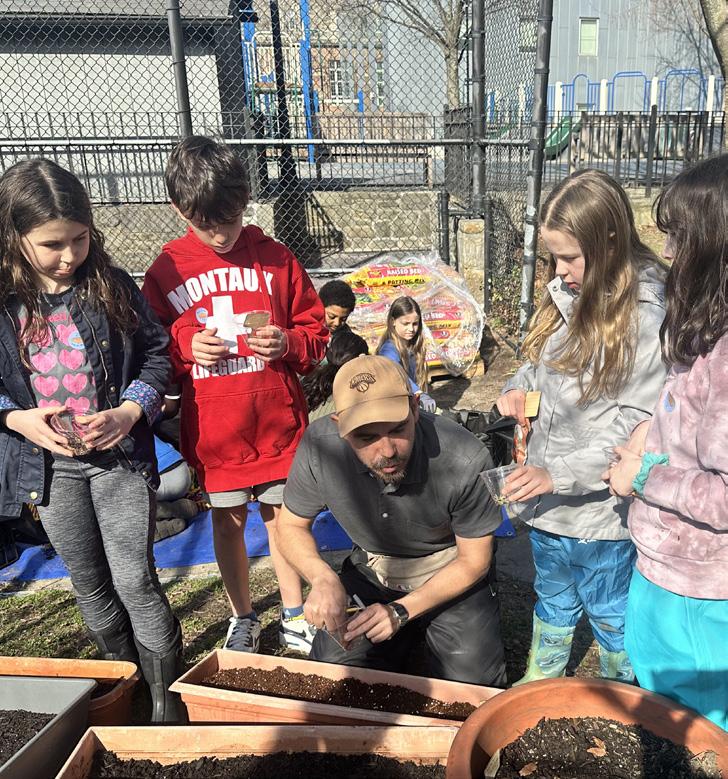
received from their teachers, but they also become mentors themselves, passing on their knowledge to the next generation.
A cohort of 10th–12th Grade Fieldston Upper students involved in engineering and robotics visited Ethical Culture’s 4th Graders to share how STEAM concepts manifest in our daily lives and inspire future generations to carry on their work. During the visit, the older students conducted workshops, including designing tinfoil boats to test buoyancy and building sturdy towers out of newspapers to explore structural
Sophia T. ’26 remembers all the times that her curiosity was celebrated as an elementary school student: “I trace my love for engineering back to Pre-K at Ethical Culture. I remember creating ‘beautiful junk’ — turning old egg cartons and toilet paper into musical instruments and home decor,” she says. “In 1st Grade woodshop, I was introduced to tools and built a wooden tugboat, which taught me about design constraints. Once I reached 4th and 5th Grade, I took computer science, which introduced me to coding and showed me the artistic side of engineering, solidifying my interest in STEAM.”
Education is not just about imparting knowledge, but also about nurturing a spirit of inquiry, creativity, and advocacy that prepares students to lead purposeful lives. Kai KS. ’25 credits his academic career at ECFS for cultivating his love for engineering and setting him on a clear path into the future. “My journey at the School has been a testament to the transformative power of creative learning and supportive mentorship. Through innovative programs and dedicated teachers, I’m turning my passion for STEAM into a tangible reality and paving the way for future generations of aspiring engineers at ECFS.”
A dynamic, experiential approach promotes comprehensive understanding and belonging.
At ECFS, the curriculum prioritizes engaging students’ hands, hearts, bodies, and minds. Teachers emphasize that learning occurs beyond the classroom desks and by utilizing our handson, project-based approach. Their goal is for students to not only perceive, listen, and think, but to also create, do, and experience.
In recent years, Fieldston Lower’s 3rd Grade teachers — Alexa Shikar, Gio Casiano, Chris Lally, and Ana Baert — along with Assistant Principal for Academic Life Shawn Chisty and the Library and Technology teams have revamped the social studies curriculum to ensure relevance and introduce meaningful educational opportunities inside and outside class. Moving away from rote learning, teachers are opting
Teachers are opting to immerse students in real-world experiences whenever possible.
opportunity for students to explore cultural landmarks in New York City, including Arthur Avenue in the Bronx, Harlem’s Apollo Theater, and the Eldridge Street Synagogue, to gain an understanding of the value of a culturally vibrant neighborhood community.
Inspired by a program called Imaginative Inquiry, teachers incorporated dramatizations to engage students in scenarios that require critical decision-making. In one of this year’s simulations, the “mayor” (expertly played by Principal Joe McCauley) proposed a lucrative development akin to Hudson Yards, prompting students to assume roles as researchers and advocates, crafting counter-narratives to the proposal.
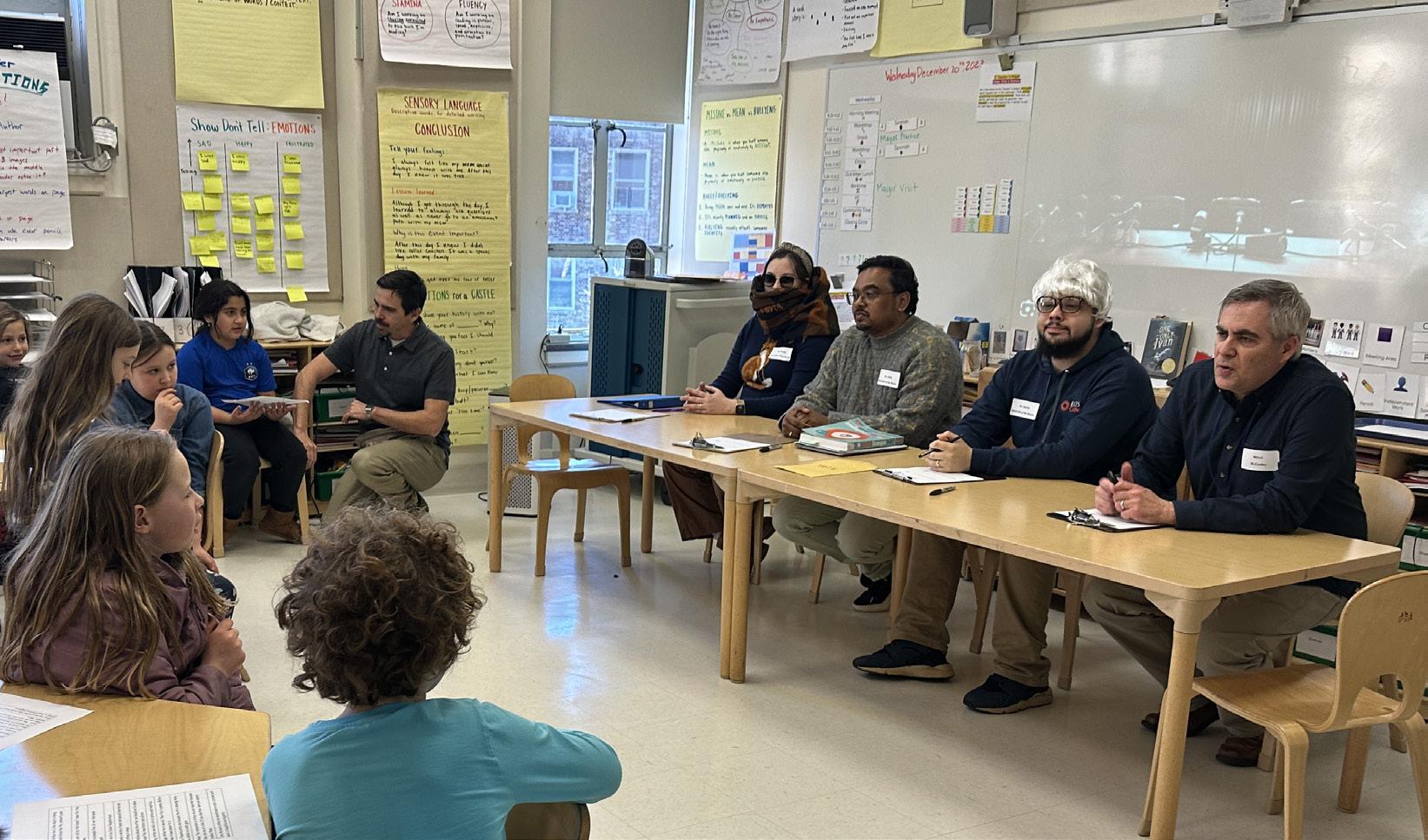
to immerse students in real-world experiences whenever possible.
A cornerstone of the newly developed social studies curriculum is the
As they considered the proposal, students realized that adding commercial spaces would mean displacing existing residential spaces, small businesses, and significant
landmarks. After reflecting on their visits to local businesses and sampling diverse cuisines like traditional Italian pizza on Arthur Avenue or pickles on the Lower East Side, they grasped the importance of preserving cultural uniqueness. “By practicing debate and research skills and building an awareness of dialectical perspectives when forming an argument, students were challenged to advocate for a place that promotes preservation and belonging — a neighborhood for the future,” explains Chisty.
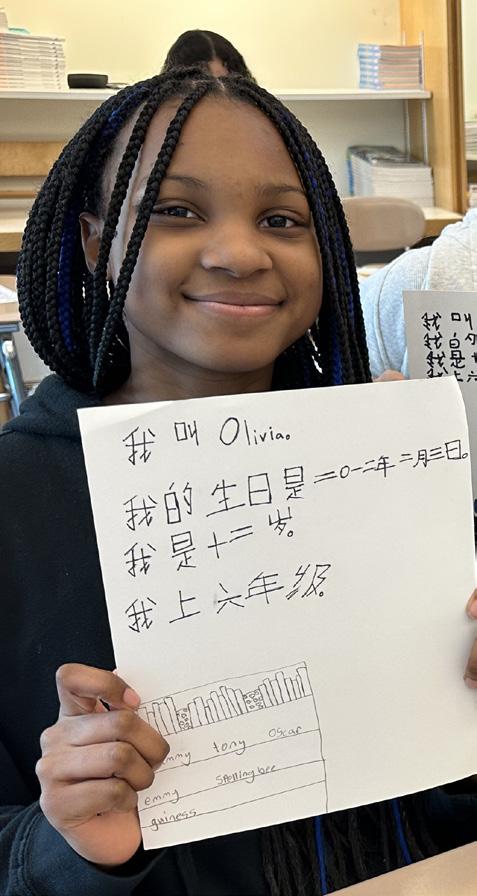
When the “mayor” and “consultants” met again, students presented compelling arguments based on their experiences. They advocated for preservation, showcased the economic benefits of places like the Apollo Theater, enhanced their credibility with detailed research, and appealed to emotions by highlighting the importance of local businesses to the community.
“The project’s experientiality asks students to think in a way that an adult would have to; this helps them practice conversational skills and become sophisticated, future-oriented individuals who are self-assured in their ability to effect change,” adds Chisty.
This focus on student autonomy and forward-thinking education continues at Fieldston Middle. After language teachers noticed a gap in students’ exposure to all of their options for choosing a foreign language, they
decided to introduce the 6th Grade class to all four languages instead of students immediately picking just one to study all year. This year, for the first time, the 6th Grade spent each quarter immersed in one of the languages offered at the middle school level: Mandarin Chinese, French, Latin, and Spanish.
which develops their abstract thinking and understanding of how languages work,” Li says. “They’re also discovering that they may be good at learning a language they didn’t expect.”
“The freedom to explore all the languages and get a preview of each one is nice,” says Daniel R. ’30. “It also feels good to know that you don’t have to pick what language you’re going to study in middle school without really considering your options.”
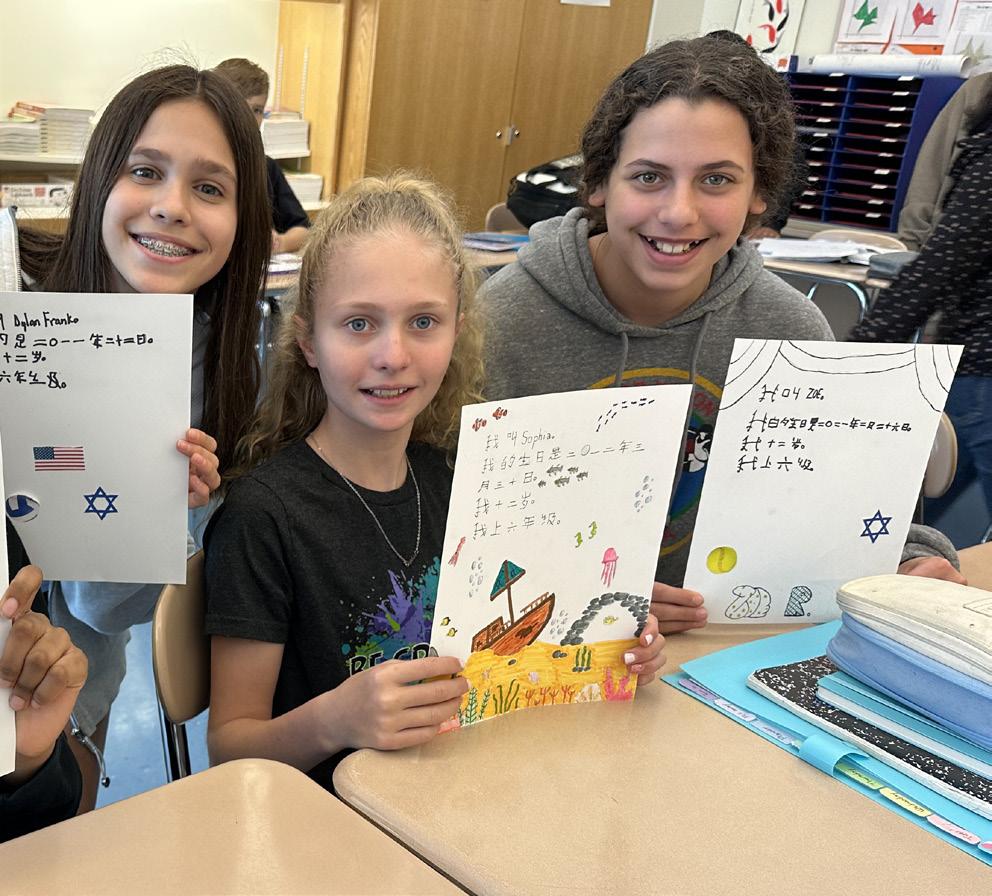
“Before choosing a language to study in middle school, the majority of the incoming 5th Grade students had only studied Spanish,” says Fieldston Middle Chinese Teacher and Language Department Chair Xiaofei Li. “Once the choice was made, most students would continue with that language throughout Fieldston Middle and Fieldston Upper. We heard students say they wished there was programming for them to experience all the languages. To respond to the students’ interests, we developed the rotation program for 6th Grade this year.”
“I love the idea that students are immersed in different sounds, cultures, and classroom routines and have the opportunity to make a well-informed choice about which language they want to dedicate their time to,” says Spanish Teacher Erinn Boyle. “They will make connections
“Students are immersed in different sounds, cultures, and classroom routines and have the opportunity to make a well-informed choice about which language they want to dedicate their time to.
between the languages and begin to understand what types of skills and habits they’ll need as they grow their proficiency in a language.”
Throughout the year, students have developed a comprehension of each language. Along with grasping basic grammar, pronunciation, and vocabulary, they explored cultural details such as Roman mythology, Francophone heritage, Spanishspeaking communities worldwide, and Chinese holidays. “Students are starting to compare the languages by drawing similarities and differences,
As the first year of the rotation program concludes, it promises to continue widening Fieldston Middle students’ understanding of what they’re capable of in the classroom.

Empowering students to be self-starters cultivates confidence in the classroom and beyond.
Our educational program developing students as active citizens and future leaders is integral to academic achievement. Through reflection, inquiry, critical analysis, and contextual understanding, ECFS’s goal is to provide a rigorous yet fulfilling learning journey that equips students with knowledge, theories, and practical skills they can utilize throughout their lives. Academic proficiency extends beyond having the right skills — it also requires readiness to utilize those skills.
outline, bibliography, and requirements for their potential study.
After participating in the science research program for two years, Ellie U. ’25 discovered an interest in understanding data analytically and from a scientific point of view. “Through my extracurricular activities, I became interested in learning more about business and psychology,” Ellie shares. “After talking with Mr. Waldman about my lab’s research work and my interest in business,
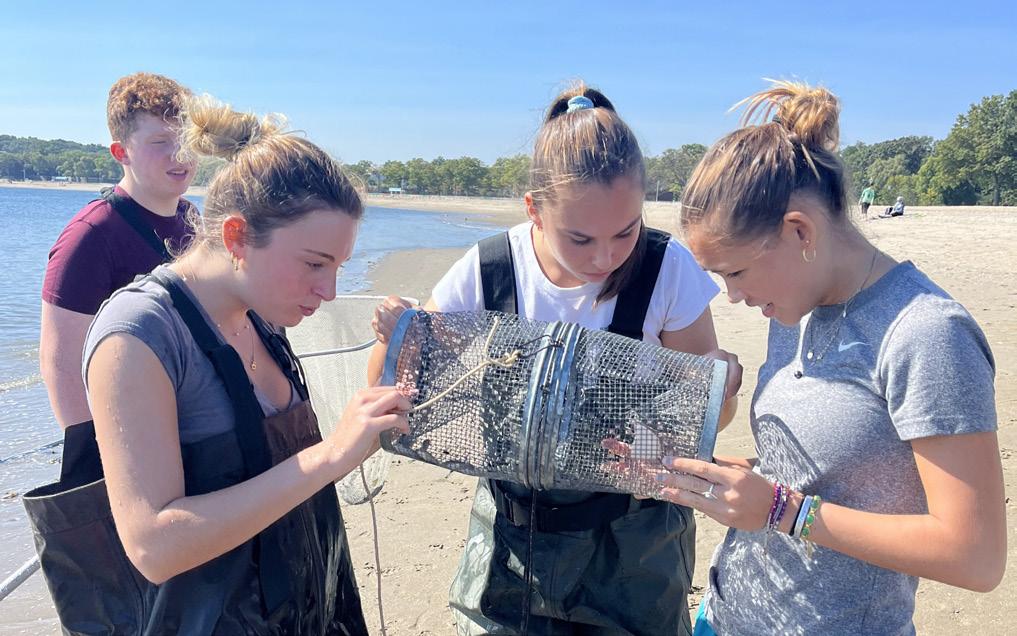
Being an independent thinker in both individual and group settings is fundamental to the Fieldston Upper experience. With access to course electives, semester away programs, multiyear science research labs, and City Semester’s immersive study of New York City, 11th Grade students sample the kind of academic freedom that promotes confidence in both their studies and themselves.
This academic freedom culminates in opportunities for 12th Graders to complete senior projects and independent studies as they prepare for their futures beyond ECFS. As they finish 11th Grade, students can propose an independent study for the following year to extend their learning outside the School’s standard curriculum. The proposal process requires students to find a faculty supervisor; consult with their advisor and dean; and submit an objective,
cleverness they’ve honed when preparing for their college careers.
“Every year, I am in awe of the intelligence, creativity, joy, ingenuity, intellectual curiosity, and autonomy that I witness from our students,” says Director of College Counseling Jameel Freeman. “Much of this is due to our progressive pedagogy and commitment to allowing students to explore and interact with the world around them freely. Particularly at Fieldston Upper, students are given the
“It’s about learning how to step up to the challenge, learning study habits, and developing as creators. Our time at Fieldston has given us a resourcefulness that will benefit us later in life.
we decided to dive into a combination of all of my interests by creating an independent study on behavioral economics.”
Ellie plans to explore different research showcasing what motivates economic behavior. “Because a main part of my work will be examining academic papers and research studies, I’ve been preparing by learning how to read academic papers and use various sources to understand how different topics connect,” she says. “Something that I love about this opportunity is how discussion-based and studentdriven it is. I can guide my study with topics I’m interested in and spark new conversations.”
With recent independent study topics ranging from Hungarian history and judiciary to environmental racism in the Bronx, the breadth of students’ ideas exemplifies the creativity and
ability and responsibility to go beyond the scope of their traditional academic disciplines to discover intellectual interests that are authentically exciting and important to them. This lifelong commitment to academic exploration and ethical leadership has always been valued and pursued by the colleges and universities into which our students matriculate.”
“An independent study is almost like teaching yourself a class,” says Jake K. ’24, who compiled an overview of Hungarian history from 1945 to 1990 and intertwined his grandparents’ experience as Hungarian Holocaust survivors into his research. “It’s the first time that I’ve done independent work of this magnitude. You have to keep yourself accountable, and when you’ve learned to do that independently, it becomes much easier to do that in the classroom, too.”
Students may be inspired by classes they previously took to pursue unexpected study topics. After taking The Prison Complex: Ethical Issues in the U.S. Criminal Legal System, Greta G. ’24 recognized an opportunity to explore her own Hungarian heritage alongside it. “That class made me realize that I was interested in criminal justice and reform,” she says. “We went through the United States criminal justice system and how external factors impact it. I wanted to do something similar with the Hungarian system, and it turned into an inspection of how the legal system developed there and how the government has changed over the last couple of decades.”
Similarly, the experience Harrison S. ’24 had in a history class on American politics gave him a fresh perspective on what he felt confident in studying. “I stopped seeing history as disjointed and started seeing how it impacts our present day,” he says. “Given that we attend a nearly 150-year-old school, I realized just how much has happened on the Fieldston campus, and I wanted to compose a paper to document the School’s fragmentary past in one place.” Using the intellectual confidence he built as a City Semester student, Harrison dove into the history of the School from any angle possible: historical reports, Fieldston News stories, New York Times articles, and archival photos.
Senior projects, which allow students to design and participate in their work outside of the classroom during their final spring semester, can also lead to students honoring ECFS’s influence on their lives. As part of their project, Caroline M. ’24 and Diana B. ’24 painted a mural with three scenes capturing the joy of a sunny day on the Quad.
“Originally, we each had very different ideas about what we wanted to do,” Caroline says. “But when we talked to one another, there was this moment where we were able to perfectly combine our ideas in a unique and unexpected way.”
“There’s a feeling on campus when winter’s over, and it starts to feel like spring again,” adds Diana. “The first warm day that everybody’s back on the Quad is so joyous. For both of us, that felt like one of the moments we wanted to capture.”

Senior projects incorporate an interdisciplinary approach to explore subjects outside the regular curriculum, which sometimes means asking students to dedicate substantial time off campus to complete their work. Such a feat may initially feel daunting, but for some students, big ideas inspire vast collaboration. For their senior project, Kevin V. ’24,
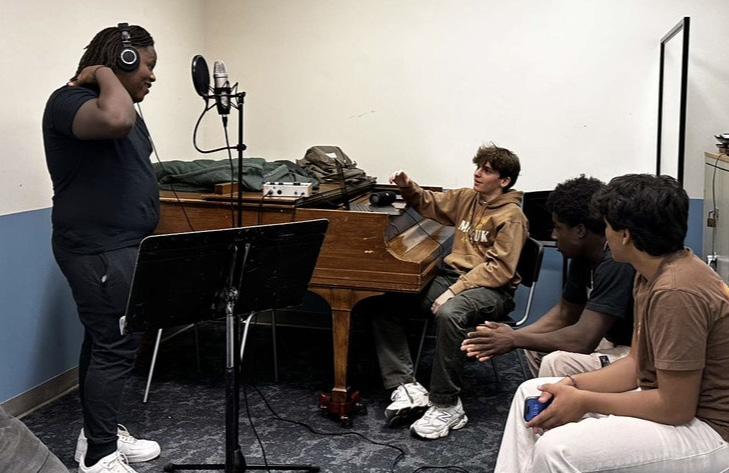
Amiri M. ’24, and Gavin W. ’24 produced a musical album, prompting Austin U. ’24, Justin A. ’24, and Wyatt T. ’24 to make a documentary about the creation of their friends’ album.
“The idea goes back to 6th Grade when we first met each other and were all placed in the same electronic music class,” Gavin says about the album. “That’s where we discovered our love of music, whether it was making the beats ourselves, where to place the drums, or how to put it all together.”
Six years later, the group of friends knew that their love of music — from composing the music to writing the lyrics to producing the tracks — would provide a strong foundation for a senior project and be an opportunity for them to dive into their shared interest together.
Gavin, Kevin, and Amiri interviewed their peers about their experiences at school, focusing on students of color, and used these transcripts to write song lyrics. “It’s been a really amazing process seeing my close friends put their passions to use and display their raw talents,” Justin says. “I’ve learned a lot just watching them and seeing how much they enjoy music and how serious they are about it.”
“Whether you’re on the music side or the production side, whether you’re making videos, arranging clips, organizing interviews, or writing questions, one thing we can all take away as a collective is resourcefulness,” Gavin adds, recalling advice from one of his math teachers about lessons beyond the books. “It’s about learning how to step up to the challenge, learning study habits, and developing as creators. Our time at Fieldston has given us a resourcefulness that will benefit us later in life.”
“This opportunity requires you to think independently, and that’s when you can push the boundaries of your knowledge and your creativity — and do things you didn’t think you’d be able to do,” Caroline says. “Going out on your own forces you to utilize your toolbox of skills you’ve developed over all your years as a student.”
“Senior projects and independent studies empower students to enhance their own learning,” says Ethics Teacher and Class of 2024 Dean Stephanie Harris. “Students who participate in these programs are deeply curious and selfmotivated to push their education in intellectually curious ways. When students are dedicated to learning about topics that matter to them or that spark their creativity, their energy and enthusiasm are palpable.”
From vibrant interdisciplinary units like the 1st Grade Central Park Study to the dynamic approach of the 6th Grade language rotation to the intellectual challenge of the 12th Grade independent studies, ECFS cultivates a community where students acquire the knowledge, curiosity, and determination to prepare them for the future.
Our faculty’s dedication to an experiential education resonates not only in the information our students learn, but also in the opportunities and experiences that spark questions, nurture critical thinking, and enhance cultural understanding. This approach to teaching and learning — driven by our shared commitment to fostering academic excellence and the profound transformation that comes from immersive learning — is a hallmark of what makes an ECFS education unique and invaluable for the students of today and the leaders of tomorrow.
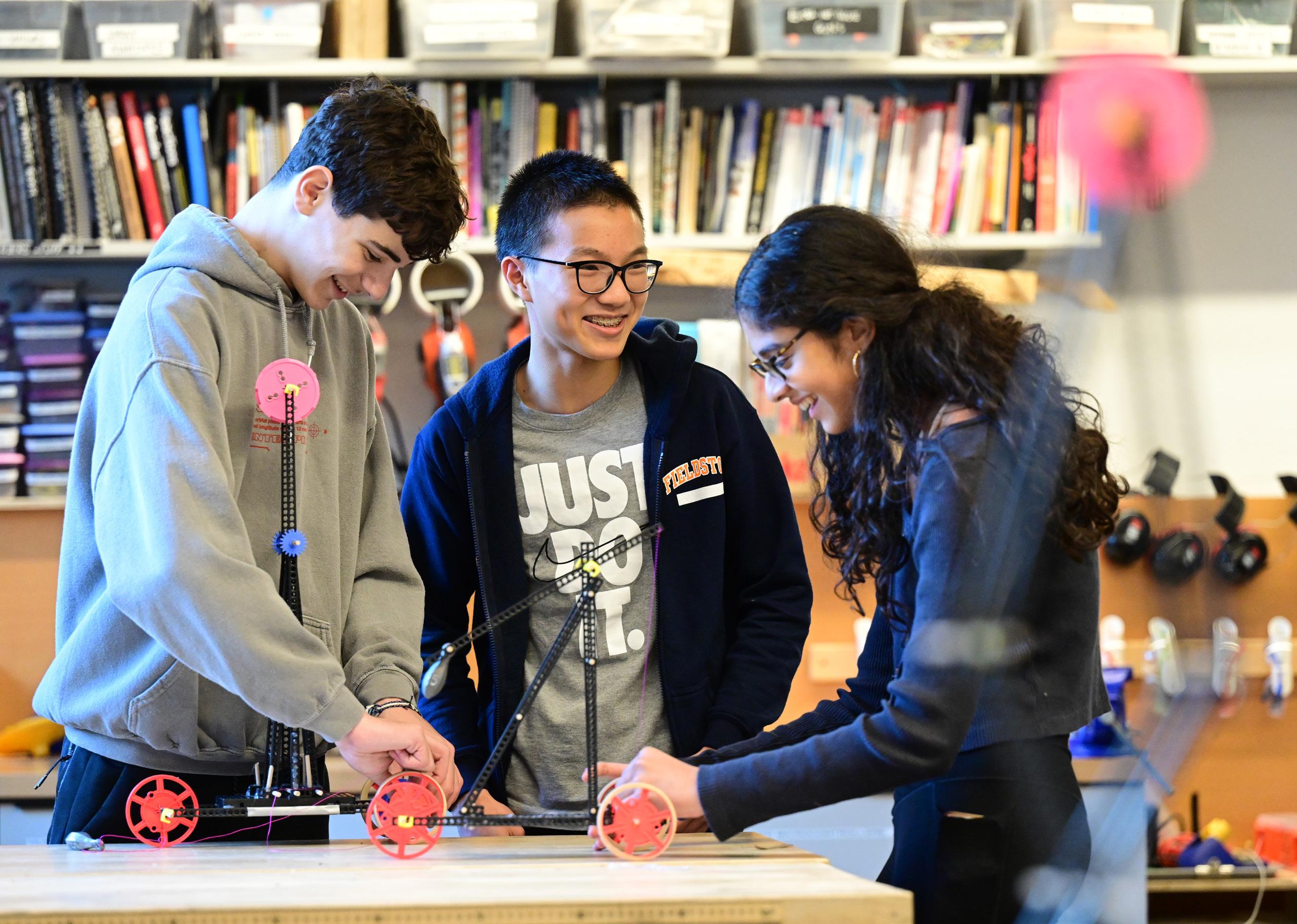
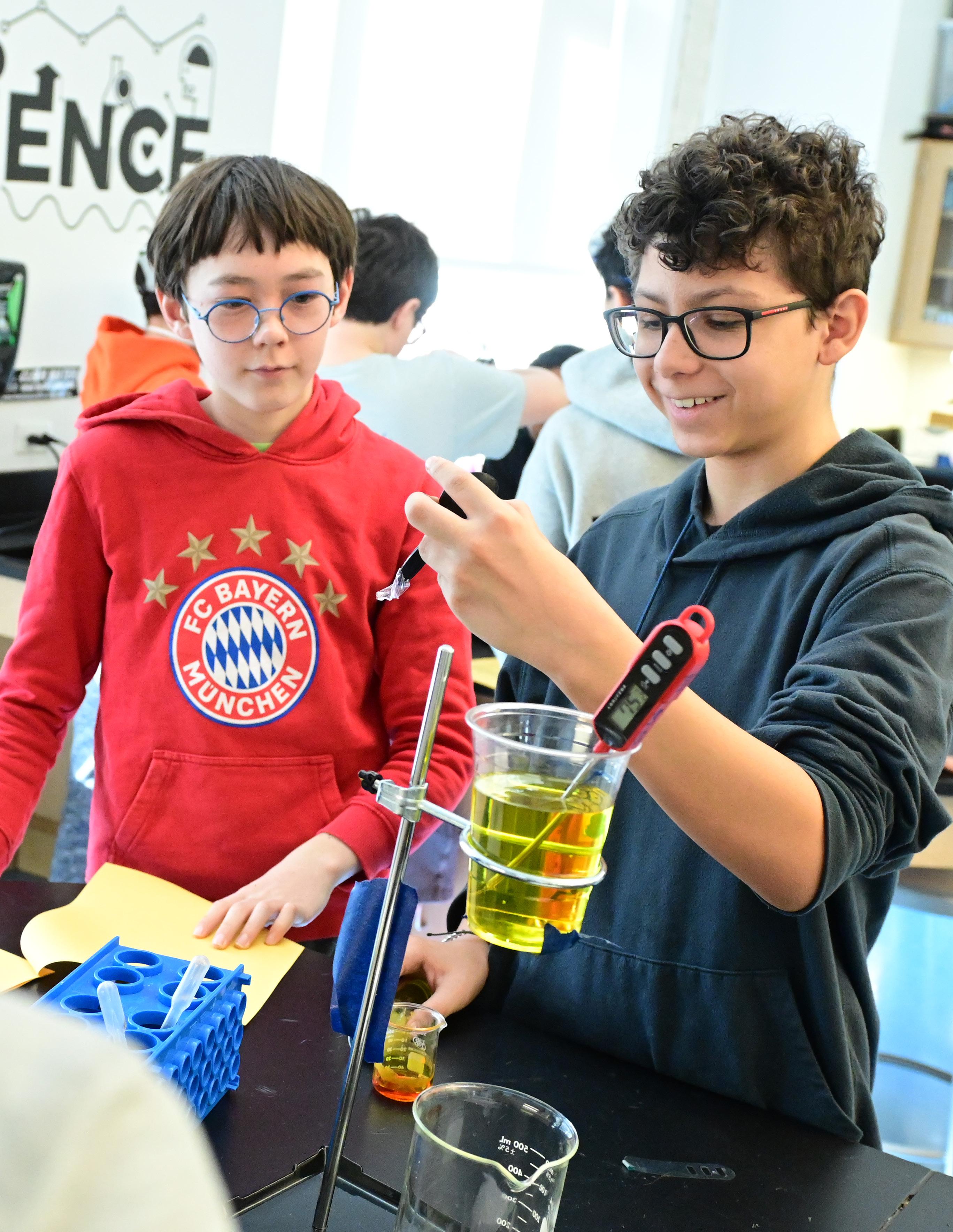

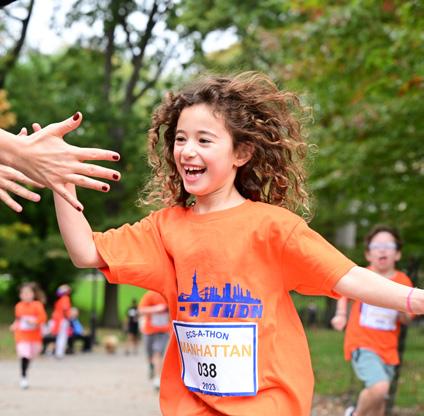

Ethical Culture’s 16th annual ECS-a-thon flooded Central Park with orange pride last fall as 1st–5th Grade students ran laps around the park’s baseball diamonds. Designed to mimic the New York City Marathon, the race has students encounter five distinct bases on their running route, each representing a different borough. The run isn’t a competition or a race but rather an opportunity for students to enjoy the outdoors, engage in healthy physical activity, and celebrate each other as they cheer on their fellow runners!
For more than 30 years, Fieldston Lower Kindergarteners have been studying the monarch butterfly. Students care for tiny caterpillars from their arrival on campus to the exciting moment they enter the chrysalis stage to the celebration where students release the fully grown butterflies to begin their migration to Mexico.
Along the way, students learn about the milkweed plant — the primary food of the monarch caterpillar — growing outside their classroom, practice counting as they chart the number of caterpillars entering the chrysalis phase, and experiment with different art techniques as they create depictions of the monarch butterfly’s life cycle. Most importantly, they discover how to love learning — setting the foundation for the years of interdisciplinary explorations to come.
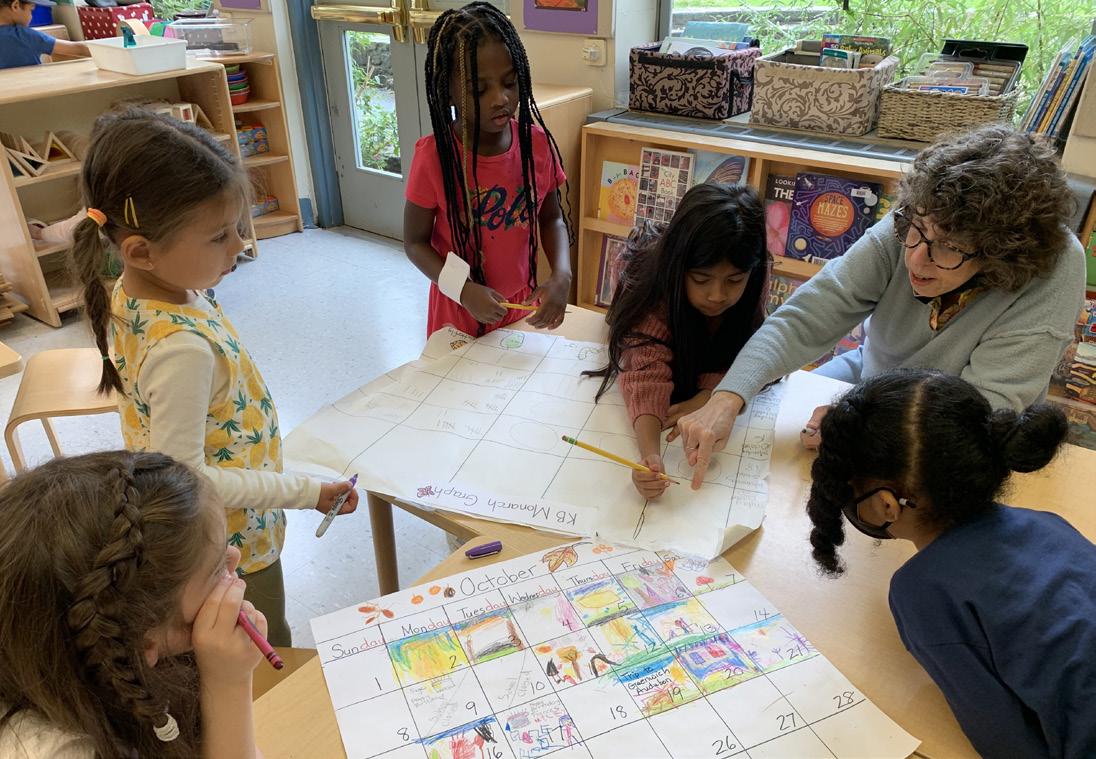
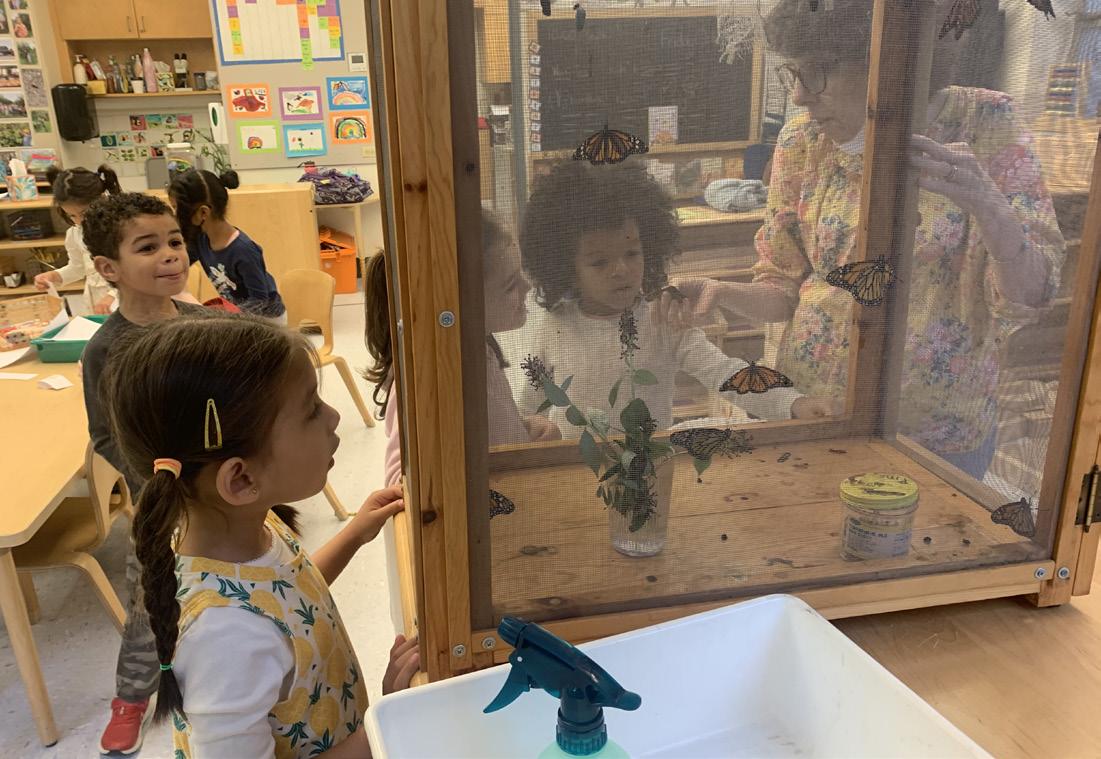
Love was in the air on Valentine’s Day at the annual Love is Love poetry event! At Fieldston Middle, each grade has a poetry unit in their English class. Students dive deep into the beauty and artistic nature of poetry, learning to understand style and structure while also exploring how they can use poetic language to express themselves. On Valentine’s Day for the past seven years, those lessons come to life when students are invited to read a poem of their choosing, whether written by the student or by another poet, to a group of their peers at Love is Love. 8th Grade students visit the agora meetings of the other grades to encourage them to participate, and the tradition is always evolving — this year, students also shared why they picked each poem and what it meant to them. The event, which was created to celebrate the Supreme Court decision to support marriage equality and recognize the LGBTQ+ movement, is such a special day for Fieldston Middle — one that exemplifies the power of community and self-expression!
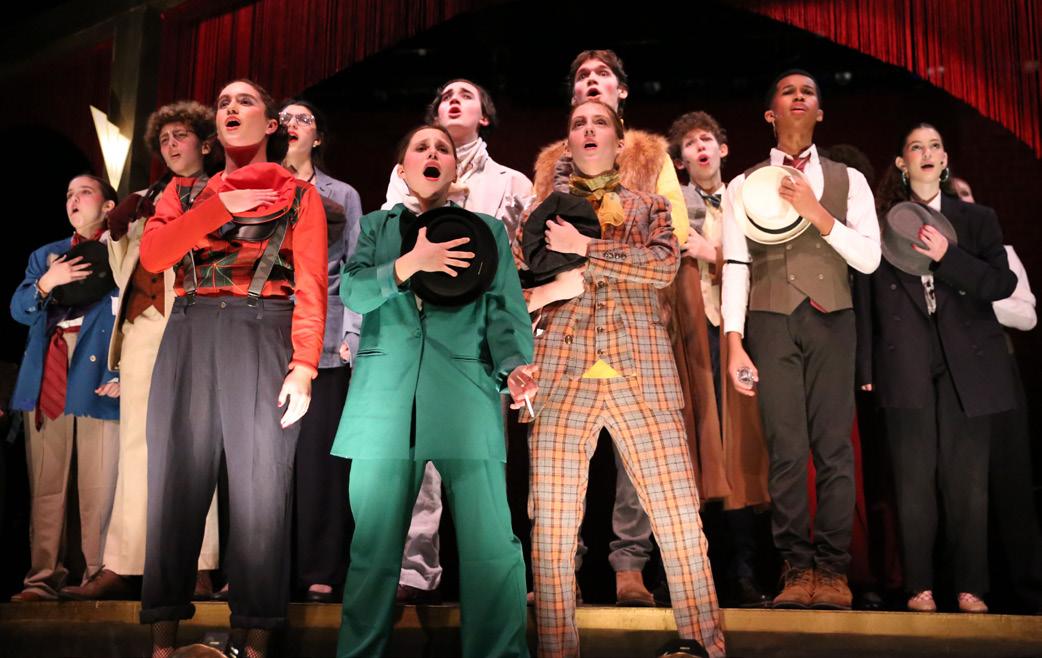
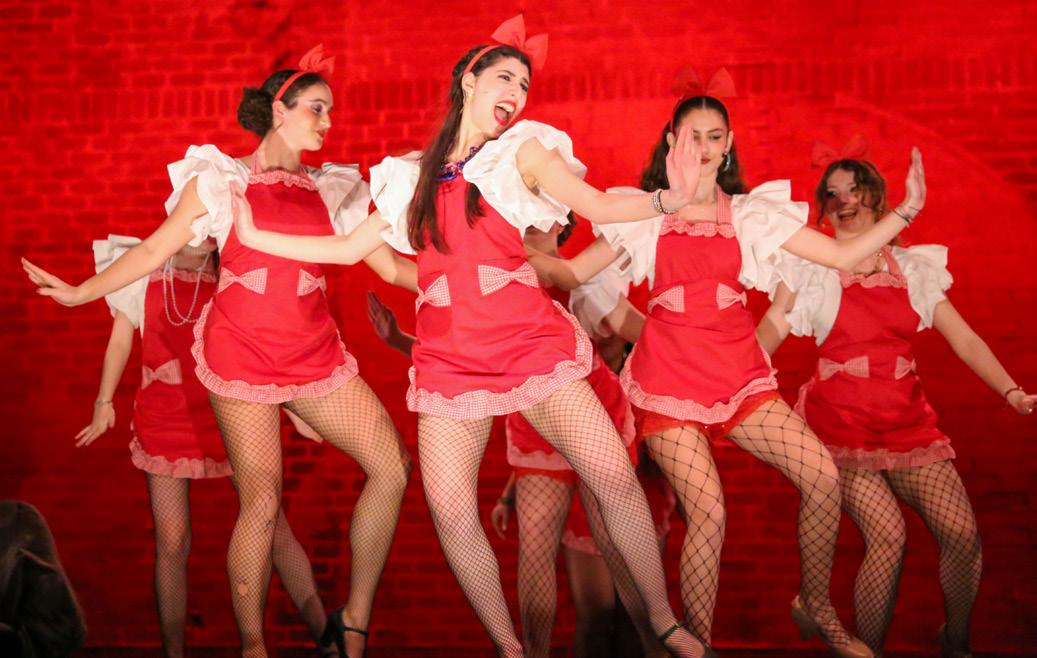
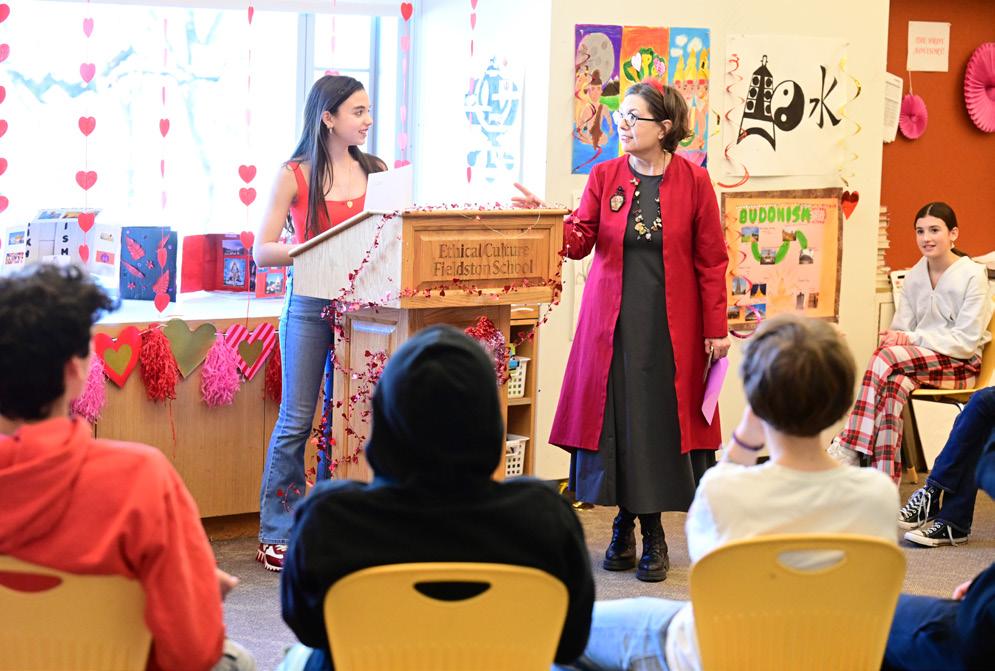
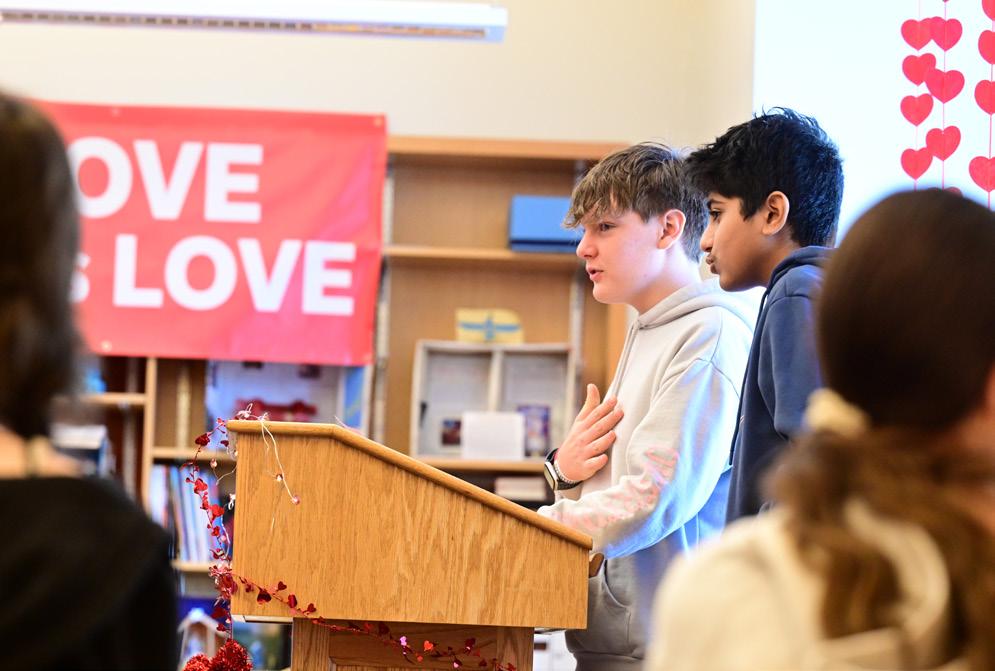
Fieldston Upper students took to the stage for this year’s spring musical, “Guys and Dolls!” A company made up of students and alumni courageously brought this classic of American musical theatre to life with the aesthetics and social criticism of Weimar-era art and influences from theatre practitioner, playwright, and poet Bertolt Brecht and American philosopher and gender studies scholar Judith Butler. Over the course of five months, the cast and crew built stunning sets, created period costumes, and worked tirelessly to bring the show to the stage. Three alumni and more than 45 students did everything from running the lights to providing live music to performing on stage. Each theatre production is an exceptional display of teamwork and our students’ many skills!
In the Fieldston Upper Science Research Program, learning extends far beyond the classroom — all the way to Randall’s Island. Students in the program meet twice a week to learn advanced research and laboratory techniques, such as the invaluable and memorable experience of hands-on field sampling on the island’s shores. The diverse ecosystem gave the budding scientists the opportunity to study everything from crab diversity to ants to seaweed.
They took their collected specimens back to the lab to run a series of tests to replicate the DNA code within them — the first step in a project that culminated in a detailed research paper that they presented at a symposium. We love to see our students exploring their interests with these unique, experiential projects!
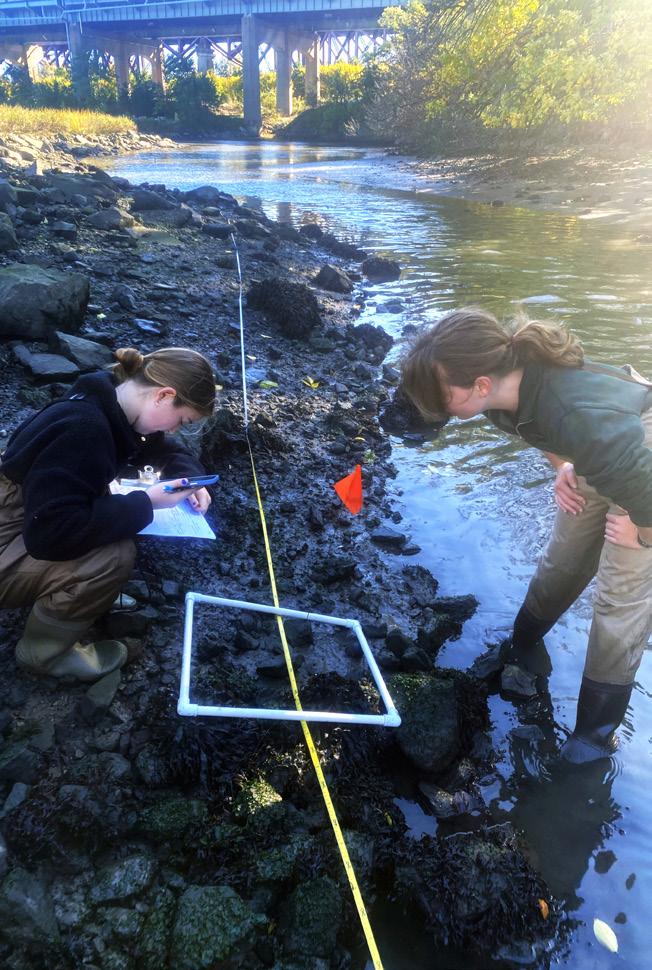
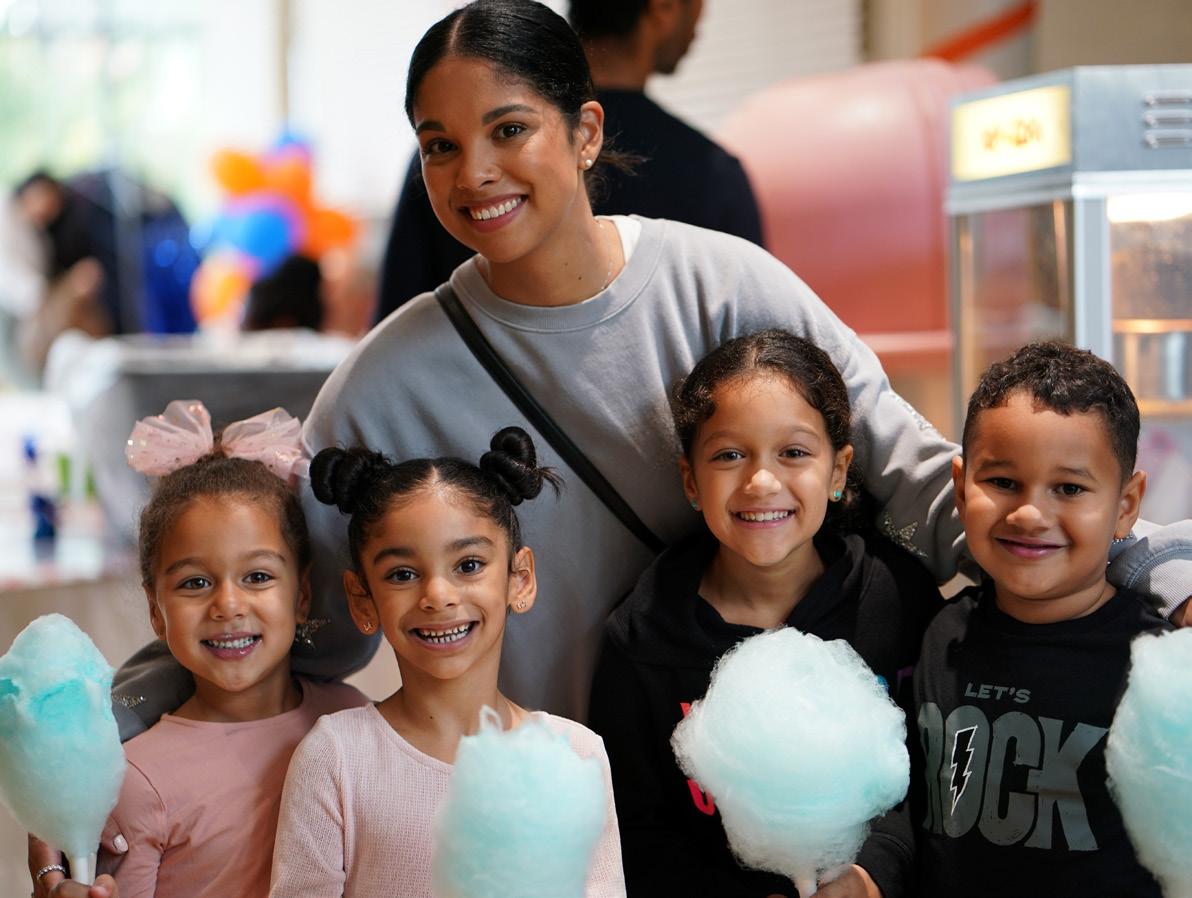
In March, more than 150 students, families, and faculty/staff came together for a day of community, celebration, and connection at the inaugural We Are Ethical event! This schoolwide event hosted by the All School Multicultural Committee included lip sync battles, an arts and crafts table with friendship bracelets and gratitude cards, and a dynamic spinning photo booth. The room was buzzing with joy and gratitude as people connected with old friends and made new ones.
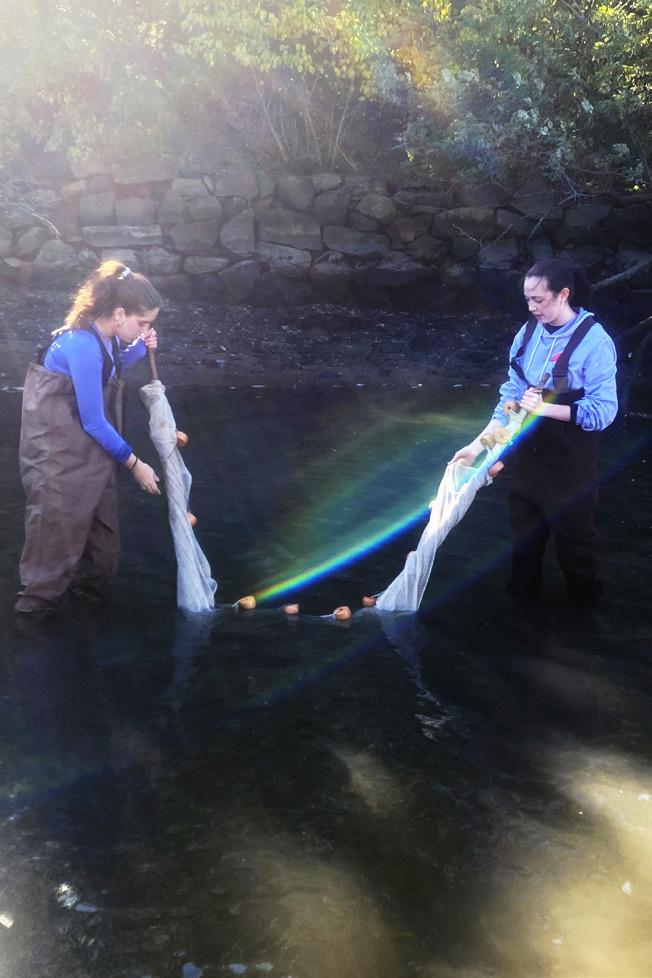
The Fieldston Lower Carnival returned this fall as a joy-filled celebration of community, fun, and school spirit! Rainy weather forced the Carnival indoors, but quick thinking by parent/guardian organizers, the ECFS Events Office, and the Campus Services team turned the Varsity Gym into a magical scene with bouncy castles, arts and crafts, a magic show, and more.
The Fieldston Lower Carnival is also a valuable opportunity for the 5th Graders to practice leadership and creativity as they plan various elements of the day, including which charity will benefit from the bake sale table — this year, they picked World Central Kitchen.
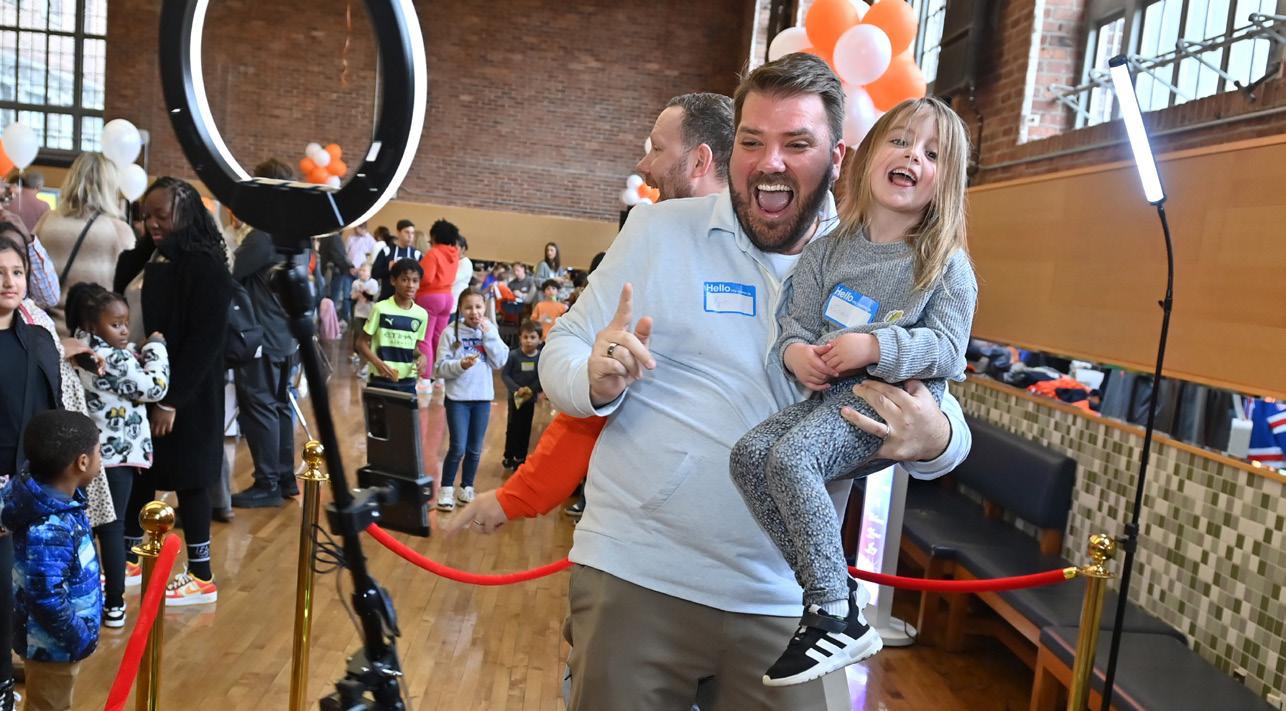
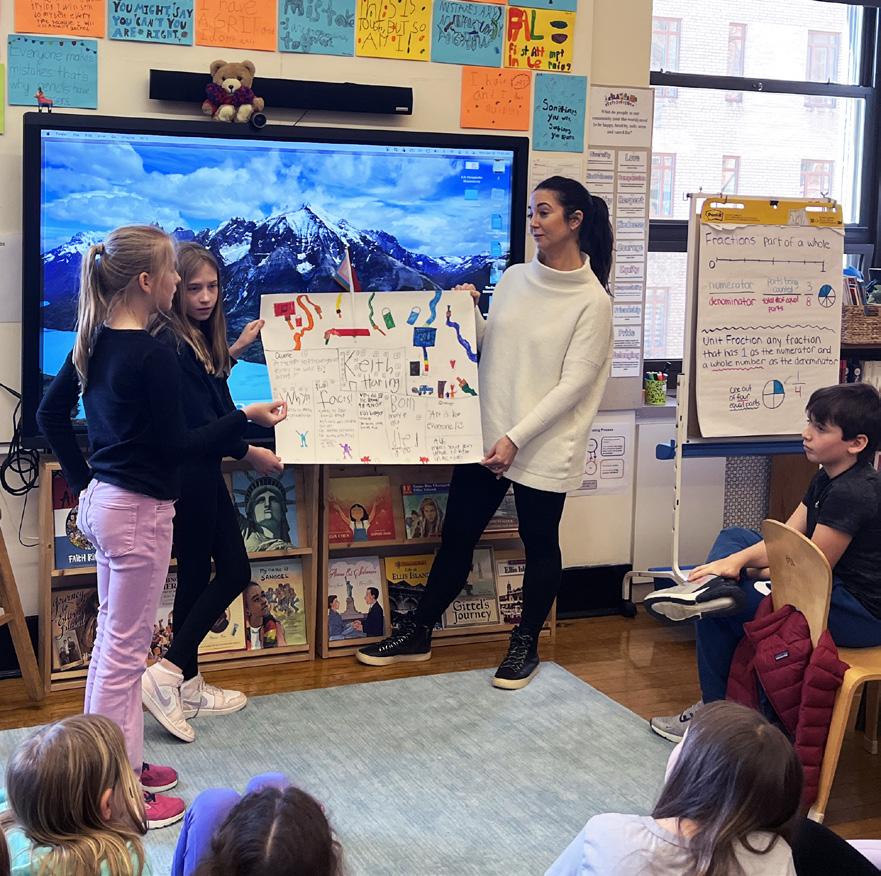
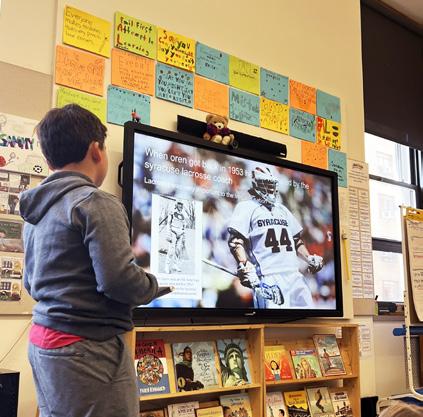
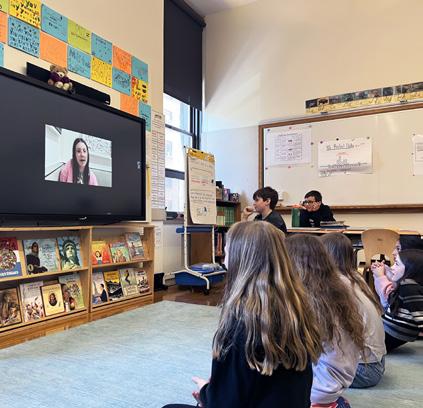
Ethical Culture 4th Graders brought together the skills they learned this year in the New York State Activist Project. The monthlong exploration had the budding changemakers researching the life and work of activists from New York State then sharing their research with the rest of the class through a slideshow, poster, video, song, or written report. Each student picked a historically significant activist from a list provided by their teachers, which empowered them to study someone whom they identify or connect with. Using a library of research materials, students practiced note-taking, paraphrasing, and analyzing. At the culmination of the project, students proudly shared with their peers what they’d learned — simultaneously informing their classmates about an important activist and practicing presentation skills.

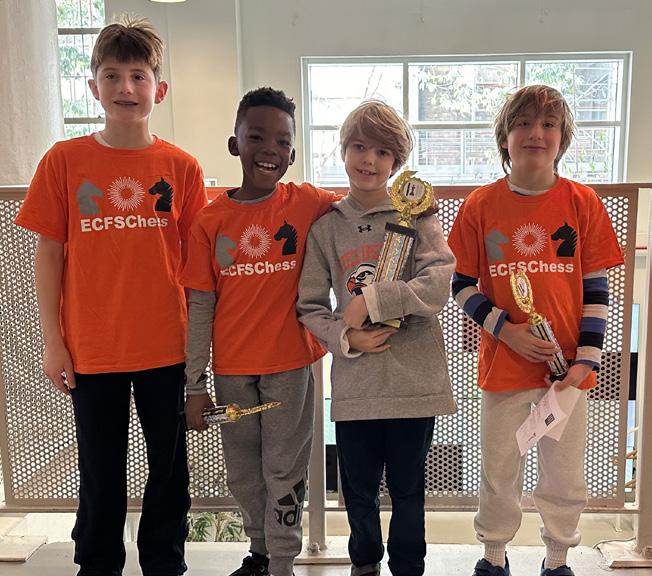
Ethical Culture, Fieldston Lower, and Fieldston Middle students proudly represented their school by playing in tournaments across the city this year with the Chess Club! The club provides a valuable opportunity for students across divisions to build friendships as they improve their chess game, develop analytical thinking skills, and engage in friendly competition.
Club organizers hope that instilling a love of chess at a young age will inspire students to continue learning and exploring the game in the advanced chess clubs at Fieldston Middle and Fieldston Upper. So far, more than 110 students are part of the club!
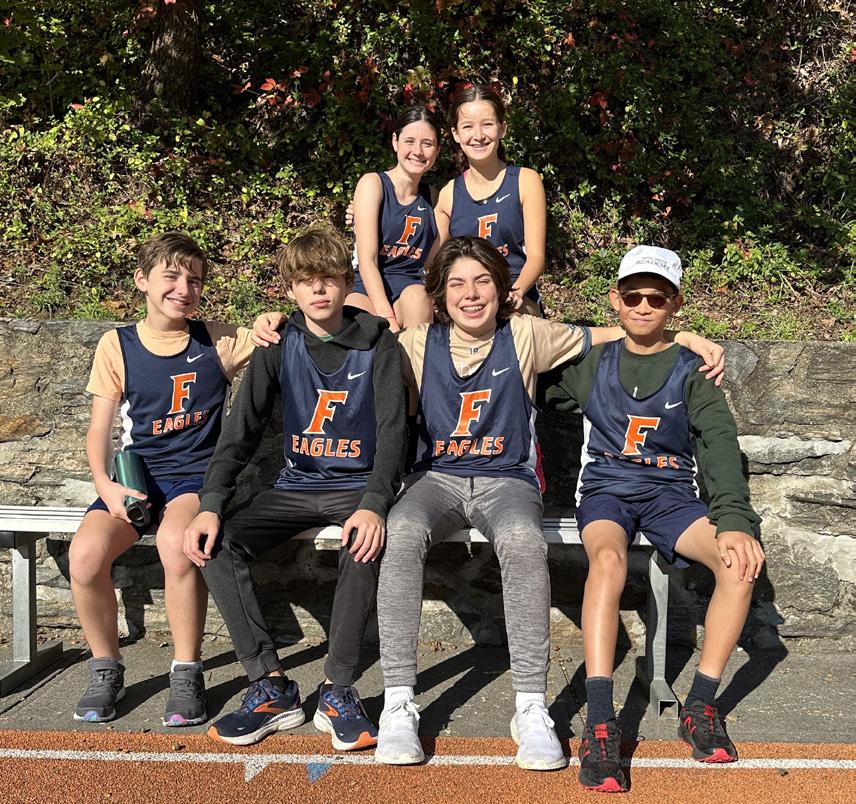
More than 500 Fieldston Middle students hit the court, field, track, and pool in exciting fall, winter, and spring sports seasons this year! Student athletes in 7th and 8th Grade practiced, trained, and competed in the fall in soccer, football, crosscountry, water polo, volleyball, and field hockey; continued the athletic spirit during the winter season with basketball, swim, and ice hockey; and wrapped up the year in the spring with baseball, softball, track, and lacrosse. Each and every athlete benefited from the relationship building, leadership skills, and goal setting that comes from playing on a team!
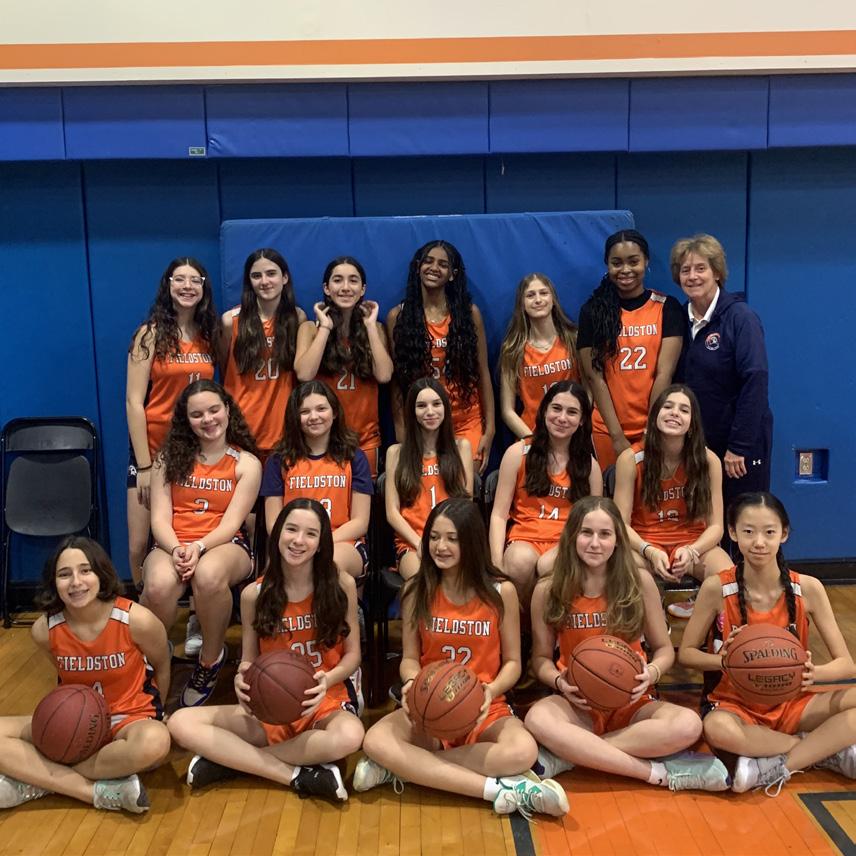
With college on the horizon, Fieldston Student Government Co-Presidents Sophie B. ’24 and Remy L. ’24 reflect upon their ECFS experiences and how their time as Eagles has prepared them for the future.
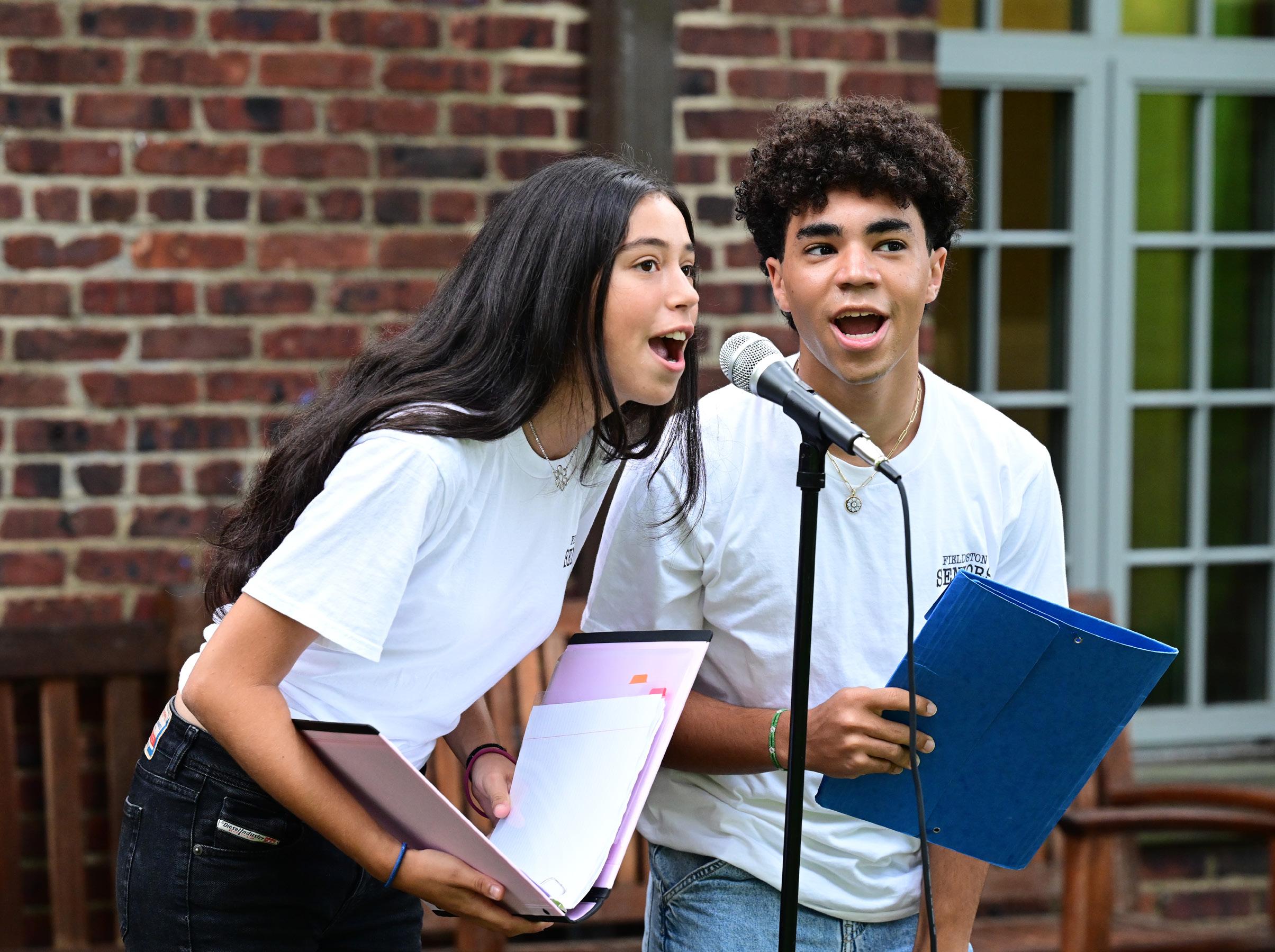
“Looking back, I feel like when I was going into 9th Grade, I thought I was so happy. I was very sure of myself and everything I was interested in and thought I had a linear trajectory ahead of me. This changed the second I stepped foot on campus for 9th Grade orientation. Fieldston is special because it doesn’t just offer diverse and enriching opportunities; it actively encourages them. There is never time to be bored with the creativity that you can curate when set in an environment like Fieldston. For example, four years ago, would I ever have thought to pair Hegel’s theory of self-consciousness with Gypsy Rose Blanchard? Or would I ever have know that I wanted to pursue a future in filmmaking without my teacher and Monday lunchtime acquaintance Mr. Buskey? Would I ever have even thought to enroll in a semester-long study of New York City through City Semester?
I have grown genuine love for myself through the space Fieldston carved out for me. I used to feel like my aura in school was not invisible, but also not present. Now I am involved in student government and stand on my own two feet with pride. I have met an incredible group of friends who I know will stay with me for the rest of my life. High school is a time to find your soul before finding your mission, so my advice is to live in the moment but also know that the present doesn’t have to be your future.
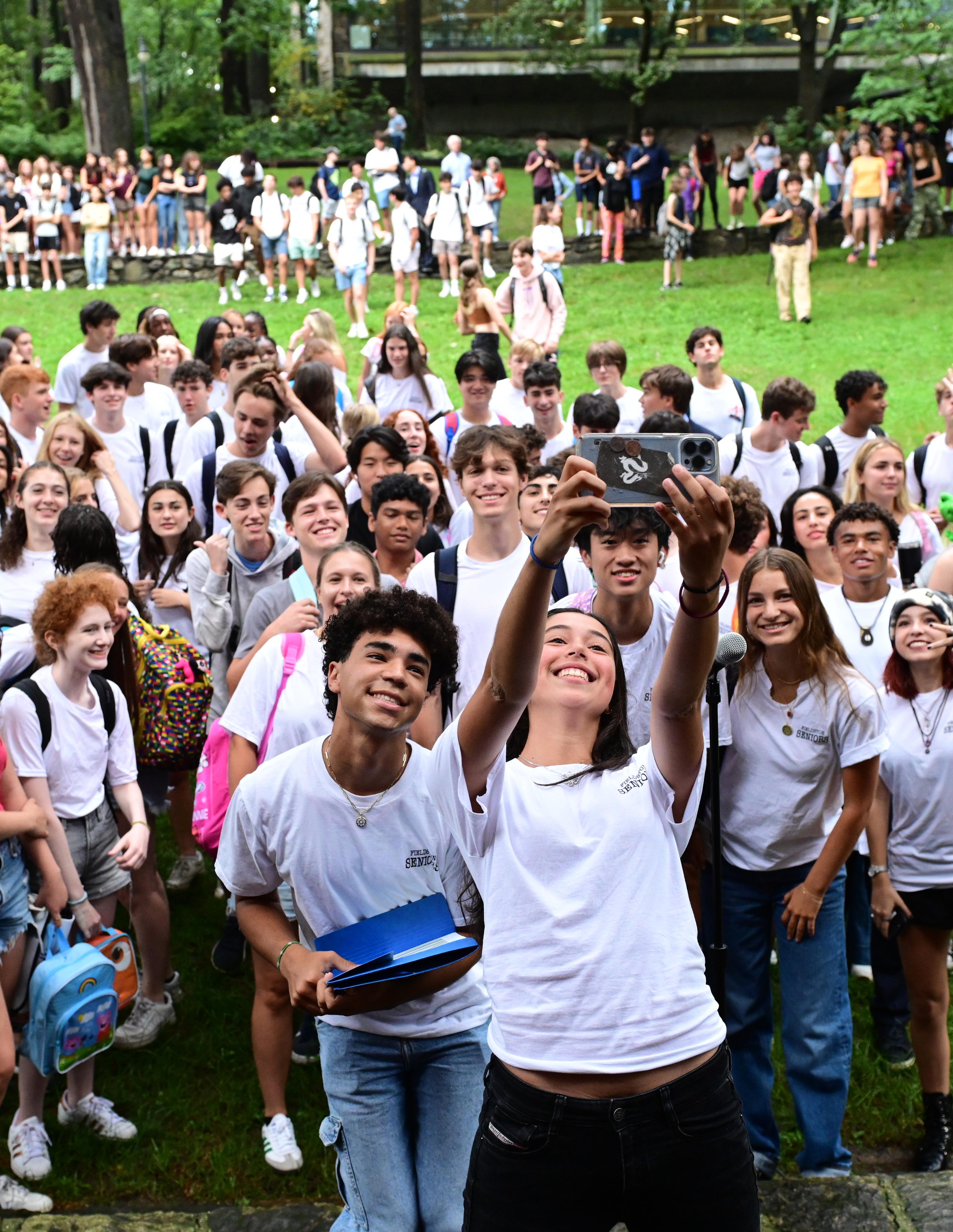
“I came to Fieldston in 9th Grade without knowing anyone. My transition into the School was difficult, as I arrived during the height of the pandemic and, let me tell you, it is not easy to make friends on Google Meet. Even after transitioning into half in-person and half online learning, all I wanted to do was stay home because school felt very isolating. Only in 10th Grade did I truly find my footing — I made some of my closest friends who know me better than anyone and pursued activities I never thought I would be able to succeed in.
Looking back on my overall experience at ECFS, I can see that I learned so much about myself as a student. But most importantly, I gained a great deal of self-confidence. Experiencing loneliness during 9th Grade only pushed me to branch out more, and as a result, I gained so much confidence in myself and in my ability to make friends. If I could tell my 9th Grade self anything, it would be to try as many of Fieldston’s offerings that you are interested in as you can. Even if it feels scary to put yourself out there, it will only make the best moments shine brighter because you will meet amazing people who enjoy similar activities. This is extremely true for me, as I can see the friends I have made at Fieldston being a part of my life for a long time.
What does life after Commencement look like? We spoke to five members of the Class of 2023 to hear about their first year in college, what the biggest surprises have been, and how they’re carrying everything they learned at ECFS into their post-graduation life.
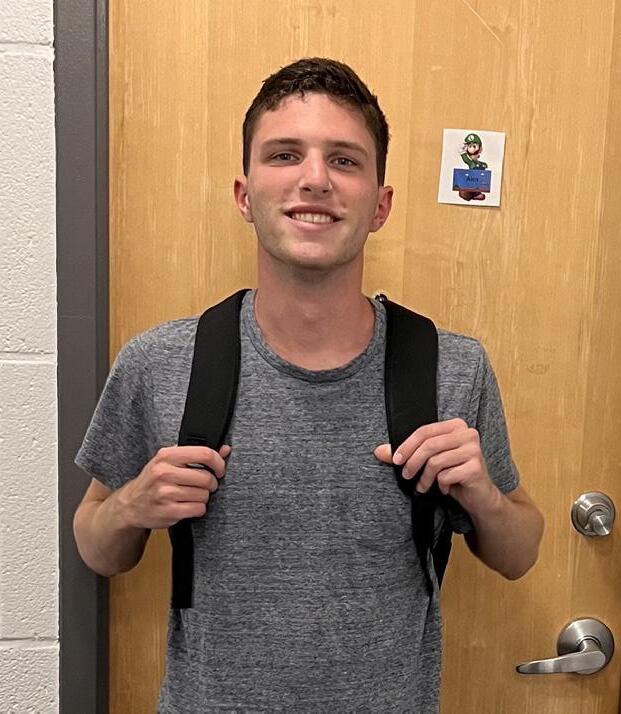
Brooks ’23
“In a beautiful way, college feels like a great limbo between childhood and adulthood — I’m only just starting to think about the big scary career questions, but I’m also enjoying living on my own, getting to try new things, and building new friendships. I’ve loved meeting people from all over the country, although adjusting to a new environment has really highlighted just how much personal attention and community there was at Fieldston. One of my favorite experiences in my first year here was a class called The Undead and Cultural Memory, which explored how different cultures memorialize death. It was so eclectic and esoteric in a way that I wouldn’t have expected — and it definitely reminded me of Fieldston.

McGarvey
“My first year in college was awesome. I found people I felt connected to who helped me grow into myself. I’ve become so much more independent and open-minded since coming to college and have already tried so many new things I never expected to. My time at Fieldston definitely made me an excellent judge of character, which has served me well when navigating the hundreds of new people, which can be both exciting and overwhelming. That doesn’t mean it was without its challenges, of course — navigating the first year of new classes and new friendships is full of ebbs and flows. Let it surprise you!
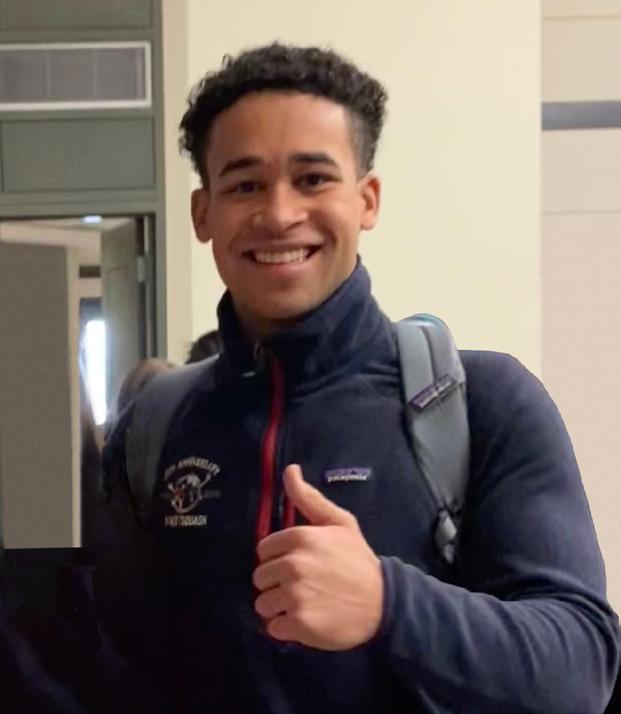
“IkeThe biggest surprise so far has been a pretty positive one — there’s a lot of freedom and free time. That means you have to be pretty self-dependent and responsible, which the teachers at Fieldston definitely prepared me for. There are also a lot of possibilities to explore and opportunities to be the person you want to be, whatever that may mean. I’ve really appreciated the diversity that comes from people being from all different areas of the country and the world. In my second semester, I really enjoyed an engineering class with handson labs, which was reminiscent of classes at ECFS. We got to directly explore what we were learning, instead of just learning concepts in a classroom. My first year went by very quickly, and I’m not taking it for granted. To the students at Fieldston, and especially those who are about to head off to college, make the most of it and really realize how much fun you’re having.
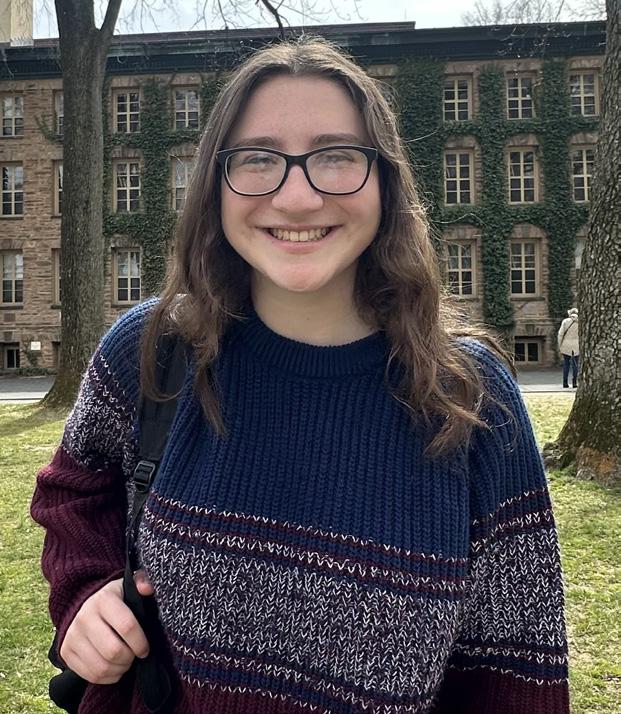
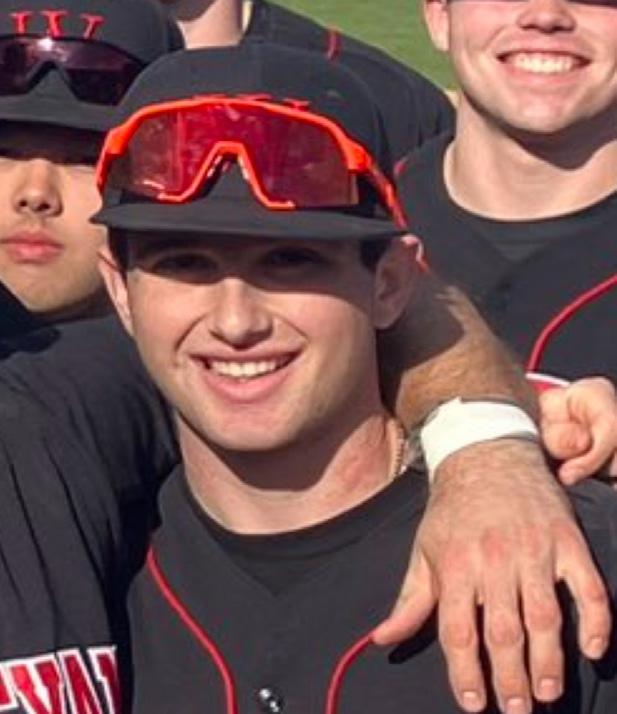
“My first year of college was full of new experiences and people. I joined a comedy group and wrote sketches (some of which were even funny) and took classes on human rights, musical theater composition, and robots in human ecology. The Fieldston ethos of ethics is still very much with me. In my classes this past semester, I thought about moral obligations under international law and about how to mobilize robots for social good. What remains most important from my time at Fieldston, though, are my connections. It’s trite but it’s true: It’s the people that make the place. More than anything else in high school, my friends and mentors made my experience so special. I expect the same to be true at college. I am grateful to be forming new connections at Princeton while continuing my treasured friendships from Fieldston.
“It feels like just yesterday that I was making my speech at Commencement. I tried to take a lot of mental pictures and really understand how special that moment was — I didn’t want to miss anything, as it was such a sacred time for me. I went to ECFS for 14 years, so the bonds I had there were like family. Finding friends as close as the ones I had at Fieldston will take time, but I really wanted to make a variety of friends from different areas of the college. I’m on the baseball team, but I also worked as the student assistant on the football team and went to a lot of events hosted by nonathletes. To the future Fieldston alumni, my advice is that you carry the empathy you had at Fieldston with you. People will appreciate it.
Take a moment for some quality time with your family! Have fun searching for the ECFS-themed words hidden in the word search and filling in our student-designed coloring page.
Can you find all the hidden ECFS-themed words in the grid below?
Our alumni are doing amazing things! From politics to music to law, there are endless possibilities for each and every ECFS graduate.
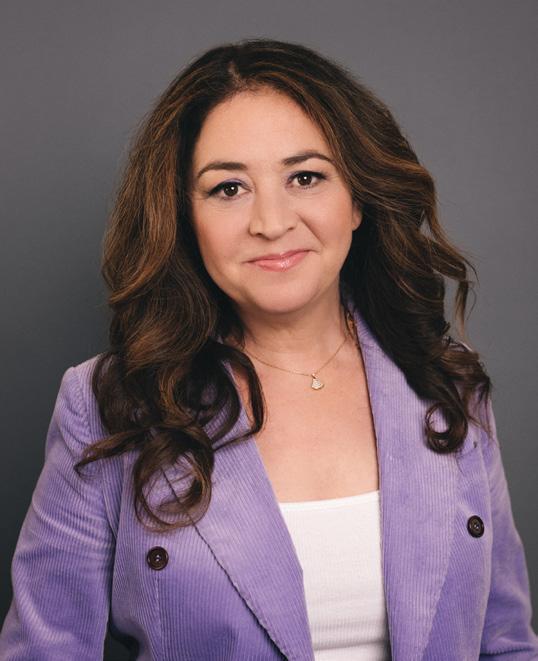
Liz Garbus ’88
“ I made my first documentary about my last week of my senior year at Fieldston — it was the first step on my journey to becoming a filmmaker.
Film director, co-founder of Story Syndicate
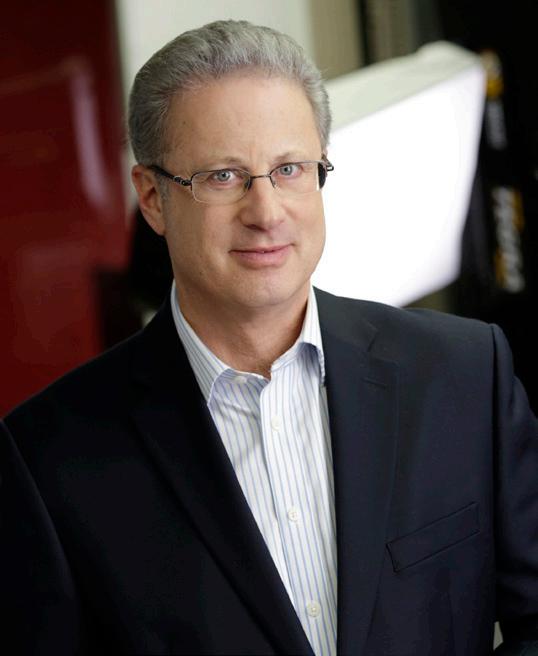
Tim Minton ’75
“ECFS doesn’t just provide tools to do anything — it also prepares you to lead others in doing anything.
Communications Director, Metropolitan Transit Authority, former television news correspondent

Keith L.T. Wright ’73
Director of Strategic Planning, Davidoff Hutcher & Citron LLP; former New York State Representative “The foundation I got from Fieldston helped define the rest of my life. The School’s commitment to public service left an indelible imprint upon me.

Lee Kreiner ’01
“Fieldston taught me to always raise my hand, no matter what. If you have a question, it should be asked.
Architect/Design Manager, Gensler
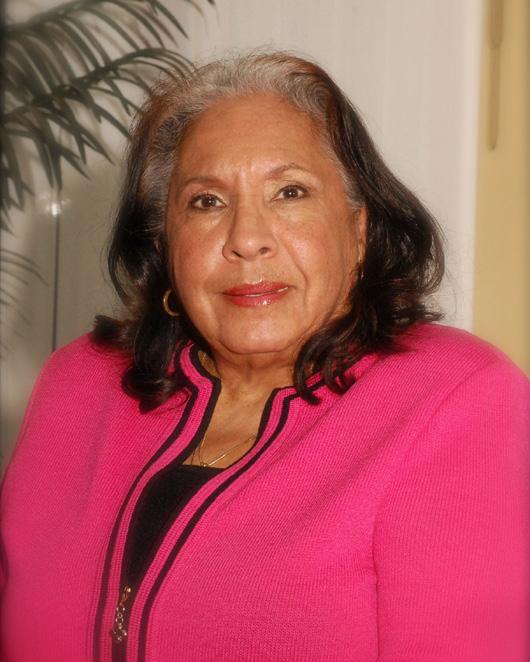
Thelma Baxter ’64
“ECFS changed my life by instilling a lifelong love of learning and an unwavering belief in myself.
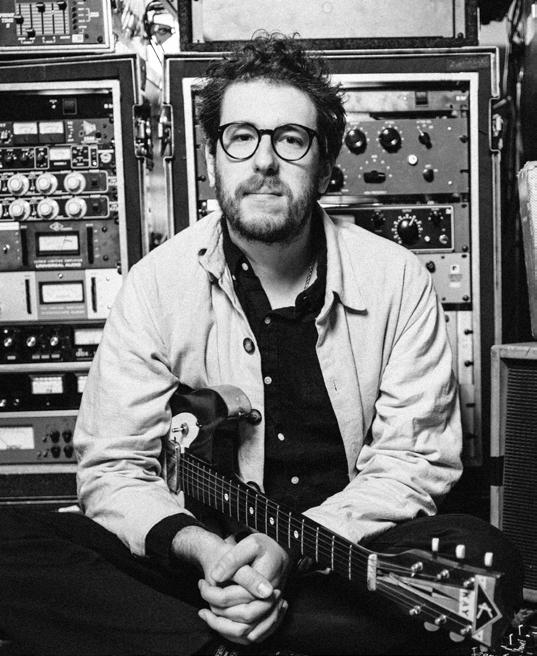
Dan Knobler ’07
“The incredible teachers at Fieldston encouraged me to pursue my passions and emphasized the beauty of seeing the world around me from many different perspectives.
Retired Superintendent of Harlem Schools
Record producer, guitarist
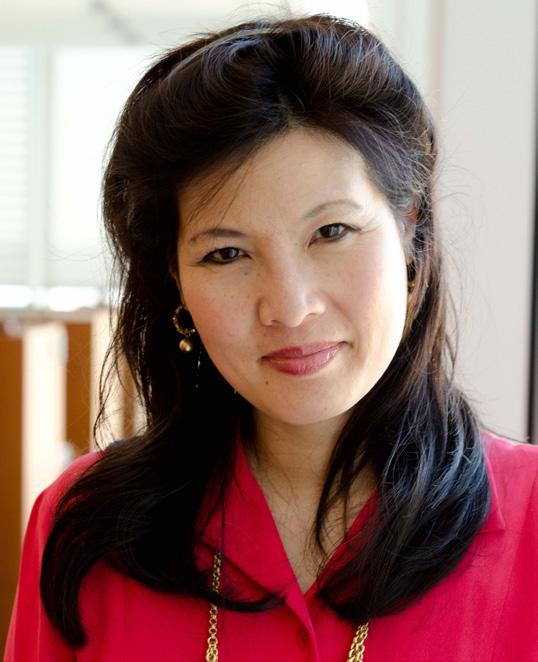
Sheryl WuDunn ’77
“Fieldston teachers inspired me to learn, and they deserve a standing ovation!

Jasmine Paulino ’14
“My time at ECFS taught me to be curious in the classroom and the world around me. That curiosity has made me a better employee, a better community member, and a better friend.
Co-founder of Kristof farms, former journalist
Data Scientist, Spotify
ECFS honors and remembers the alumni we lost.
Muriel Sanders Blankfort ’36
Elizabeth Schwab Fuld ’37
Alice Kahn Ladas ’39
Ruth Rosenblatt Norek ’41
Simon Ottenberg ’41
Ruth Rosenblatt Norek ’41
Samuel Florman ’42
Walt Glickenhaus ’42
Michael Wertheimer ’44
Myra Silvers Ilson ’45
Willys Silvers ’46
Mary Davis Barber ’47
Robert Pack ’47
Bertram Cohen ’48
John Kauffmann ’48
Jane Brill Kugelman ’48
Bernard Goldstein ’49
Peggy Crystal Michelman ’50
Nancy Nahon ’50
Linda Olenik Pastan ’50
Richard Soffer ’50
Susan Nemeroff Cohen ’51
Richard Ravitch ’51
Joel Hasen ’52
George Glassman ’53
Elliot Goldman ’53
Betty Rollin Edwards ’53
Stephen Fisher ’54
Elizabeth Rabkin Taller ’54
Stephen Joseph ’55
John Meyer ’55
Gail Emerson ’57
Michael Rosenberg ’57
Kenneth Walker ’58
This list represents all in memoriam submissions between December 2022 and April 2024. If classmates are missing, please email alumni@ecfs.org so we may honor them.
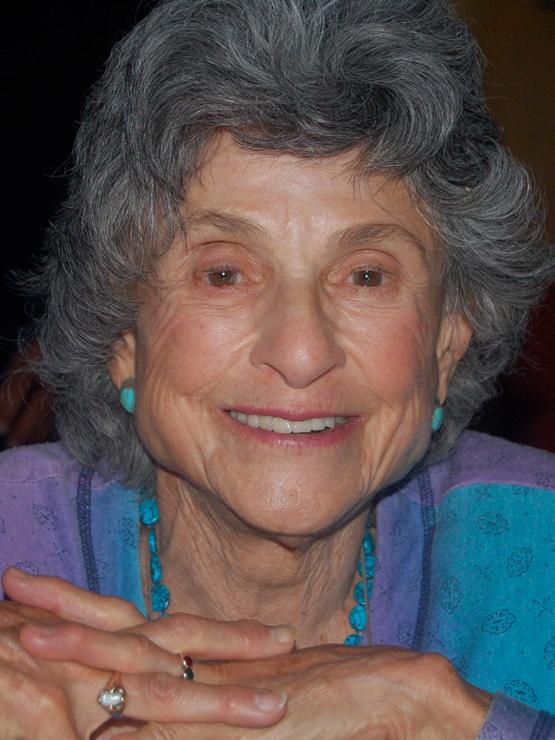
Patricia Kimball Loewenberg ’59
Kalman Radin ’59
Michael Kogan ’60
Kathryn Rosenbaum Kaminsky ’60
Robert Abrams ’61
Edward Liebowitz ’61
Edward Pressman ’61
Michael Rein ’61
Tony Blecher ’63
Peter Scharf ’63
Paul Goldmuntz ’64
Patricia Kramon Pincus ’67
Paul Rosenfield ’73
Dale Eisenberg Hesdorffer ’76
Nina Bunche Pierce ’80
Paul LaFarge ’88
Niv Sparkes ’20
Alice Ladas ’39 passed away on July 29, 2023. After graduating from ECFS, Alice attended Smith College and earned her doctorate in education from Teachers College at Columbia University. Alice’s life work centered on breastfeeding, birth, and sex education. She wrote her doctoral dissertation on breastfeeding, taught the first Lamaze class in the United States, and wrote the New York Times bestseller, “The G Spot and Other Discoveries about Human Sexuality,” which sold over 1 million copies.
Alice was connected to some of ECFS’s earliest history. Her mother was one of the first members of the Ethical Culture Society; Alice was a member of the Society since her graduation from the School, and she worked with Algernon Black, Class of 1919, on the development of the Encampment for Citizenship. In the 84 years following her graduation, Alice stayed engaged with ECFS and was our oldest actively engaged alumn, serving as the representative of the Class of 1939 and submitting updates for Class Notes.
Alice is predeceased by her husband, Harold Ladas, and is survived by her daughters, Robin Janis ’77 and Pamela Ladas ’81 and three grandchildren.
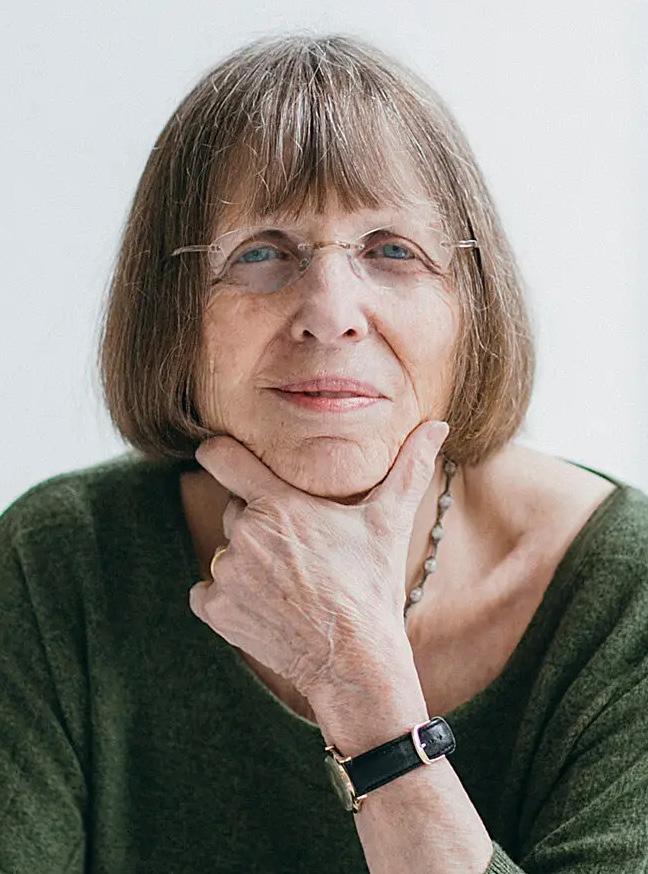
Linda Olenik Pastan ’50 passed away on January 30, 2023. After graduating from ECFS, Linda attended Radcliffe College, where, as a student, she won a poetry competition sponsored by Mademoiselle magazine — a competition in which Sylvia Plath placed second. Later, she earned master’s degrees in library science from Simmons University and in English and American Literature from Brandeis University.
Linda was an accomplished poet who published 15 volumes of poetry, beginning with “A Perfect Circle of Sun” in 1971. She explored a wide range of subjects within her poetry, from history to dreams to memory, and served as Maryland’s poet laureate from 1991 to 1994. While in the role, she embraced sharing poetry with people who typically had no connection to poems or poets and demystifying the sometimes-intimidating world of poetry. Her work received accolades and broad recognition, including being a finalist for the National Book Award twice and winning the Ruth Lilly Poetry Prize, considered one of the most prestigious awards in poetry.
Linda is survived by her husband, Ira; sons Stephen and Peter; daughter Rachel; seven grandchildren; and a great-granddaughter.
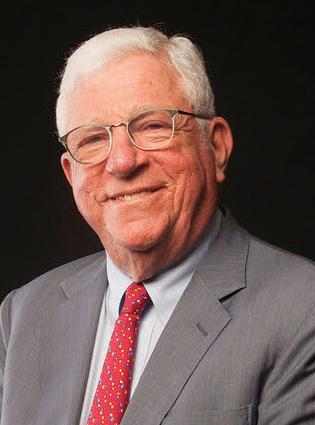
Richard “Dick” Ravitch ’51 passed away on June 25, 2023. After graduating from ECFS, Dick studied American history at Columbia College and received a J.S. from Yale University School of Law. After briefly serving in the U.S. Army, he went on to have a long and impactful career in politics, tackling some of the most complex challenges facing New York City in the ’60s and ’70s.
While he never served in an elected office, Dick’s work in real estate development and government had a powerful impact on the city. In 1975, as its chairman, he was instrumental in pulling the New York State Urban Development Corporation back from the brink of financial insolvency; later he was being tapped to rejuvenate the Metropolitan Transportation Authority in the ’80s.
His shrewd fiscal judgment, belief in the power of government to address social ills, and passion for the issues he cared about led to him being called on as a master problem solver by governors and mayors, and in 2011 he served as the lieutenant governor of New York.
Dick is predeceased by his son, Steven, and survived by his wife, Kathleen M. Doyle; children Joseph and Michael; stepchildren Liz Doyle Carey, Carrie Doyle, and Laura Doyle; and 13 grandchildren, including Aidan Ravitch ’13.
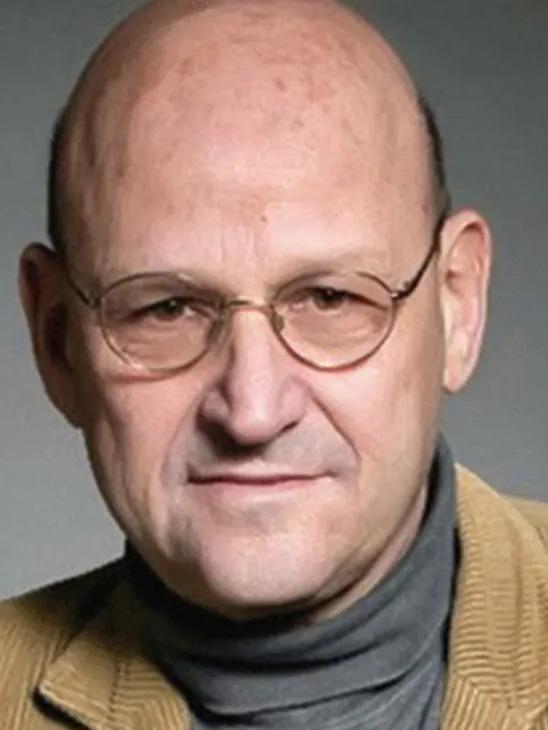
Edward Pressman ’61 passed away on January 17, 2023. After graduating from ECFS, Edward studied philosophy at Stanford University and the London School of Economics. As the son of Lynn and Jack Pressman, founders of the Pressman Toy Corporation, Ed was expected to go into the family business, but while at Stanford University, he had a roommate whose father was a film director. His interest in working in movies was piqued, but it wasn’t until he met a fellow American at the London School of Economics who shared a love of cinema that he had the chance to explore the budding interest. They jointly produced the short film “Girl” in 1967, which set off a lifelong career in the film industry.
Over the next 56 years, he was a producer or executive producer on almost 100 movies, including “American Psycho,” “Party Monster,” “Badlands,” and “Conan the Barbarian.” Edward was beloved for his generosity, determination, and interest in working with all different genres of movies, from art films to box office hits.
Edward is survived by his wife, Annie; son, Sam; sister, Ann Markelson; brother Jim ’67; and niece Kate Pressman ’14.
Read on to hear personal news, professional accomplishments, and more from your fellow Eagles! Have an update to share? Send it to alumni@ecfs.org
1942
Elaine (Wechsler) Slater ’42 is nearing 100 years old, which she says she finds “impossible to believe,” but says she is lucky to have her eyesight as she does a great deal of reading. She is now living in Canada.
1944
Joan (Feldman) Kron ’44 is now 96 years old and recently moved to Miami to be closer to her son. She’s currently writing a memoir of her life in pop art in the ’60s with Andy Warhol, Roy Lichtenstein, and Robert Indiana.

1945
Stephen Wechsler ’45 is still living in East Berlin, mailing his Berlin Bulletins out to the world, and getting reactions “both angry and laudatory” to his books “A Social Defector: From Harvard to Karl-Marx-Allee” and “Crossing the River.” He has one son who manages a successful art cinema
theater, while the other, a retired journalist, looks after his 95-year-old father. Scattered happily around the world are his three grandchildren. He hopes any others from the Class of 1945 will reach out!
Jack Zimmerman ’49 is still working in his counseling practice that explores the connection between intimate relationships among couples. He’s considering writing his sixth book and shares that his gratitude for the years he spent at ECFS has grown over the decades. “I still remember what it felt like to be mentored by wonders like Bernie Worthman and Miss Murphy!”
Andrew Courtney ’54 had a reception for his photography exhibit, “Working Hands,” which drew 180 guests to the Ossining Public Library Gallery. Guests enjoyed the exhibit, film, gallery talk, and Paraguayan harp performance.
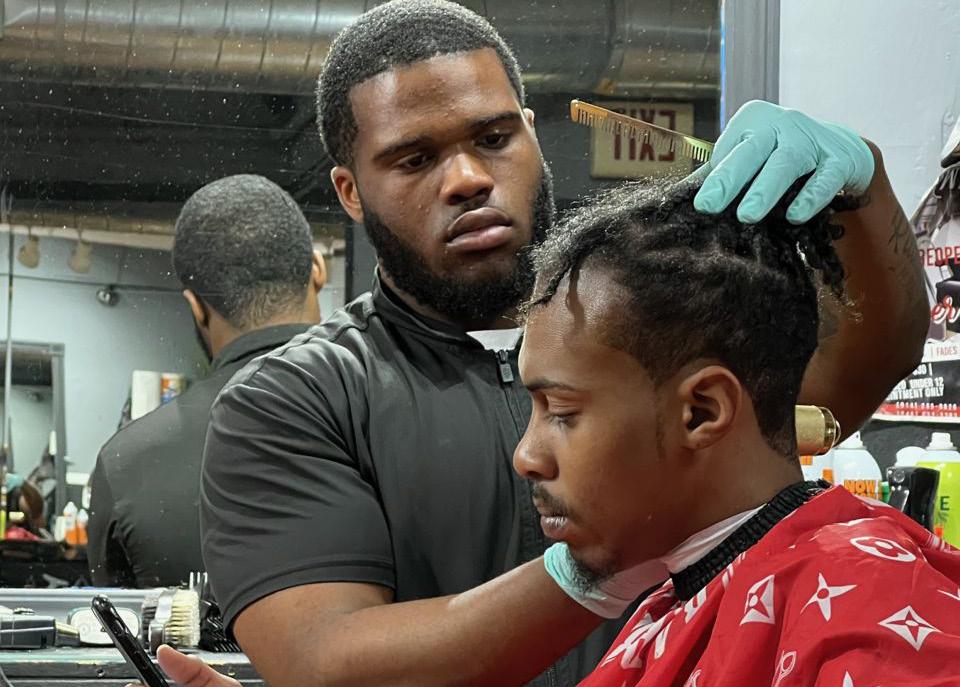
William (Bill) Cramer ’55, Professor of Biological Sciences at Purdue University, reports that his lab has been studying the mechanisms through which energy from the sun is used for the formation and growth of plants. Most recently, they were able to define a new pathway through which photosynthesis occurs by studying a particular bacteria — blue-green algae.
Carl Leubsdorf ’55 and his wife, bestselling author and USA Today Washington Bureau Chief Susan Page, sold their Georgetown home of 38 years and moved to an apartment — a move that was prompted, Carl says, by his aging knees. Susan’s latest book, “The Rulebreaker: The Life and Times of Barbara Walters,” came out in April.
Gail Lichtenstein Edelman ’55 shares that her husband of 55 years, Martin, passed away in August. Fortunately, the family had gathered for a lovely birthday celebration for him just six days before his death.
Liz (Tish) Rosen Reiniger ’55 continues a life of music by playing chamber music with friends, playing the piano, and singing in the choir of her local senior center in Vancouver. She enjoys sailing in the summer.
Mickie Schimmel Winkler ’55 calls herself an irreverent writer of short humor who has recently completed her second book. She’s currently “on the prowl” for a publisher.
Robert (Rob) Socolow ’55, Professor Emeritus at Princeton University, received the John Scott Award in Philadelphia in November, the oldest prize for science in the United States. Rob was recognized for pioneering new concepts and creating new fields in energy and the environment, specifically addressing energy efficiency, carbon capture and sequestration, and climate stabilization strategies.
Lucy Soffer Blankstein ’55 was the assistant curator and an exhibitor at a show “Ephrasis: Art and Poetry,” held in the fall at the Katzan Rotunda Gallery at the American University in Washington, D.C.
Linda Pruzan ’57 reports that a cohort of classmates from the Class of 1957 continues to gather, with two recent gatherings hosted by Linda Greenberg Raskin ’57 and Daniel Siff ’57. Linda’s grandchildren Lucy ’17, Charlie ’19, and Ben ’13 have returned to New York City, and her granddaughter Alison ’11 started her residency at Langone Hospital, got married, and had a baby this spring, making Robert Pruzan ’81 a grandfather and Linda a great-grandmother!
Constance (Cramer) Porteous ’58 was sorry to miss the Class of 1958’s 65th Reunion but loved seeing the pictures of those who attended! Last summer, she traveled from her Chicago home to visit the East Coast with her daughter and son-in-law, including trips to Washington, D.C.; New Jersey; and Tarrytown, New York. She’s taking piano lessons and keeping up her French and Spanish skills, and stays she in touch with classmates Marion Gaines DeCoudreaux ’58 and Stephen Schlesinger ’58
Ruth Neubauer ’59 recently published her first book, “Words There Are.”
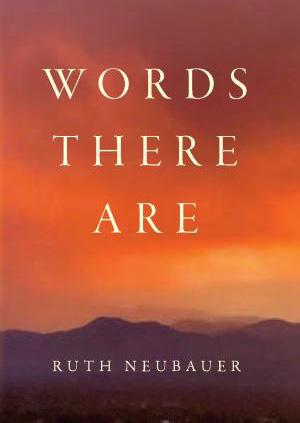
Jean Senegas ’59 finds it hard to believe she’s “suddenly” 82 years old! She enjoys taking in the wildlife from her backyard in Ithaca, New York, including deer, rabbits, chipmunks, and skunks.
David Kann ’60 had his book of poetry, “Ismael on the Farm,” published this spring by Fernwood Press.
Carol (Lipson) Wilson ’60 has embarked on a new life after a milestone birthday and losing her partner of over 50 years. She is saying “yes” to things she’s never done before, volunteering, making lots of new friends, and writing.
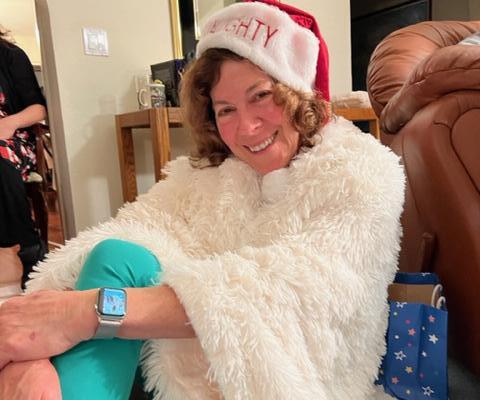
Margie (Bessin) Peppercorn ’62 feels lucky for her good health, allowing her to fully enjoy retirement with her husband, children, and grandchildren. She keeps busy reading, hiking, playing golf, and doing animal rights work. She hopes to continue to have good health and strength so she can continue making a difference in animal, human, and environmental rights.
John J. Herman ’62 has two books of poetry out: “White Summer,” published in 2020, and “Adam’s Dream,” published in April 2024.
Nicholas Meyer ’64 will have his sixth Sherlock Holmes novel released in August, and the seventh is already in the works. He was recently honored by the Future of Life Institute for directing the 1983 television film “The Day After,” which detailed the fallout of a fictional nuclear war between the United States and the Soviet Union.
Bill Rapaport ’64 has had his 10-year retirement project, “Philosophy of Computer Science: An Introduction to the Issues and the Literature,” published by Wiley.
Ted Roth ’64 shares that he had a solo exhibition at the Whittemore Library in Naugatuck, Connecticut, in November. The exhibition included materials from a recent self-published book, “Blocks of Stone.”
Shelly Sender ’64 is enjoying semiretired life in Ontario. She works part time as a family physician; recently traveled to visit Tama Starr ’64 on Maui; and enjoys time with her book, writing, and hiking groups. Her son, Michael, is a professor of neurosurgery at the University of Pennsylvania Medical School, and her daughter, Lisa, is an infectious disease doctor in Montreal. She has four grandsons.
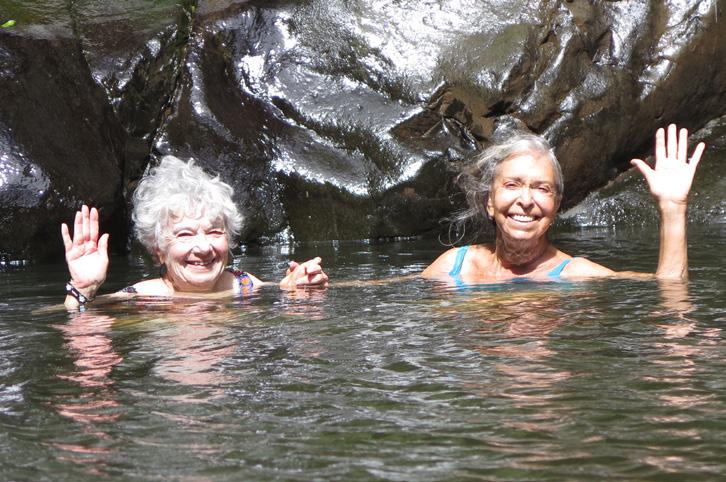
Tama Starr ’64 lives on Maui, splitting time between her rural, off-the-grid farm and a beachside condo in town. She feels fortunate to enjoy good health, glorious scenery, and challenging creative projects. “Aloha to all,” she says.
Claudia Gorbman ’65 has continued to translate books, including six for Columbia University Press, after her retirement from academia in 2015. She and her wife, Pam Keeley, are tireless activists for the Earth and equal rights. They live in Poulsbo, Washington.
John Levey ’65 has published “Right for the Role,” a memoir of his 35-year career as a casting director for such iconic shows as “ER” and “The West Wing.”
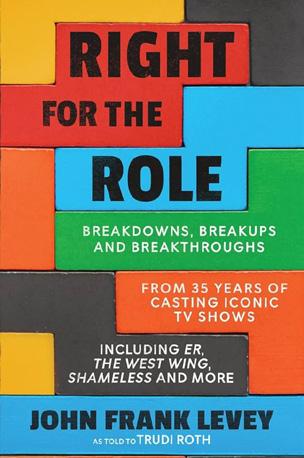
Douglas Lyons ’65 retired as a public defender at the end of 2022 and now spends a lot of time writing. He and his wife, Nancy, enjoy taking cruises and were excited to welcome their fourth grandchild in February.
Mal (Malcolm) Blier ’66 had dinner with Jamie Delson ’66 in February; they hadn’t seen each other in at least 40 years. Later that month, while on a flight, he realized he was sitting next to Susan Jacoby ’66 — and they talked nonstop from takeoff to landing. “Best seatmate ever,” he says. Mal made his New York City music debut alongside his brother Steven Blier ’68 at the New York Festival of Song Gala, with Steven on piano and Mal on guitar. Last fall, he celebrated his son Zack’s recent promotion to Metro DC Sergeant at dinner with Jane Rosan ’66 and Alan Rosan ’66, and in February he visited with Rob Gordon ’66 in California.

Jim Brudney ’67 is teaching at Fordham University School of Law. He enjoys interacting with students and doing research in various areas. Jim enjoys regular visits and meals with Bob Bearnot ’67
He says, “I want to give a shoutout to Gigi (Goldin) Lincoln ’67, whose retirement after 50 years as a high school librarian in Battle Creek, Michigan, was suitably recognized in the local press and by the legions of students she has guided and educated. Congratulations, Gigi, on your fabulous career!”
Candice Feiring ’67 is collaborating with media artists and AI developers to create an innovative relationship education program based on her romantic relationship research. HeartSmarts is committed to creating materials that resonate with people from diverse relationship orientations and ethnicities through skill instruction and rehearsal.
Joshua M. Greene ’67 co-wrote a middlegrade memoir, “Signs of Survival,” with Renee Hartman. The book tells the true story of Renee and her deaf younger sister in 1940s Czechoslovakia, where they were deported to the concentration camp Bergen-Belsen and used sign language to survive “history’s darkest hour.” A miniseries about the book has been co-produced by Steven Spielberg’s Amblin TV, Scholastic Entertainment, and Marlee Matlin’s Solo One Productions.

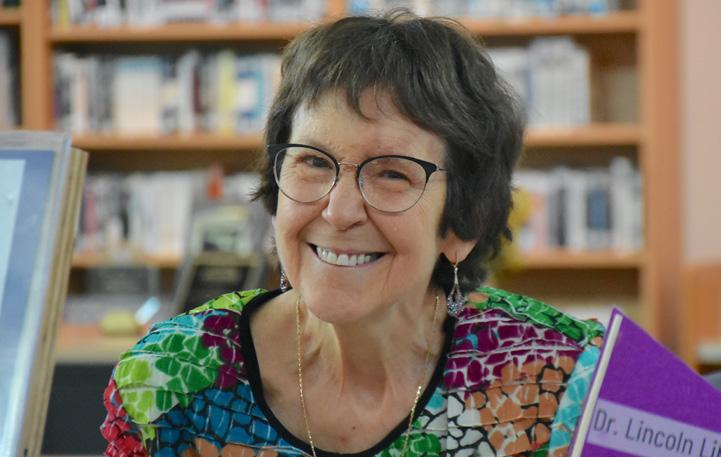
Gigi (Goldin) Lincoln ’67
Ira Resnick ’67 and Bill Horwitz ’67 are excited to announce the release of their latest LP, “Still Cantamus After All These Years” — 57 years after the last time they recorded any music together! Dedicated to John Scott ’65, George Martens, and Gil Scott-Heron ’67, as well as original members of the band Fred Baron ’67 and David Appleby ’68
Shira (SJ) Rosan ’67 had her 19th book published in December 2023, “The Mayors of New York.” So far, Booklist, Library Journal, and Publishers Weekly have shared positive reviews.
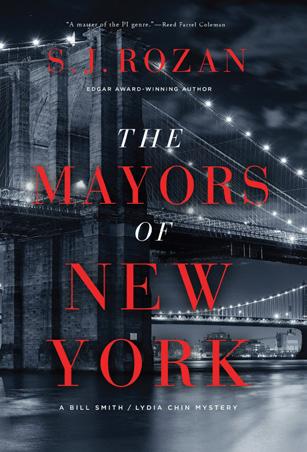
Gigi (Goldin) Lincoln ’67 retired in June 2023 after serving for 50 years as a high school librarian in Battle Creek, Michigan. She was proud to have been invited to present “Reflections on a Successful Semicentennial of Collaborative Transformational Learning in the Library” at the annual American Library Association Conference. In retirement, she remains involved in the educational field and continues to support organizations and projects to which she has been committed throughout her professional career.
Katrin Belenky Peck ’68 was a panelist in October 2023 at the 100 Years of Women at Richmond Law event at the University of Richmond School of Law, where she received her J.D. in 1976. Katrin had a 27year career in computer and intellectual property law as in-house counsel at Olivetti and Logica and in law department management positions at two large money center banks, after which she established a fundraising and strategic planning firm for arts and education nonprofits.
Jen Silverman ’68 is the founder of the Dorchester Food Co-op. After 11 years of organizing, they opened the doors to a 6,000-square-foot community- and workerowned grocery store in October 2023. With close to 2,000 household member-owners, the store celebrates culture, promotes community health, and strengthens the local food system. Jen invites anyone in Boston to visit!
Murzy Jhabvala ’69 is in his 50th year as a semiconductor device engineer at the NASA Goddard Space Flight Center in Maryland. He’s contributed to many NASA missions, including the Cosmic Background Explorer, which confirmed the big bang theory; the Hubble Space Telescope; the New Horizons mission to Pluto; the James Webb Space Telescope; and the recent Euclid mission. His work has included developing new integrated circuits, infrared detectors, and microelectronic devices. He lives in Maryland with his wife, Christine, and their cats.
Jon Kramer ’69 has semiretired after 50+ years working in marketing and advertising. He has started a consulting company, JMK Solutions, to help smaller companies compete in an increasingly complex business environment. Recent clients include companies pioneering work in AI. Jon and his wife, Amy, enjoyed escaping the cold New England weather by spending the winter in Wellington, Florida.
Douglas Lowenstein ’69 has had a career in journalism, politics, communications, and more. He has recently been consulting on health and disease research and is especially proud to have helped secure FDA approval for the first immune therapy for T1D, a disease his youngest daughter has lived with for 20+ years.
Peter Pomeranze ’71 is the Executive Director of Kohala Cares, a nonprofit group that provides food assistance on the Big Island of Hawaii. After closing his successful restaurant due to the COVID-19 pandemic, he says that pivoting into giving back to the community has left him feeling the most at home and comfortable he’s ever felt.
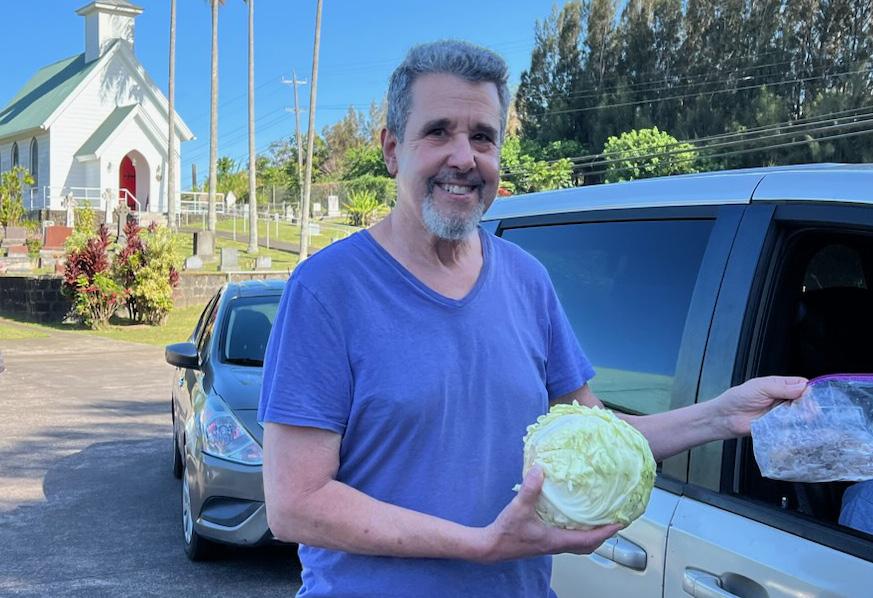
Jon Strong ’72 is heading into his third year as Chief Technology Officer at Harvard Business School. There, he leads teams tackling topics like cloud adoption, enterprise architecture, automation, AI in enterprise IT, and more.
Warren Leight ’73 was honored at the 24 Hour Plays on Broadway event in October for his unwavering commitment to and passion for uplifting performing artists throughout his career. Several classmates were in attendance.
Laura Lemle ’73 founded and chairs the NVLD Project, a nonprofit dedicated to helping people with nonverbal learning disability, a visual-spatial disorder. To accomplish the organization’s primary goal of getting NVLD recognized as a formal disorder, they are collaborating with Columbia University Medical Center and others to open clinics and educate graduate students about the disability.
Josh Nessen ’73 enjoyed a terrific 50th Reunion alongside about 60 classmates from the Class of 1973, then spent the summer traveling to his 45th Amherst College Reunion and enjoying several weeks with his wife, Selina Cohen, on Cape Cod and Martha’s Vineyard. They celebrated the birthday of their daughter Sarah Nessen ’14 and the completion of her third year at University of Pennsylvania Medical School, as well as their daughter Michelle Nessen ’10 being selected as surgical resident and educator of the year at Einstein-Montefiore Hospital, where she just completed her residency.
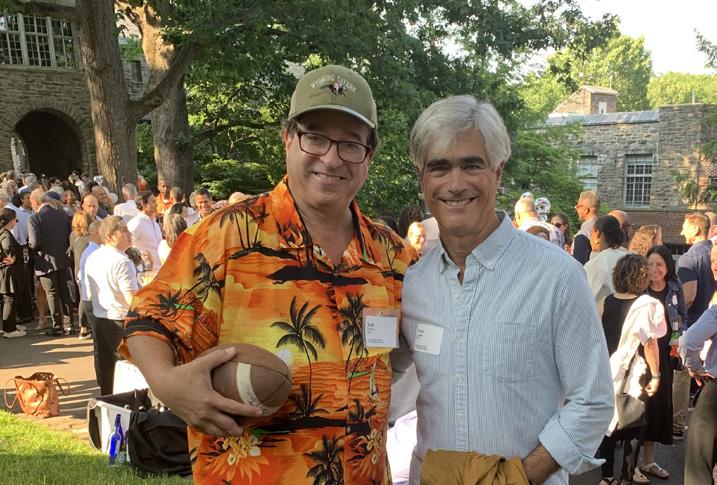
Jonathan Pollock ’74, Branch Chief for Genetics, Epigenetics, and Developmental Neuroscience at the National Institute on Drug Abuse at NIH, edited a special issue on biomarkers for nicotine and tobacco addiction that appeared in the July edition of the journal Addiction Neuroscience. He recently celebrated his 25th wedding anniversary with his wife, Jean Freedman, and their daughter, Rachel, is in her second year of social work school.
Robyn Roth-Moise ’74 recently gave a talk to the Pan Am Museum about her grandfather Richard Roth Sr. Class of 1923, father Richard Roth Jr. ’52, and great uncle Julian Roth Class of 1921, who designed the Pan Am building. She also live streamed a walking tour about her great-grandfather, Emery Roth, and his commissions on the Upper West Side, including the Saxony and Belleclaire hotels.
Andrew Adler ’75 has been working for the Jewish Federation of Louisville as the Managing Editor of their monthly print newspaper and ongoing digital content.
Alfredo Assad ’75 has remarried and is splitting his time between New York and Istanbul. When not touring antiquities, he is working on investment projects, progressing through his reading list, and advising nonprofits and businesses. He hopes everyone entering “senior citizenry” alongside him is enjoying good health and active lives!
Leslie Carroll ’77 and her husband, Scott Gilman, have returned home to New York City and are happy to reconnect with former classmates! She recently recorded audio for seven of her books: five nonfiction titles about the loves and lives of European royalty and the remaining two novels in her Marie Antoinette historical fiction trilogy written under the pen name Juliet Grey.
Philip Gibbs ’77 recently adopted a dog and celebrated his daughter, Grayce, finishing college and moving to Denver. He reports that he is enjoying retirement. “The longer I am away from Fieldston, the more I appreciate the School,” he says. “It is a wonderful place.”
Gabrielle Hoffman ’77 is still working as Creative Director and Partner in the graphic design and marketing firm she started 35 years ago, Good Design. She just celebrated her 26th wedding anniversary, has two sons in college, and is enjoying life in the woods of Lyme, Connecticut. Earlier this summer, she connected with Valerie Colville Nierenberg ’77, her “oldest and dearest friend,” at a mini reunion along with Karen Wynn ’77 and Erin Martin ’77. She reports that it was a lot of fun and they hope to do it again!
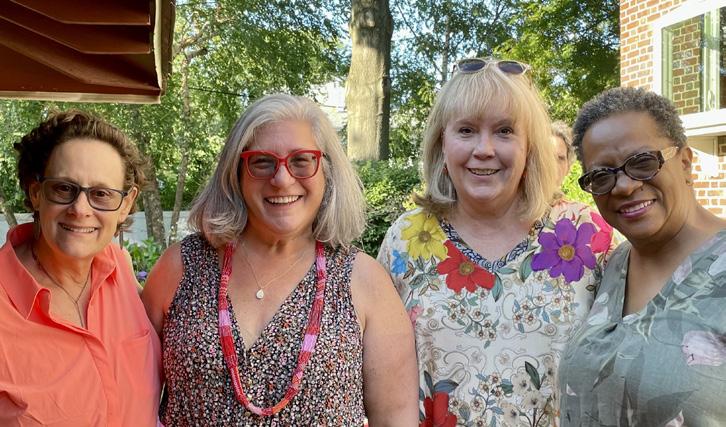
Vernice Miller-Travis ’77 reports that Vice President Kamala Harris was “so nice to me, and so cheerful. It was one of the absolute highlights of my career to have the honor to introduce her.” She shares that Baltimore and cities like it don’t always get visits from vice presidents, and there was thunderous applause when Vice President Harris walked out on stage.

Robert Werthamer ’77 is now the Director of Sustainability at Zyscovich Architects in Miami. He sees the culture of ECFS throughout what he does, from working with team members to make their projects more sustainable to the ability to recognize and respect every level of identity. Robert is in the midst of renovating his 1952 ranch house and has been attending Orangetheory Fitness (where he has run into Jami Brown ’92), which he says brings him back to when Alton “Smitty” Smith ’43 had students run the 440-yard dash around the track. “Not fond memories, I can assure you.”
Joy Graham ’78 is still living in West Palm Beach, Florida, after leaving her role as Medical Director at the North County Surgicenter for a more self-directed schedule doing traveling anesthesia. Last year, she enjoyed driving around various national parks in a small motor home and scuba diving in Fiji.
Congratulations to Paul Pollock ’78, who became a grandfather in October!
Bill Sage ’78 was delighted to see classmates at the 45th Reunion in June. He lives in Fort Worth, Texas, where he is a professor of law, medicine, and government at Texas A&M University and the founding director of a universitywide institute for healthcare access. He spends summers in coastal Maine and on Long Island with his partner, Alexandra Hahn.
Tamar Schwartz ’78 and Meg Luther Lindholm ’78 recently caught up over a meal. They connected over their shared interests in publishing and podcasts — Meg is making her mark in the world of podcasts, while Tamar and her husband are in the book publishing industry.
Mark Stewart ’78 and his wife, Sarah, purchased the 1795 home of Quaker abolitionist William Wright on the Susquehanna River in Columbia, Pennsylvania. Mark is heading a $6 million Underground Railroad Museum project slated to open in 2026.
Julie D. Taylor ’78 was a shortlisted nominee for the Los Angeles Times’ Inspirational Women Leadership Awards in acknowledgment of her noteworthy accomplishments. She says that she considers herself a “design evangelist” and has promoted the importance of architecture and design through her Los Angeles-based public relations and communications firm, Taylor & Company.
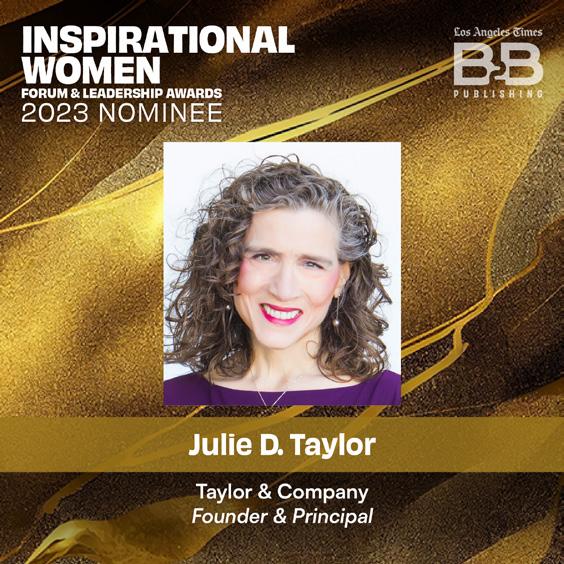
Tamara Weiss ’78 recently published a book, “Vineyard Folk,” about artists and creatives living on Martha’s Vineyard. She is working on the second book in the series, “Hudson Folk,” which will cover similar themes from the Hudson River Valley.
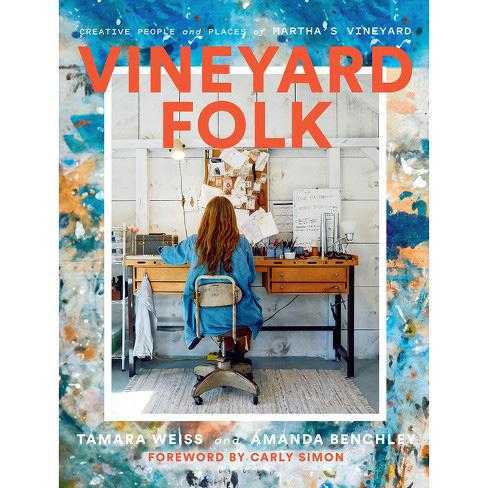
Alice Jankell ’79 is writing and directing theatre around the country! Her newest play, “The Sweet Spot,” ran off-Broadway at 59e59 Theaters in January 2024.
Dennis Hirsch ’80 has spent six years splitting his time between the Ohio State University and Capital University law schools, and was recently given a full-time, tenured appointment as a professor at the OSU College of Law and Department of Computer Science. He continues to direct the OSU program on data and governance, which conducts research on and convenes conversations about the law, policy, ethics, and the management of AI.
Richard Koreto ’80 and his wife, Liz, spent a lovely weekend at Martha’s Vineyard last summer with Maude Brickner ’80 and her husband, Rock. He recently published his seventh mystery novel, “The Turnbull Murders.”
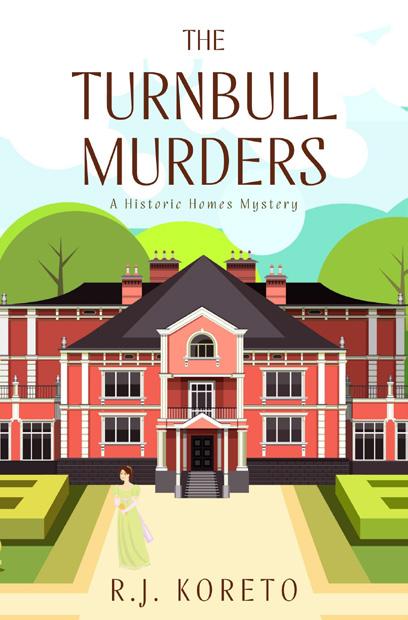
The Class of 1981 reconnected in October at the 8th Street Wine Cellar! To make up for missing their 40th Reunion due to the COVID-19 pandemic, 30 classmates gathered for their mini-reunion and a shared milestone 60th birthday celebration. Four classmates, Amy Ludwig ’81, Elizabeth Levy ’81, Robert Austrian ’81, and Nicole Richardson ’81, even flew in from the West Coast. They share that even after 42 years, the Fieldston bond is so strong that “we are truly a family.”
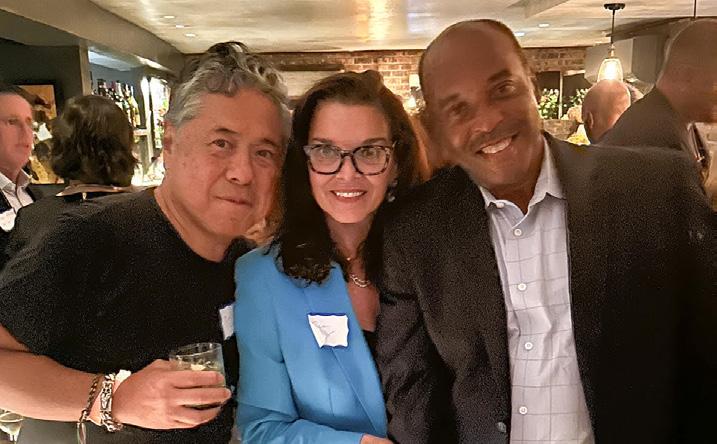
Adam Fran ’81 placed first overall in the Tour de Farm Fondo in September 2023 — his first bicycling race win ever!
Jonathan Skurnik ’82 recently received the nation’s largest documentary grant from the National Endowment for the Humanities for his long-awaited film about the life and times of the great African American actor and activist Canada Lee. In addition to his long career as a filmmaker, Jonathan has been showing his visual art in galleries in Los Angeles.
Rebecca Gratz ’88 is happily living on the spectacular coast of Maine. She is the principal of Deer Isle-Stonington High School, which she says is incredibly rewarding work. Her youngest left for college last fall, and she is redefining her life as an empty nester.
Alysia Reiner ’88 just finished a run of the world premiere of the Pulitzer-nominated play “War Words,” was featured in the second season of “Shining Veil,” and stars in multiple films currently making the festival circuit: “The Feeling That the Time for Doing Something Has Passed,” “Going Places,” and “Ramona at Midlife.”
Jason Rosado ’92 is living in River Edge, New Jersey, with his wife; two daughters; and dog, Stella. He is working at the Bank of New York Mellon as a Senior Vice President and Product Manager, building AI tools for the prevention of fraud. He often gets together with Phil Jenkins ’92, Lenny Gandia ’92, and Freddy Rolon ’92
Douglas Williamson ’92 had the chance to develop and facilitate a session, “Developing Transformative Leadership Capacity,” at the Transformations Conference in Prague last summer.
Rebecca Gordon ’96 hosted a mini Class of 1996 reunion at the bar mitzvah of her son, Toby.
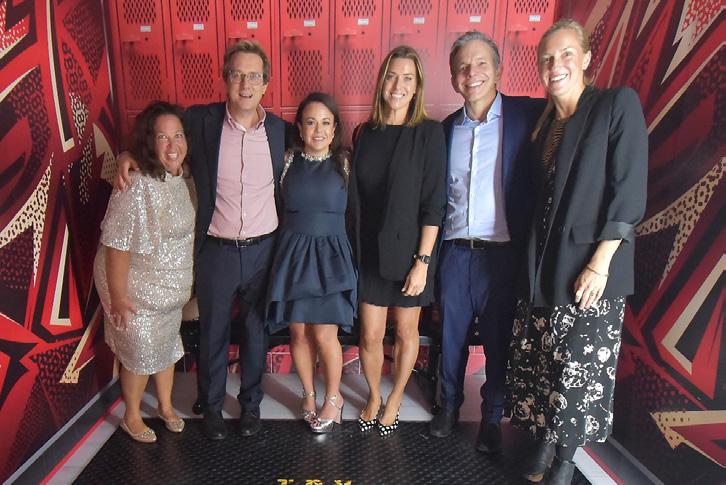
Greg Hanlon ’99 recently co-wrote “The Nigerian Nightmare” with Christian Okoye. The book chronicles the former All-Pro’s improbable journey from civil war-torn Nigeria to NFL stardom.
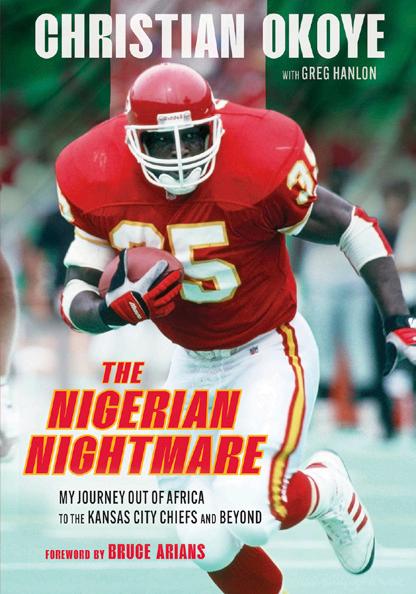
Flannery Houston ’99 is the Director of Programs with Rise, a nonprofit helping everyday people pass their first law. She leads the team focused on passing the rights included within the federal Sexual Assault Survivors Bill of Rights in every state so that survivors across the country have access to the same rights. She has also been the Executive Producer of Rise’s annual New York Fashion Week Survivor Fashion Show for the past three years, where students and celebrity allies walk the runway to take back the phrase “What were you wearing?” She lives in Austin, Texas, with her partner, Stephen, and their dog, Whiskey.
Tracey Weinberg Aftergood ’00 is happily living in Los Angeles with her husband, Branden, and three daughters, Olivia, Margot, and Gemma. She is finishing a feature-length documentary of fashion designer and philanthropist Diane von Furstenberg for Hulu and is about to start a series on the United States Women’s Olympic wrestling team as they prepare for the Paris 2024 Olympic Games.
Cady Susswein ’03 got engaged on a mountaintop in Montana in 2019, got married in 2021 (Mollie Gurian ’03 was in attendance), moved across the country, and welcomed her daughter, Sonora, in January 2023.
Ian Dwinell ’06 and Hollie Brown were married on June 10, 2023, surrounded by Fieldston friends and family!
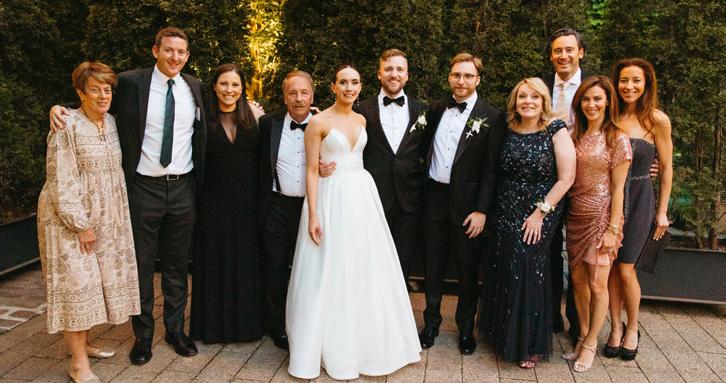
Left to right: Esther Loeb, former Admissions Office employee; Sean Clores, former Fieldston Lower teacher; Stefanie Sporton, Fieldston Lower Physical Education Teacher; John Dwinell, Fieldston Upper Physical Education Teacher and Department Chair of PE and Athletics; Hollie Brown; Ian Dwinell ’06; Matthew Dwinell ’11; Nancy Dwinell, Director of Admissions; Gus Ornstein ’94, P’25, P’27, P’32; Lindsay Ornstein P’25, P’27, P’32; Sarah Danzig Simon ’96
Lance Taubin ’06 and Jenna Taubin welcomed Celine and Holden earlier this year.

Jane Arden ’07 is pleased to announce her engagement! She will marry Kate Clayborne in June. They are currently deep in the thrills and chills of wedding planning, including dyeing the table linens with marigold and buckthorn berries.
Matthew Dwinell ’11 participated in the annual Tunnel to Towers run alongside his father, John Dwinell, Fieldston Upper Physical Education Teacher and Department Chair of PE and Athletics, to honor and remember the heroes lost on September 11.
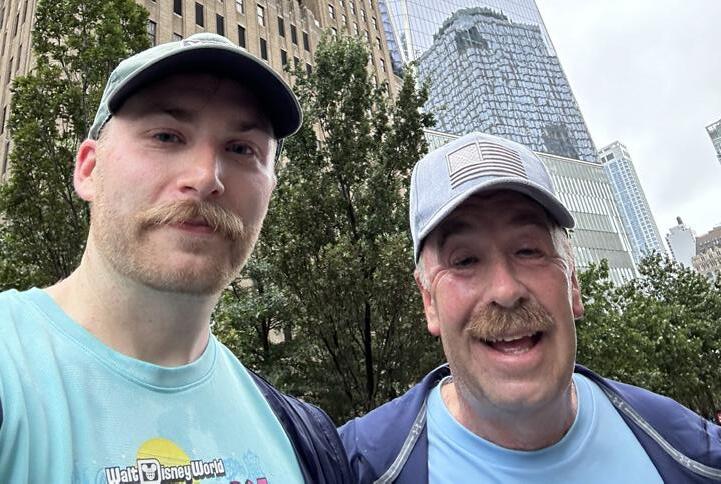
Sam Ravetz ’11 just wrapped up working as the Finance Director for a majoritymaking seat in the Virginia General Assembly. He looks forward to joining another Democratic campaign for the 2024 election season. In the meantime, he enjoyed reconnecting with Jason Lightning ’11, Tai-Chen Bassin ’11, Gordon Earle ’11, Andrew Jaffoni ’11, and the rest of his Fieldston friends!
Allison Flom ’12 created, wrote, and directed the podcast “Erased: The Murder of Elma Sands,” which was featured by Late Night with Seth Meyers, the Today Show, and Teen Vogue and reached #1 in the country on the history podcast charts. The podcast stars fellow ECFS alumni Jason Flom ’79, Keren Abreu ’11, Riley Paul ’12, and Maxwell Whittington-Cooper ’13
Natalie White ’16 was featured on a segment for the Today Show, filmed in the Fieldston Varsity Gym, about her company Moolah Kicks, which makes the first-ever basketball sneaker designed specifically for women.
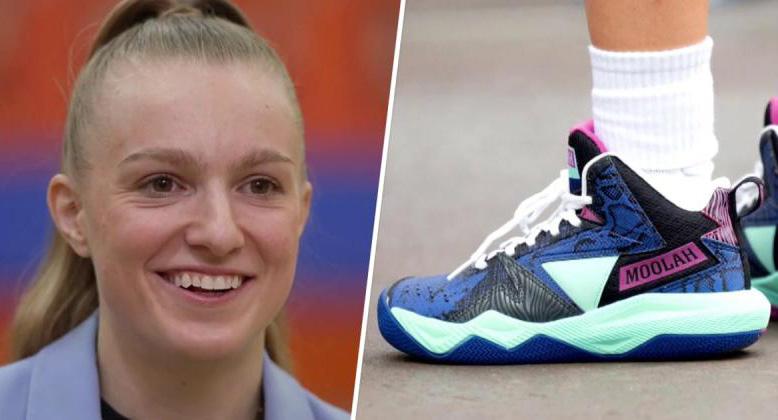
Olivia Belluck ’18 graduated from Boston University and earned her master’s degree in television producing and writing in December 2023.

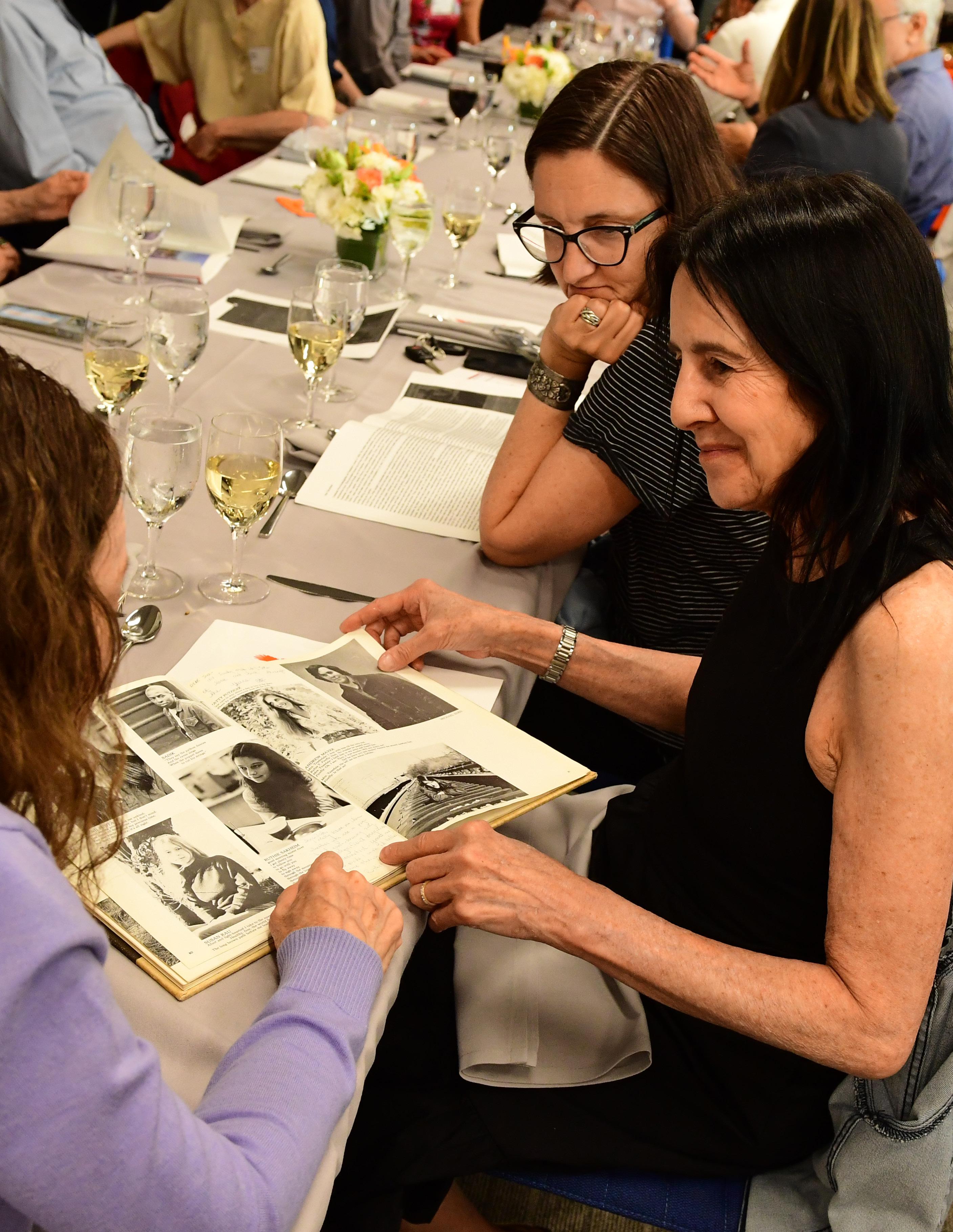
All the stories in this magazine are made possible by the ECFS Orange Fund. The Orange Fund sustains all areas of the School: ethical and innovative academics, inspired visual and performing arts, transformative athletic opportunities, dedicated faculty and staff, and so much more.
By making a gift to ECFS, you’re supporting the 1,700+ students, 400+ faculty and staff, 2,400+ parents and guardians, and 10,000+ alumni who make ECFS unique. Your philanthropic support, at any level, answers the ethical call to support the communities and causes you believe in and helps our School thrive. Are you ready to be a part of making it all happen by supporting the Orange Fund?
Visit www.ecfs.org/support or scan the QR code to give now.
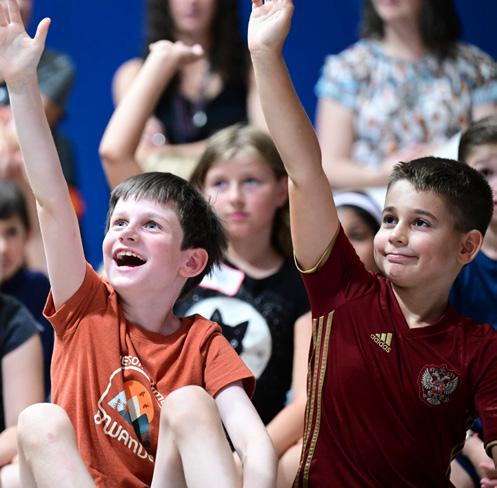
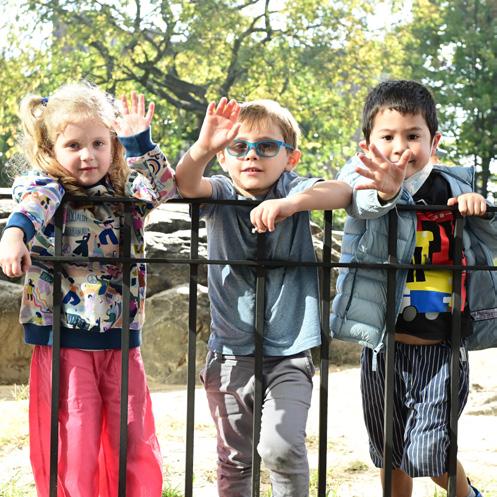
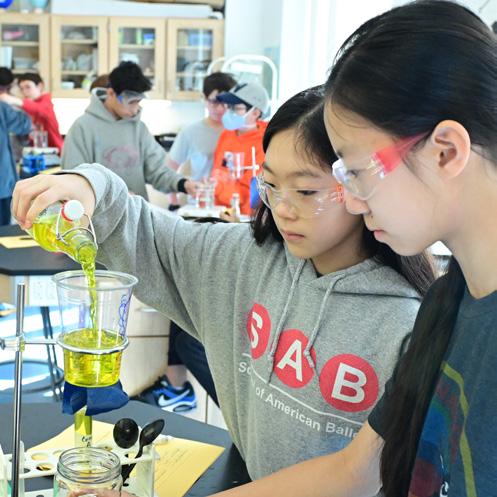

In the 2024–2025 academic year, we will premiere a brand new ECFS Reporter magazine. We’re excited to bring you even more stories from our School in a fun, engaging, and dynamic design! Share your feedback on the ECFS Reporter magazine by scanning the QR code to let us know what you want to see in a new design, and stay tuned for a fresh, new publication next year.

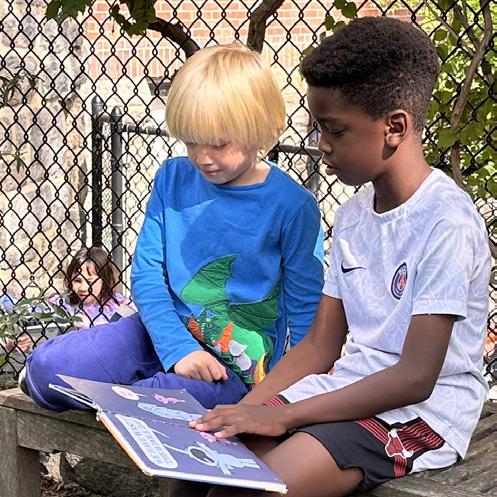
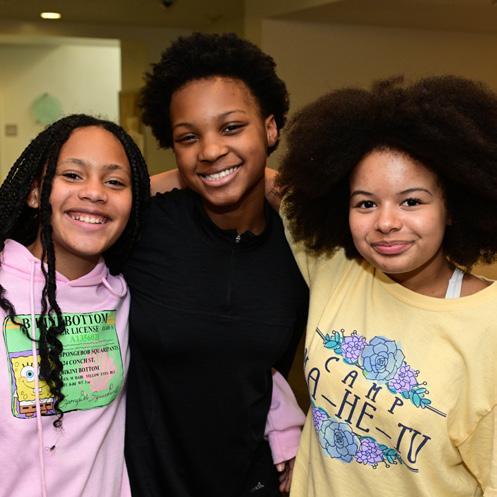
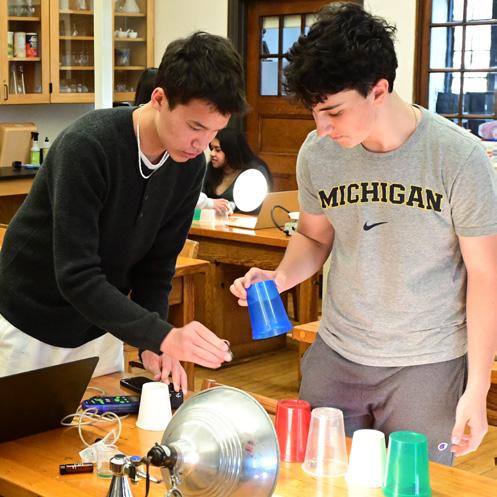
Give back by volunteering with the P+T, Orange Fund, Admissions, and more — it’s an easy and fun way to get more involved with ECFS and get to know your fellow Eagles. Email advancement@ecfs.org or scan the QR code to learn more and get started.
Reach out to communications@ecfs.org with feedback, questions, or ideas.
www.ecfs.org/news
Follow along with stories from the School to stay up to date on all the exciting things happening at ECFS. Browse articles and photo galleries on our website and follow us on social media to see the latest updates. ethical-culture-fieldston-school @ecfs1878 @ecfs1878
Administrative Council
2023–2024
Joe Algrant
Head of School
Kyle Wilkie-Glass P’37
Chief Executive Officer
Jon Alschuler P’28
Principal, Fieldston Middle
Keith Alves
Director of Finance/Controller
Dave Argenzio
Director of Campus Services
Stacey Bobo
Principal, Fieldston Upper
Keeniun Brumskill P’34
Executive Director of Community and Social Impact
Jetty Castro
Director of Human Resources
Rob Cousins, Principal
Ethical Culture
Victoria Daley
Interim Director of Enrollment Management
Jameel Freeman
Director of College Counseling
Marjorie Jean-Paul
Chief Advancement Officer
Les Jonson
Director of Technology
Robert Lundgren
Director of Facilities
Holly Manges Jones P’30
Chief Human Resources Officer and General Counsel
Joe McCauley
Principal, Fieldston Lower
Mica McGriggs
Executive Director of Student Support and Wellness
Gus Ornstein ’94, P’25, P’27, P’32
Director of Athletics
Teddy O’Rourke
Director of Campus Services
Keiko Reid P’35, P’37
Chief Financial Officer
Renée Reid-Nicholson
Director of Communications
Sarah Wendt
Director of Strategic Engagements
2023–2024
Ethan Binder P’32, P’35
Juan Botella
Margot Bridger P’20, P’24
Eunu Chun P’23
Anand Desai P’27
Akin Dorsett ’88
Sharan Gill
Pooja Goyal P’33
Andrew Holm ’01, P’32, P’34
Treasurer
Atif Khawaja P’26, P’29
Secretary
Rob Lewin P’27
Vivian Lin P’28, P’30
Seth Meisel P’24, P’29
Patty Moreno-Fletcher P’17, P’18, P’24
Jo Natauri P’28, P’31, P’32
Kathleen O’Connell
Jon Roure P’24, P’27
Jonathan M. Rozoff P’25
Carline Samson
Dana Sirota P’30, P’32, P’35
Kimberly Smith Spacek ’91, P’27, P’33 Board Chair
Min Young Song P’24, P’26, P’33, P’34
Lance Taubin ’06
Krishna Veeraraghavan P’30, P’31, P’34
Vice-Chair
Rielly Vlassis P’32, P’39
Josh Vlasto ’00, P’32, P’35
Stephanie Wagner P’23, P’24
Jeff Walker P’23, P’24
Vice-Chair
Joe Algrant
Head of School, Ex-Officio
Kyle Wilkie-Glass P’37
Chief Executive Officer, Ex-Officio
Liz Singer
President, Society Board, Ex-Officio
ECFS Communications Office
Molly Alpern
Assistant Director of Advancement Communications
Gina Iacono P’30, P’33
Graphic Design and Website Manager
Emma Johnson
Communications Manager
Kristen Perrone
Communications Manager
Renée Reid-Nicholson
Director of Communications
Contributors
Rose Press, printing
Anne Mottola, photographer
Chris Taggart, photographer
Dana Maxson, photographer
